



Passion for sports?
You must read Sports Business Journal, the most trusted source for sports business news. Be where the industry is every day.








You must read Sports Business Journal, the most trusted source for sports business news. Be where the industry is every day.



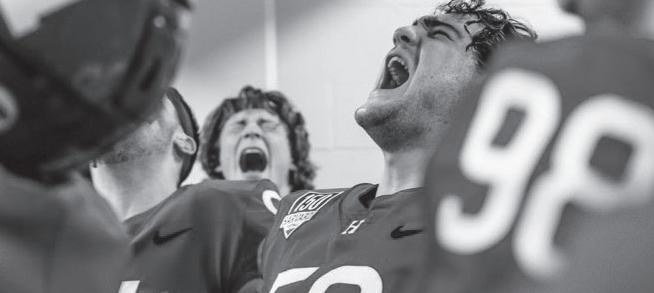
THE SIDELINES IN PHOTOS
22 Photographer Dylan Goodman spotlights the Crimson’s graduating seniors
28 A celebration of the students who work behind the scenes to keep Harvard moving
35 Who is Andrew Aurich? Our co-chair sits down with Harvard football’s new leader
The story of a full-scale team transformation, led by Coach Tjerk van Herwaarden
George Cooper marches to the beat of his own drum — on and off the field
38 Harvard isn’t Hogwarts, but don’t tell the Harvard Horntails, new national champions
SPORTS CHAIRS
Katharine A. Forst ’25
Jack K. Silvers ’25 DESIGN
Laurinne Jamie P. Eugenio ’26
Sami E. Turner ’25
MULTIMEDIA CHAIRS
Julian J. Giordano ’25
Addison Y. Liu ’25
SPORTS DESIGN EDITOR
Nicole M. Hernández Abud ’27
SPORTS PHOTO EDITOR
Dylan J. Goodman ’25
PRESIDENT J. Sellers Hill ’25
MANAGING EDITOR
Miles J. Herszenhorn ’25
BUSINESS MANAGER
TThe soccer star will take her talents to Duke after three stellar seasons in Cambridge
HANNAH BEBAR 42
The many accolades of Harvard’s Olympians, the pride of the Crimson
he 2023-2024 athletic year has been defined by one word: Olympic. Marked by a slew of national championships, Ivy League titles, and individual player honors, Harvard’s 42 Division I teams placed themselves firmly within a niche of excellence this past season. And that elite level of competition will only be heightened as the Crimson is set to be represented by a contingent of athletes at the highest level this summer: the 2024 Paris Olympics. While donning the jersey of their home nations, the athletes will also be defending the Harvard name on the grandest stage in sports. The lessons they learned at Harvard and the accolades garnered while playing for the Crimson are priceless in vaulting them to their positions today. From the field hockey team winning the inaugural Ivy League Championship to the women’s tennis teams cracking the NCAA postseason lineup for the first time in program history, Crimson jerseys have been hung in the rafters this year, and in the process have equipped our athletes with the tact to handle the toughest competitions.
We have had the pleasure of guiding the Sports Board through
an historic and unprecedented year. With eight fencers, five rowers, and one sailor representing the Crimson in Paris, among others, this year represents a unique opportunity for Harvard to demonstrate its athletic prowess. As we look forward to cheering on our peers this summer, it is only fitting that here we honor the achievements of this past year. Through these articles, we detail the triumphs, defeats, and tales of persistence that have come to define the gritty, cerebral brand of athletics particular to our riverside hamlet.
From interviews with the student managers that keep the teams moving forward each day, to a conversation with the first new football coach in over 30 years, we have attempted to paint a picture of what it is that pushes our athletic programs to find success. We hope you come to understand the energy that characterizes the Crimson — the energy we feel on the sidelines, in the stands, and coursing through these pages.
SINCERELY, Katharine A. Forst ’25 | Sports Chair Jack K. Silvers
Matthew M. Doctoroff ’25
ASSOCIATE MANAGING EDITORS
Elias J. Schisgall ’25
Claire Yuan ’25
ASSOCIATE BUSINESS MANAGERS
Mathias Melucci ’26
Meredith W.B. Zielonka ’25
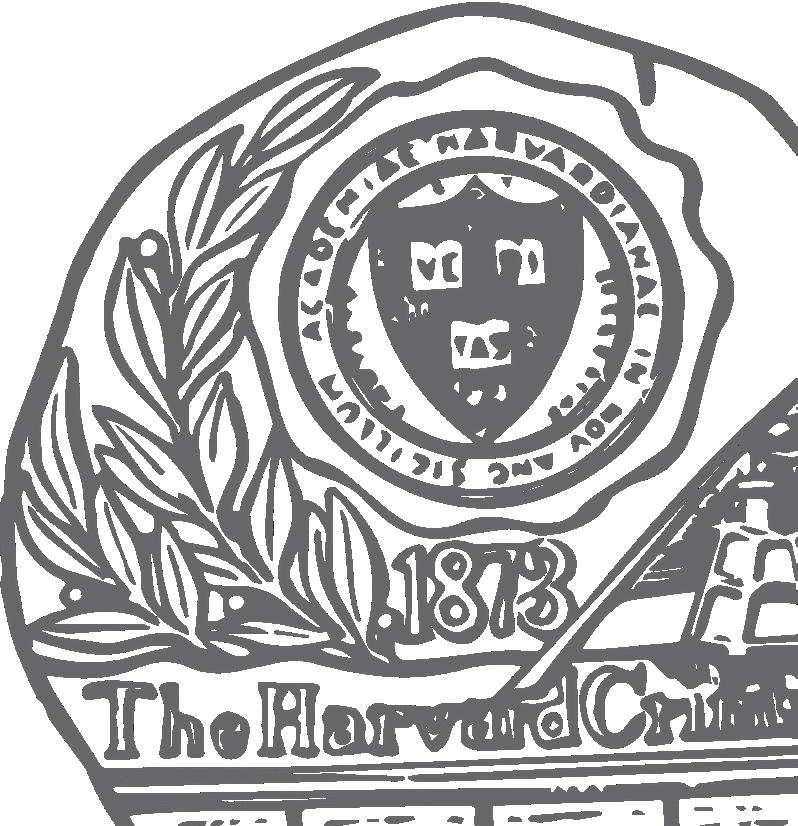
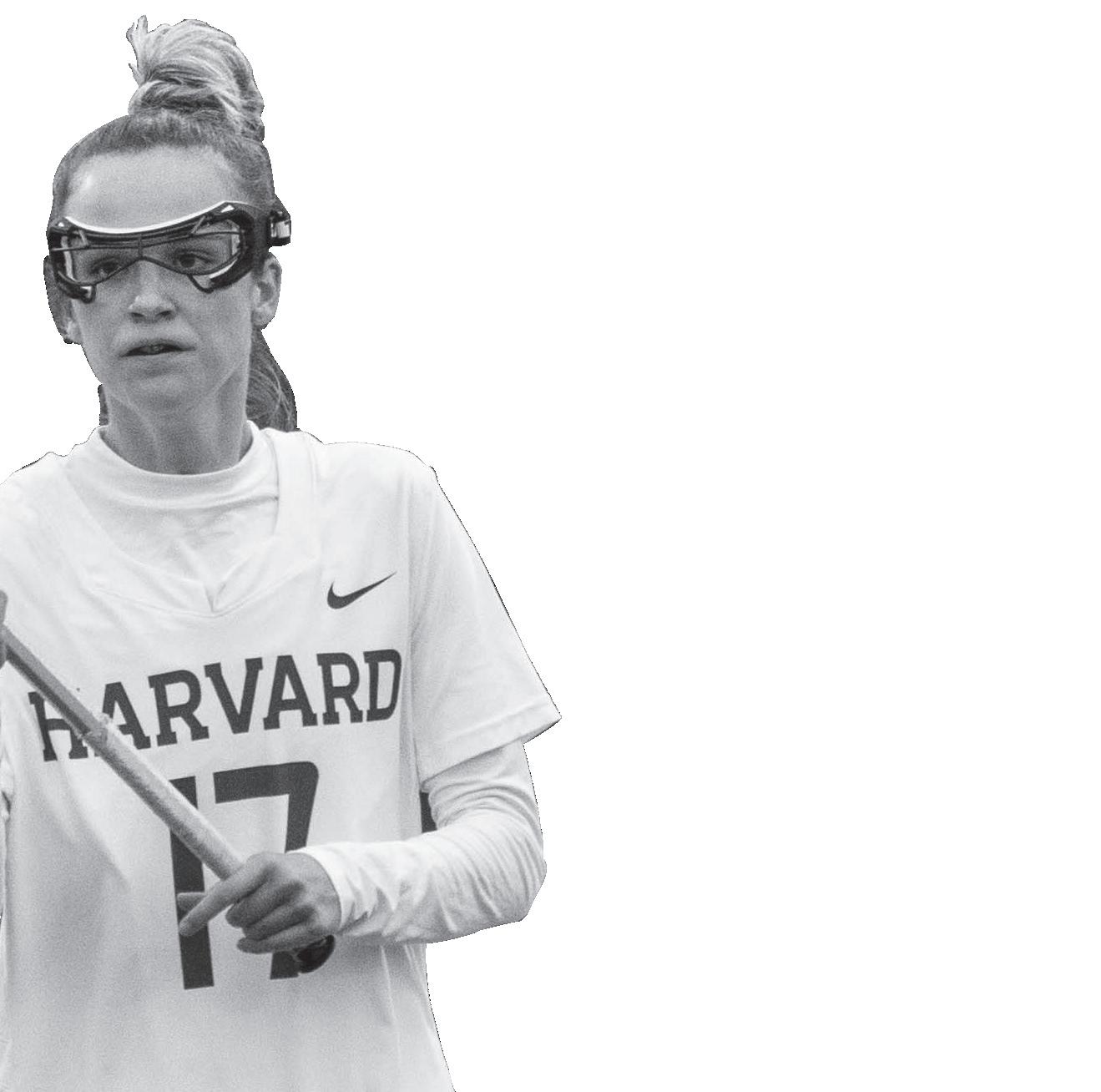
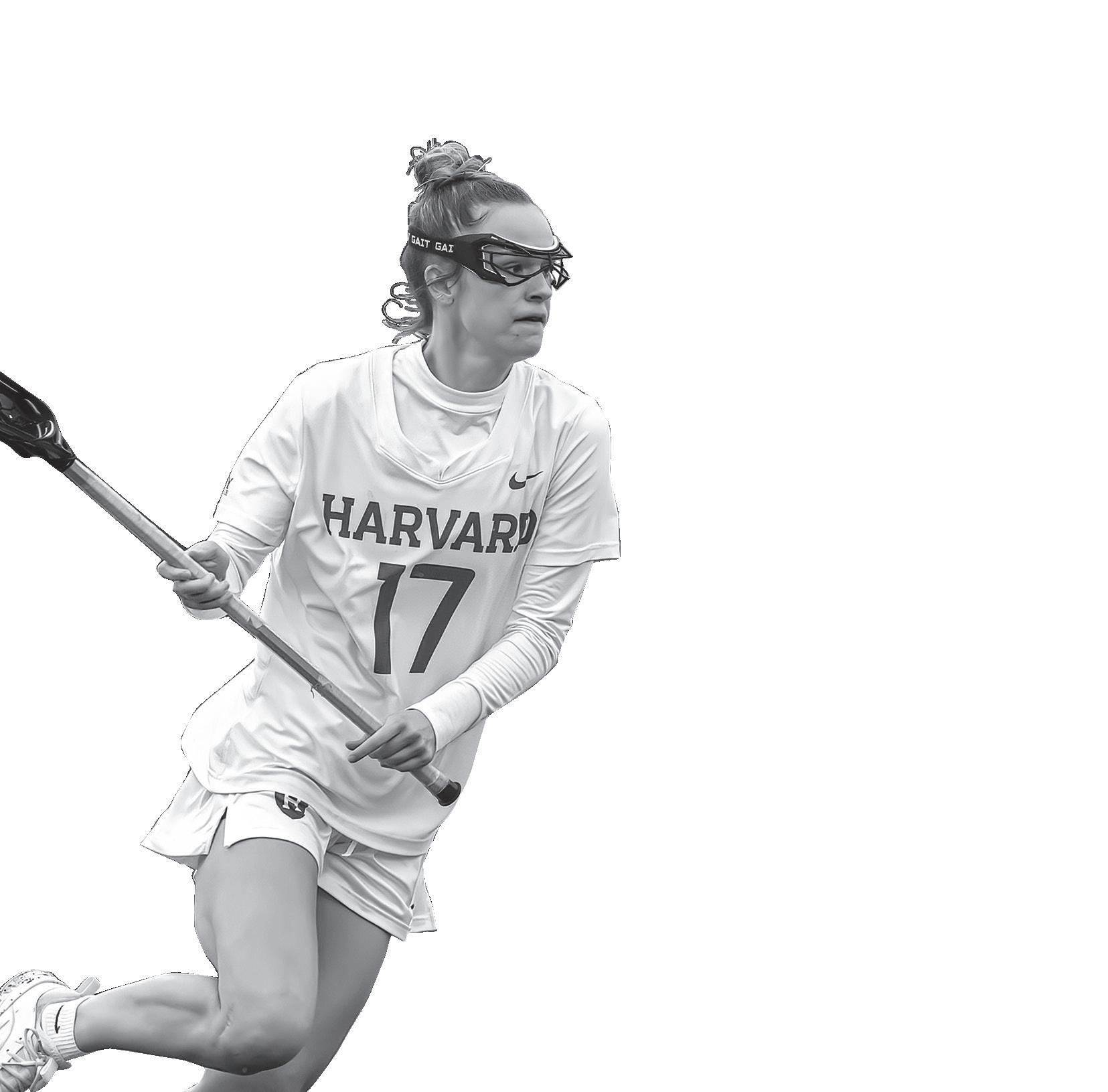


the burden of drawing that top defender from every team, even at a pretty young age.”
Despite facing difficult one-on-one match ups, Hem still recorded a total of 44 points (34 goals and 10 assists) in her first season. She fin ished as the highest scorer on the team and was selected as a first-team All-Ivy player.
Hem continued to train and progress, and by the time she was a junior, her scoring abil ities and field IQ had improved considerably. She recorded an impressive 59 points (43 goals and 16 assists) and was again selected as a first-
“Her IQ has just gotten better and better throughout her time here. She’s great at imple menting whatever you say. She’s really good at seeing it and going to do it,” Wills commented. This progress has only continued into her
As the second-highest scorer on the team, Hem improved again on her previous season’s goals and points, racking up 54 goals and 62
Hem started her senior season on a strong note with a career-high seven goals against Colgate on Feb. 17. She continued her scoring prowess in the next two games, pouring in five more against Georgetown on February 24. Hem then set a new ca reer mark with eight goals against Virgin ia Commonwealth University the follow
In the following game against No. 24 Brown on March 2, Hem recorded anoth er five goals, including the game-winner late in the fourth quarter. After coming back from a 16-11 deficit in the fourth quar ter, Harvard found itself tied with Brown 17-17 with 30 seconds remaining. After a timeout, Hem showed off her lacrosse IQ, making a last-second adjustment to score the game-winner and give the Crimson its
“We had called the timeout. We expected the Brown defense to come out in one thing and they didn’t, and within seconds, the whole offense shifted, and Callie cut and scored,”
“I think it showed how hard we had played and how much we believed the entire game that we could win and it accumulated there at
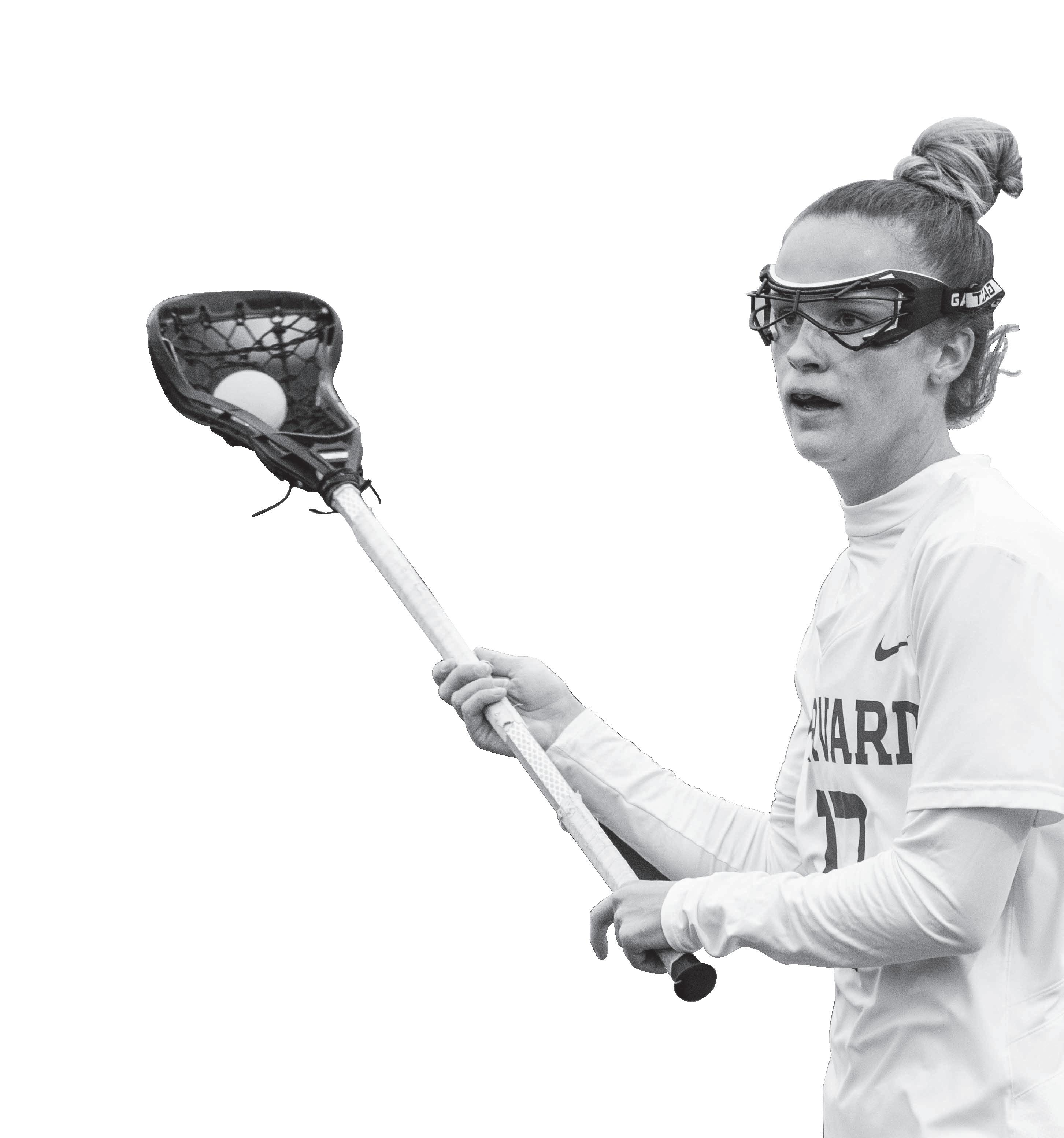
“I think on defense and as a team, we showed our ability to crawl back into any game, no matter what the score is. We don’t get rattled.”
CHRISTIAN BARNARDluke.lawson@thecrimson.com
It is not uncommon for dozens of Phil Conigliaro’s biggest fans to pack the Malkin Athletic Center on a Saturday during wrestling season. The Dedham, Mass. native moved only 25 miles down the road to pursue his college wrestling career at Harvard. Having the support of his family, as well as his second family at Harvard, has allowed the graduating
senior captain to consistently find success on the mat. This success has manifested in his stellar 90-26 career record in a Crimson singlet. Named the 2024 Ivy League Wrestler of the Year, he is leaving the program as one of only five Harvard wrestlers to ever be awarded so in the team’s 131-year history. Closing the door on his wrestling career, he will receive one final accolade: The Crimson’s 2024 Male Athlete of the Year.
Conigliaro began his wrestling career on a whim after receiving a flyer for his town’s rec wrestling team at the end of Pop Warner football season. As the middle child of four boys who loved to recreate WWE bouts in their living room, he imagined it would be similar. Despite his disappointment that it was nothing like entertainment wrestling, Conigliaro was actually quite good, and stuck with it. Recognizing his potential, his rec coaches recommended to his parents that he join a more competitive club team.
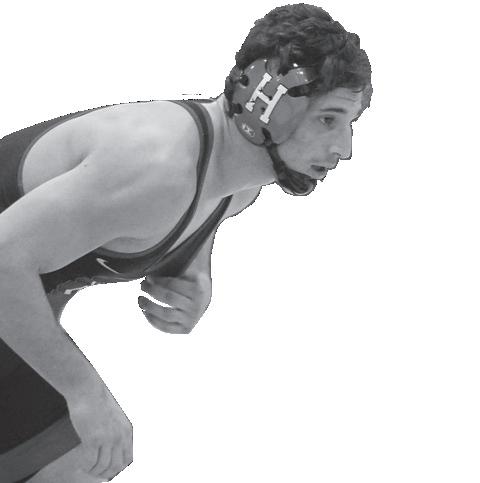
“My mom would actually drive me every day after school to this place called Smitty’s Barn. And believe me, it was kind of like a barn, it was exactly what you would imagine. They just have mats, insulation everywhere, but it was so great. There was a lot of great competition,” Conigliaro recalled.
Smitty’s Wrestling Gym in Kingston, N.H. is owned by four-time New England Champ and Penn State wrestling alum Matt Smith. While this was not an easy transition to make, Conigliaro speaks highly of his development under Smith.
“In the beginning, I got beat up a lot and kind of got a little discouraged. But you know, I kept at it. And eventually, kind of got to the point where I was doing really well at tournaments and New England’s. I ended up winning it a couple times, like in middle school, and then that’s when it was time to like, think about what I wanted to do for high school,” Conigliaro said about his early days on the mat.
When it came time to make a decision about high school, Conigliaro and his parents chose Belmont Hill School, an allboys preparatory school in Belmont, Mass. During his four years at Belmont under Head Coach Don Bradley, who has led the program since 1989 and is a history teacher at the school, Conigliaro was a four-time Prep New England Champion and a four time All-American, as well as a 2017 National Prep Champion. As in any sport, such accolades draw attention from many well-respected college programs, but in the end he chose Harvard for the culture Head Coach Jay Weiss had built, as well as the added bonus of close proximity to home.
“The first time I met him on the official visit he took us into his office. And at the time, the office was actually on the fourth floor of the MAC. It was kind of a small, cramped space. But we just sat there and we talked about wrestling for a little bit and kind of what my goals were, but most of the time, it was talking about, like, what type
of person you wanted to be, in college and after college, how he can help me become not only a great wrestler, but a great person. And that really drew me to the program. He was very authentic,” Conigliaro said about his first meeting with Weiss.
“On my official visit, I became friends with some of the kids on the team just off that weekend. And obviously, when I came here, we came more like a family than a team,” Conigliaro added.
Conigliaro graduated from Belmont Hill in 2018, but after tearing his ACL during his senior year, he decided to take a gap year to get healthy before coming to Harvard. In spite of the injury, he started his career off hot, winning a team-high 31 matches his freshman season, ranking as high as 18th in the nation and qualifying for the national tournament. He was a unanimous firstteam All-Ivy selection and placed third at the EIWA Conference Championships. The first year of college is a difficult adjustment for anyone, especially an athlete in a new environment, but Conigliaro’s mindset allowed him early success.
“I think that there’s kind of a saying that the coaches always use, ‘You don’t know how many chances you’re going to get at this,’” he said. “So it was kind of in the back of my head, like, ‘Why not now? Why not me?’”
Conigliaro’s freshman year was cut short by the Covid-19 pandemic, as the NCAA chose to cancel the national tournament. And as the Ivy League did allow any teams to compete in 2020-21, he did not put on a Crimson singlet again for nearly two years. But part of what makes Conigliaro’s Harvard career so impressive was his consistency over four seasons that were spread
over such a lengthy period of time.
During his sophomore campaign, he again qualified for the NCAA Tournament in the 165 pound weight class after winning an individual conference championship. Conigliaro is one of just 18 Crimson wrestlers to win such a championship in the program’s century-long history. He also continued to lead the team in wins, with 22, and was unanimously named a first-team AllIvy selection.
In what could be called a “down” year as a junior, he moved up to the 174 pound weight class, where he won just 13 matches. Despite injury handicapping him for most of the season, he again qualified for a third NCAA tournament. He said his fondest memory on the mat also happened to occur during the 2022-23 season, when the Crimson beat Princeton in a duel meet for the first time in over 10 years. The match also happened to be Conigliaro’s first match back after his injury. It was an 8-4 win for Conigliaro.
“Princeton’s a team that we’re always going for. We always thought that they were a bit better and kind of fell short. Then last year we finally got over the hump and beat them and that was a really special experience to celebrate with the team,” he recounted.
His fondest memory off the mat may sound daunting to the average person, but to the wrestling community will sound all too familiar.
“Every year to finish off the preseason we run a stadium and it’s probably one of the hardest things, probably the hardest thing, that physically I’ll do in my life. But afterwards, just kind of sitting down on the steps with a team talking about it, and the sense of accomplishment with everybody. Everybody on the team has to do it. Everybody completes it. It’s obviously different times, but kind of a shared experience that we all have and will carry forward. Like, we’ll probably be talking about our stadiums forty years from now,” Conigliaro reflected.
Serving as a captain during the 2023-24 season, the veteran led the team as he always had: by example. Securing 24 wins and another trip to the NCAA tournament, he had his eyes set on a top eight finish and
All-American status. Despite success early in his career, this was the goal largely driving Conigliaro in his final campaign.
“It’s always been to be an All American, at the end of the season, at the NCAAs in March,” Conigliaro said about his goals in an interview in February.
Unfortunately for Conigliaro, this title remained out of reach. Tearing a ligament in his foot just two weeks before the tournament, he was unable to walk. And while his athletic trainers had him walking by match time, he was nowhere near 100 percent.
“I did not do as well as I would have liked. But it was nice to be able to step out on the mat and actually, like, for one last time and give it a go and embrace it,” the captain reflected.
This is one of the biggest lessons Conigliaro said he has taken away from the setbacks he has experienced in wrestling.
“Even when you don’t think you can or you’re not feeling your best, there’s still a way to get it done,” he said.
While his time at Harvard is coming to a close, he knows he will be connected to this program, this place, and the family he has created along the way long after graduation.
“I think it’s actually exceeded my expectations. Some of the people in my team will be my friends, lifelong friends going into the future. And I have the program and the coaches to thank for that,” Conigliaro said.
In fact, in an age where the transfer portal has become a common pathway for Ivy League athletes looking toward a grad year, it never seriously crossed Conigliaro’s mind to leave Harvard.
“I never looked into it seriously. I probably could have gone to another school to finish up, but I thought about it very briefly and quickly shut that down. Because, you know, I love it here at Harvard. Definitely a place where I wanted to start and finish my career with my coaches and my team. I think we’re just so close and I was enjoying it so much. I just didn’t see a reason to go anywhere else,” Conigliaro said. “All my friends and family, being able to come to my home matches easily. You know, at some matches I would have, you know like, dozens of people that are friends, family, old coaches, like
just people throughout my entire wrestling experience were able to come and that was really special for me.”
Coniglario’s experience of seeing the outpouring of support from his vantage point on the mat is matched by the per
spective on the other end. The fanbase that the wres tler built is legiti mate, and the pride of his former coaches and peers was often palpable at his matches. Co nigliario made a ma jor impact on his wres tling community, left the Harvard wrestling team in a better place, and etched his name in the Ivy League record books in the process.
So while there is not an award for running a stadium or navigating col lege sports during a pan demic, Harvard wrestling fans should be proud of all Phil Conigliaro has been able to accomplish during his ca reer here.
sydney.farnham@thecrimson.com
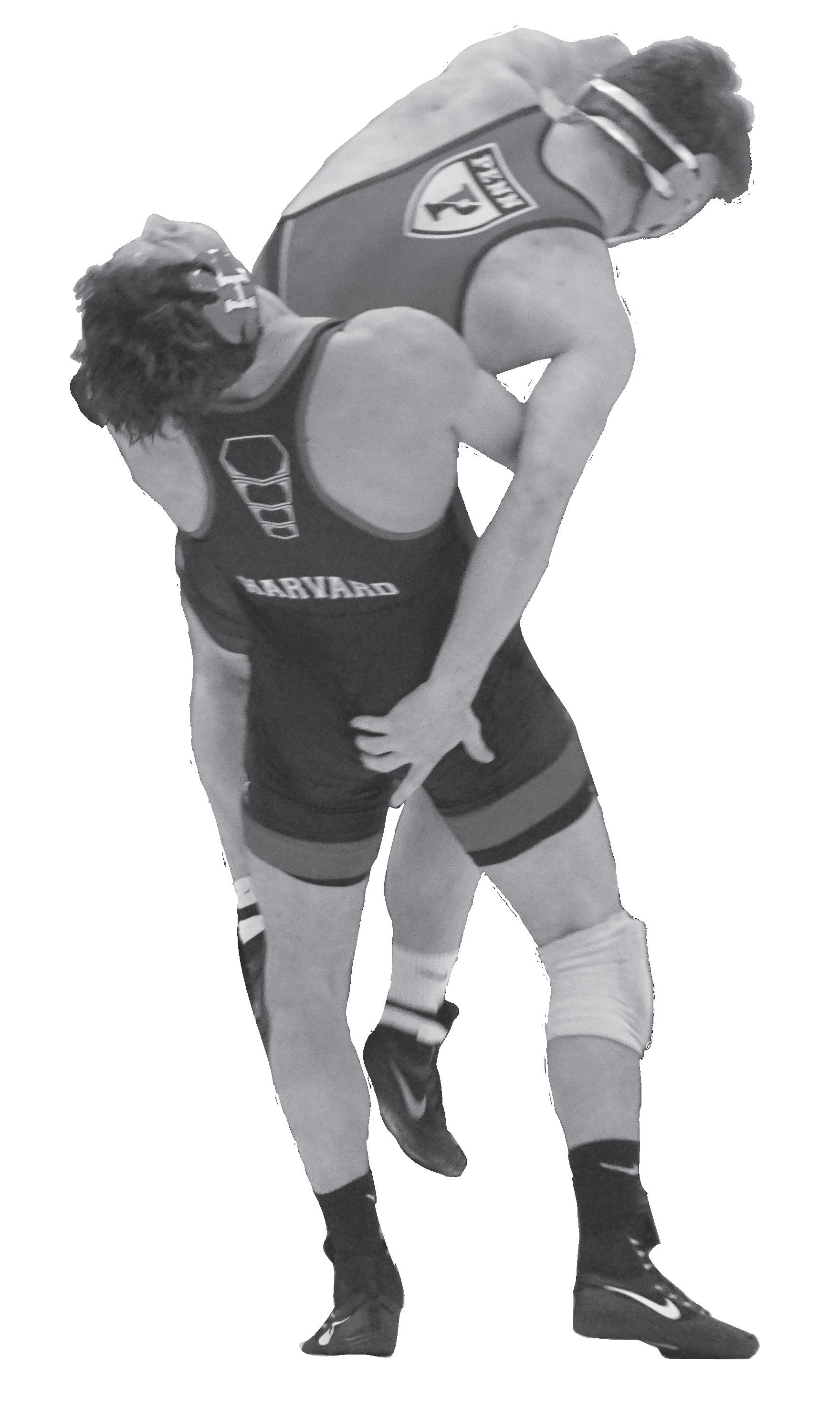
Despite being just 18 years old, freshman fencer Jessica Guo is no stranger to competitive glory on the piste. She went to her first Olympics at 15, eight years after she started competing. That same year, she also became the top-ranked fencer in her entire home country of Canada.
Even with a rocky start to her first year in Cambridge, the Toronto native has still reached impressive heights competing for Harvard so far.
minds us of what we work for.”
Guo is an experienced fencer. She has been traveling around the world, from Georgia the country to Georgia the state, since she was a young teenager competing for world junior championships. But, college fencing provides a new perspective on an otherwise highly-individual sport: teamwork. Although Guo didn’t know what to expect, she found it a comfortable environment. Having a team who was there for
her and competing with her proved to be an incredible asset. Especially during the long NCAA tournaments, having a reliable team with good culture was critical to her.
“It was a lot more supportive. I knew all of my teammates were rooting for me in every single bout and how I fenced mattered for the entire team, instead of international competition where everything is for me,” Guo stated.
This supportive environment has also pushed Guo to grow
into a more resilient fencer.
“I want to be able to adapt to different situations, different formats of fencing,” Guo explained. “This adaptability has also helped me for international competitions, where I have been placed in uncomfortable situations that I have needed to adapt and cope with.”
Guo has placed special emphasis on her tactical ability since she started fencing. Getting put in uncomfortable situations helped her expand her range as a fencer, and helped her learn how to overcome those obstacles.
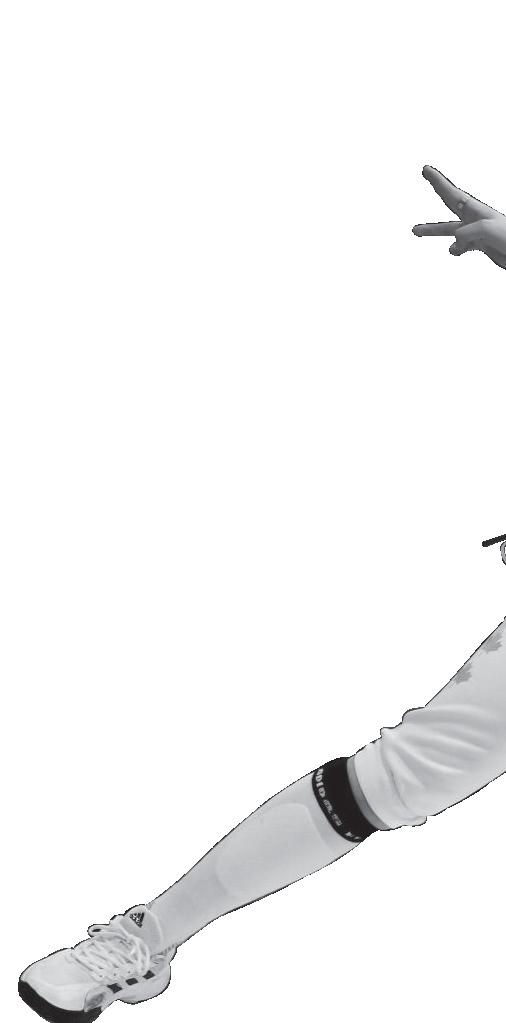
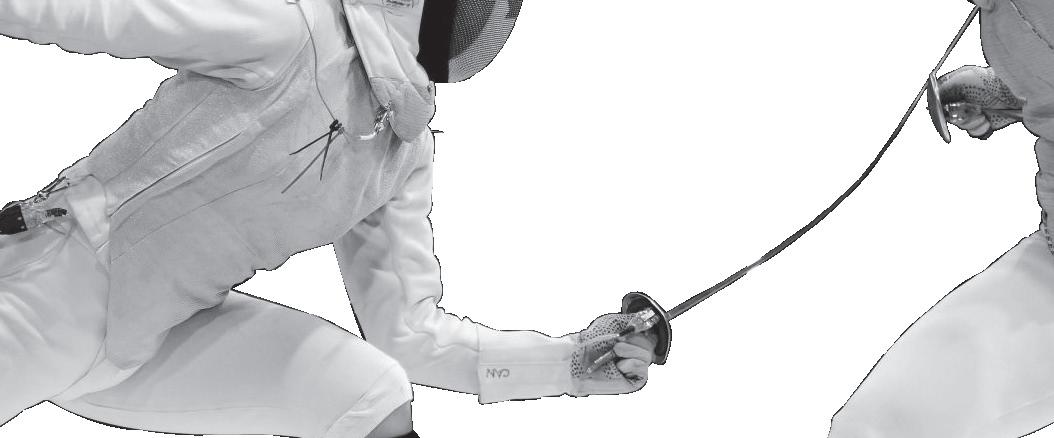

To clinch her spot as the
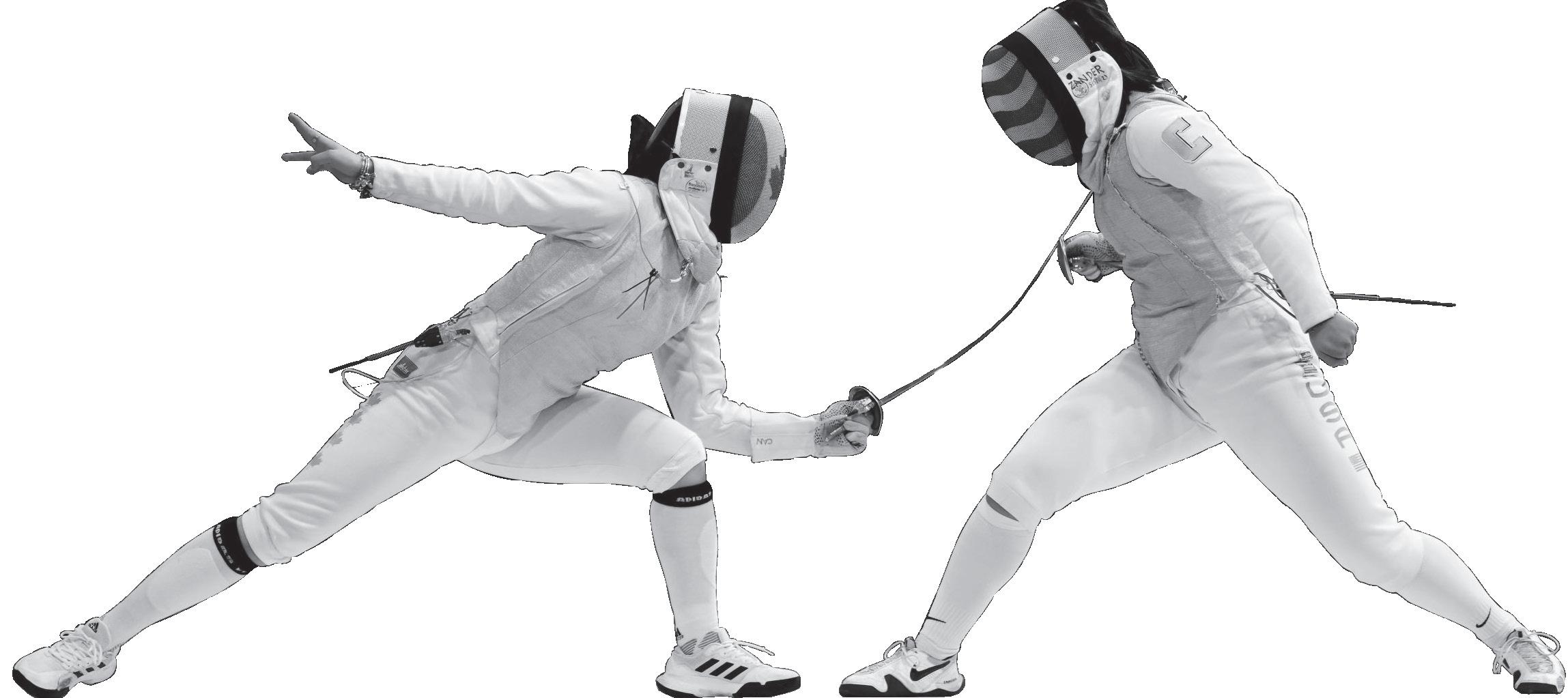
NCAA women’s foil champion, Guo had to fence against her teammate, junior Lauren Scruggs. As is tradition with intra-squad bouts, Head Coach Daria Schneider elected not to coach either fencer during the matchup. Guo won the matchup, although for both Guo and Scruggs, it was more important to win as a team, rather than as an individual. This Harvard win, as well as winning the women’s individual épée title, helped carry the Crimson to its first title since 2006, when Guo was less than a year old.
Though it would seem college might interfere with a high-level fencer’s ability to travel the globe competing, for Guo — who plans on concentrating in Neuroscience — her professors have made this a smooth transition. At the very least, collegiate fencing has clearly not hindered her international competitive pursuits. Guo has proven this year that she can simultaneously be a student-athlete and one of the most talented fencers in the world.
This spring, Guo qualified for the 2024 Paris Olympics. Guo hopes to help Team Canada improve on its fifth place finish at the 2020 Summer Olympics in Tokyo, when she made her Olympics debut and garnered an individual 13th place finish. Leading up to her bout on the world stage, she also took 10th place at the Senior Foil World Cup in Cairo, Egypt on Feb. 27. While she took to the piste for her first Se - nior World Cup at just 13, this year’s 10th place finish
made Guo the youngest fencer ever to secure a top-10 finish. Although the Canadian fencer is still young enough to compete in junior level events, she reached a peak performance of fourth place in the senior rankings.
“I am approaching this Olympics with the mindset that anything can happen,” the freshman said of her qualification. “I learned from the last Olympics that miracles can happen, and that there is great unpredictability in the Games because everyone is nervous for the once in a lifetime opportunity.”
my country!”
Rather than focusing on the different format and teammates as well as the bigger stage, the fencer plans to focus on what stays the same. Guo will focus on defeating the opponent at hand, instead of thinking about the pressure of representing her country.
Guo also talked about how influential collegiate fencing, and the novel challenges it brings, have been in preparing her for the Olympics. She plans on using the in -
I am approaching this Olympics with the mindset that anything can happen. I learned from the last Olympics that miracles can happen.
Jessica Guo Freshman Foil Fencer and Team Canada Athlete
Guo could once again face off against Scruggs in Paris, but this time, however, the two would be competing under different flags, which will make the competition that much fiercer. At the end of the competition, however, the duo will still be Crimson teammates, and as such, Guo was quick to commend the rising senior.
“It is definitely very different, because I have been competing alongside her the entire season,” Guo said, of competing against Scruggs and Team USA. “Therefore, having to cheer against her is definitely very weird. However, I’ve gotta represent
creased resilience she practiced in NCAA tournaments to help her advance past her previous finish in the tournament this summer.
“NCAAs is a great preparation for my endurance because there are around 20 bouts I need to fence in,” Guo said. “However, the high energy and intensity of the competition is good preparation for the loud and chaotic crowd in Paris.”
Despite having competed on the biggest fencing stages in the world, her favorite memory is something much nearer and dearer to her heart: winning the Cadet World Championships.
“I was super nervous going into cadets
“We all, to put it plainly, have a lot of love for one another, and want the best for each other. And that enables us to joke around and act as if we were brothers.”
JOSHUA KIM Wrestler
because it was my last year, my last chance to win,” she admitted. “The day before I did not perform the way I wanted to, so I was nervous throughout the day.”
This nervousness definitely affected Guo’s fencing. Combined with some close calls made by the referee, Guo had a slow start to her finals day. But she was able to turn it around.
“Throughout the day I talked to my coach about my feelings, which gave me confidence,” Guo recalled.
And that confidence translated to success on the piste, leading her all the way to the finals, where she started off in dominating fashion. In the middle rounds, she built a lead of as much as seven touches, but quickly saw the advantage evaporate. Describing her mentality at that juncture of the match, she said, “I was breaking down.”
But Guo was able to hang on. She seized back the momentum, won the match, and claimed her final cadet championship. That victory made all the hardship on the way worth it. Despite winning cadets previously, the sense of conclusiveness and success despite adversity this time around made the win that much more special.
“The best moment was when I hit that last touch. I just started crying. Crying of relief for winning,” Guo recalled.
The Canadian phenom will have many more chances to achieve such elation, beginning across the sea this summer. Catch Rookie of the Year Jessica Guo, as well as Lauren Scruggs, Elizabeth Tartakovsky ’23, and five fencers from the Crimson men’s team facing off in Paris this summer.
Male Rookie of the Year
Malik Mack loves to operate under pressure. And many times this season, Harvard men’s basketball Head Coach Tommy Amaker has asked Mack to do just that, putting the ball in his hands and trusting him to make the right plays when it matters most.
In his first collegiate season, the guard from Oxon Hill, Md. unequivocally delivered, breaking a few individual records along the way. Despite falling short of the Ivy Madness tournament, Mack set the Harvard freshman single-season scoring record with 413 points, all while setting up his teammates with a leaguebest 4.8 assists per game.
After earning the Ivy League Rookie of the Week title a joint-record eight times this season, there was little debate over whether to award Mack the Ivy League Rookie of the Year award to cap off his historic campaign.
“I feel like we had a solid season,” Mack reflected. “It could have definitely gone better, we didn’t accomplish the goals we set out as a team, trying to make it to the Ivy League playoffs and then eventually the NCAA Tournament, but individually, I felt like I had a great season.”
After tearing it up throughout the Crimson’s non-conference schedule, including a season-high 32-point performance at UMass Amherst on Nov. 17, which tied for the sixth highest tally in the NCAA for points by a firstyear against a Division I opponent, Mack suffered his one major setback of the season when he was diagnosed with mononucleosis in early December.
“It’s hard to sit out and watch my guys go without me,” Mack said. “It was a tough re-
covery process. Different days, you feel different ways. Some days feel good, some days feel terrible, so it was just trying to figure out ways how to bounce back, how to keep my weight up, which is a big thing for me being a smaller player.”
Sickness sidelined Mack for the Crimson’s final three non-conference games and clearly continued to impact his play on the court long after he returned to action in a 89-58 road loss to Princeton in Harvard’s Ivy opener. In that game, Mack shot 0-3 from behind the arc and had a team-high five turnovers.
Before his sickness, Mack was making nearly half of his shots from three-point range, averaging 20.1 points and 4.4 assists per game. After returning from mononucleosis, Mack’s three point average dropped to 24% across the rest of the year, but the freshman found other shifty ways to score, including 100 made freethrows, good for third in the Ivies. Mack finished the season with 15.1 points per game in Ivy play.
“I feel like I’ve never really got my legs back underneath, but was just trying to find ways to still be productive, and still have an impact for my team,” he said. “It was definitely difficult, but just trying to find different ways to power through because I knew my team needed me, so every game I was available, I was there.”
Mack says his favorite moments on the court from his first season were the team’s outings at UPenn and Brown, citing the intensity of the away crowd — a testament to his fiercely competitive nature. Mack says that he loves the challenge of going into another team’s building to come away with a win.
As a student-athlete at Harvard, Mack has also enjoyed his time in Cambridge, although he appreciates the proximity to a bigger city such as Boston. On campus, Mack says his favorite class so far has been “Quests for Wis-
dom: Religious, Moral and Aesthetic Experiences in the Art of Living in Perilous Times,” an experimental course co-taught by the legendary anthropologist Arthur M. Kleinman.
“It’s definitely a great, great class on different books, different ideologies, different philosophies, different perspectives that give you a better view on life and how you want to carry out your life through the lens of other people,” Mack said.
Heavily recruited in high school, with offers from top programs like Ole Miss, Rhode Island, and St. Peter’s, Mack has spoken frequently about the influential role that Coach Amaker played in bringing him to Harvard. Amaker has been head coach at Harvard since 2007 after stints at the University of Michigan and Seton Hall University. In college, Amaker played guard for Duke under coach Mike Krzyzewski, before beginning his coaching career under “Coach K” as an assistant coach.
During the recruiting process, Amaker would frequently attend Mack’s AAU games, a level of dedication that wasn’t lost on Mack.
“Coach Amaker was a big piece, probably the biggest reason why I came here,” Mack said.
“I wanted to learn under him and playing under him was definitely a cool experience, something I never really had from a coach before, just instilling that confidence and letting me play my game to my fullest strengths and giving me every opportunity. Even if I failed an opportunity before, he was gonna give me another shot because he trusted in me,” he added.
After entering the NCAA transfer portal in late March, Mack completed a transfer to the Georgetown Hoyas in April. Georgetown was viewed as a likely destination for Mack because it offers a high level of academic rigor and will enable Mack to pursue name, image,

and likeness opportunities that have so far been spurned by the Ivy League.
At Georgetown, Mack will play his sophomore year under second-year coach Ed Cooley, who coached the Hoyas to a 10th place finish in the Big East in his inaugural season. In addition to Mack, Cooley has brought in several other notable transfers in the offseason, including 6’7” guard Micah Peavy, who will be coming to D.C. from Texas Christian University for his fifth year of college eligibility.
Despite the plethora of individual accolades Mack has acquired this season, his focus moving forward a national championship.
“I want to make the NCAA tournament,” Mack said. “My abilities on the court speak for itself, so just being able to show as a leader, as a point guard, that I can take my team far is my main goal.” The fact that the Hoyas haven’t been to the big dance since 2021 doesn’t seem to bother him; if anything, it gives him motivation.
“Making a run in the tournament is something that I want to do for a team that hasn’t been there in a while,” he said. “I feel like if I’m able to do that, then the awards will take care of itself and all the other things that I want to do will take care of itself.”
One thing is for certain: Crimson fans will miss the flare that Mack brought to Lavietes Pavilion in his brief tenure at Harvard. Mack’s departure raises more questions about the Ivy League’s persistent resistance to NIL collectives and the real likelihood that more talented athletes like Mack will choose to bring their talents to schools where they can be compensated monetarily.
For now, Mack will see if he can continue to light up the court with his confident play, albeit in a different colored jersey.
alexander.bell@thecrimson.com
“The emotions were there. It was the rubber match. The boys were really fired up. A lot of energy.”




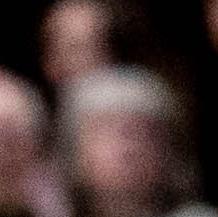


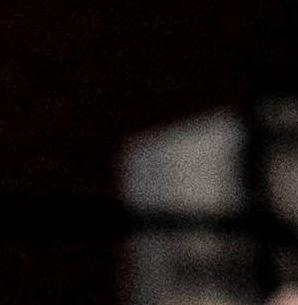

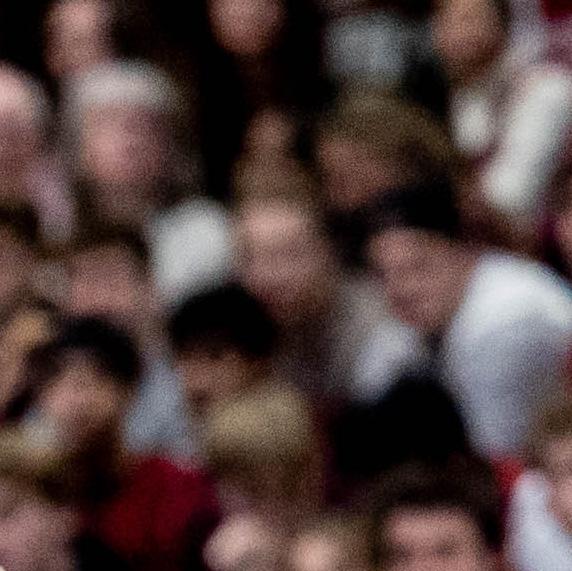
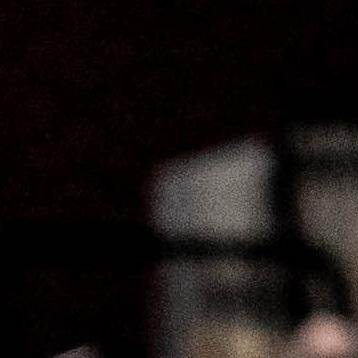


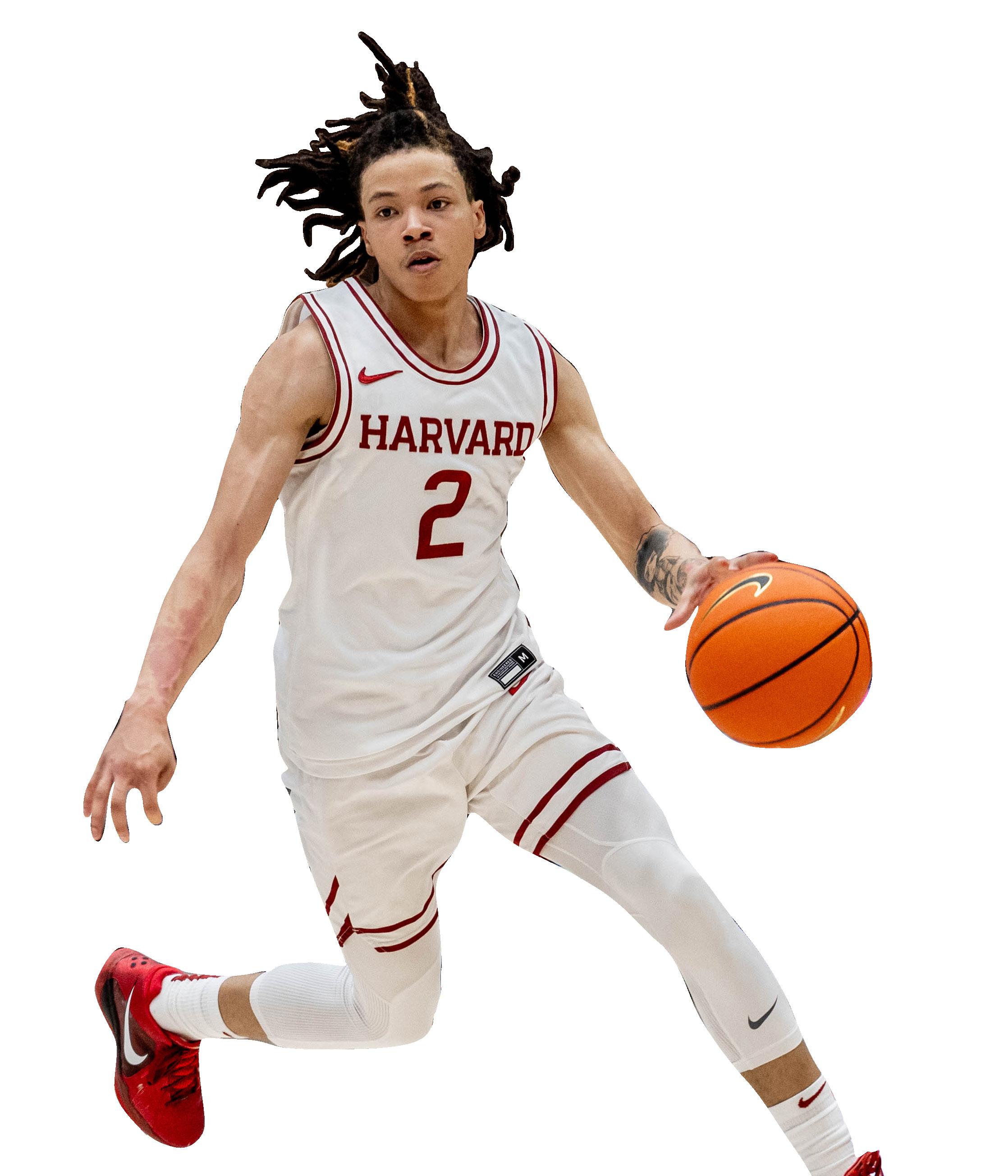
23
2






“Looking to next season, we want to become a more consistent team so we are able to play at our best no matter the day.”
Winning a third consecutive Ivy League title (the 33rd in program history), dominating on the court, and showing great promise for the future, the Harvard men’s tennis team has earned itself the honor of Team of the Year after a season of triumphs.
The squad has had an historic year, winning the Ivy League championship in thrilling fashion. Not only did the Crimson win the league championship, but it had an overall impressive season, finishing 15-0 at home and earning the highest NCAA Tournament seeding in program history.
Its most recent success — reaching the Sweet 16 of the NCAA tournament for the second consecutive year — marks the team’s emphatic reversal of fortune. Before last season, it hadn’t reached the second weekend of the tournament since 2004.
Amid all its achievement, coaches and players alike acknowledge that its Ivy title victory against Princeton is a moment that is hard to beat. “The most memorable moment in the Ivy portion of the season was certainly our match with Princeton,” said the Scott Mead ’77 Head Coach for Men’s Tennis, Andrew Rueb ’95.
The win was especially notable not just because it secured Harvard the title, but also because of the standout performance from freshman Rohan Murali. The match with Princeton was a nail-biter, with the final point coming down to Murali on court 5.
In his rookie year as a member of the Crimson, Murali has experienced impres-
sive growth throughout the season. When the Ivy title came down to his match, he stepped up and helped his team. It was amazing “to see him come out, win in those circumstances, and elevate his game,” Rueb reflected.
His success demonstrates the huge roles that several players stepped into. “We’ve been really pleasantly surprised to see lots of players step up when they were given a chance to compete, and that’s been really exciting,” Rueb explained.
The Princeton match wrapped up a hugely successful regular season for the Crimson. Harvard tennis’s strong leadership has played a key role in the team’s success this season.
Senior David Arkow credits a large portion of the team’s success to the culture of the team, led by senior captains Alan Yim, Henry von der Schulenburg, and Ronan Jachuck.
“Just little things like that, off the court, hanging out and spending time together, makes people buy in more and want to work harder if you’re more connected. Even if you’re not in a match, everyone really, really cares and really, really wants this,” Arkow said.
Nevertheless, it is also resoundingly clear that the Crimson’s success this season would not have been possible without contributions from everyone on the team. Senior phenom Cooper Williams emphasized the sentiment that the team as a whole is responsible for individual success.
“My teammates have done an amazing job. The coaches have done an amazing job with me to the point where I’ve had a really good season as a single player, doubles player, a team player,” Williams said. “We per-
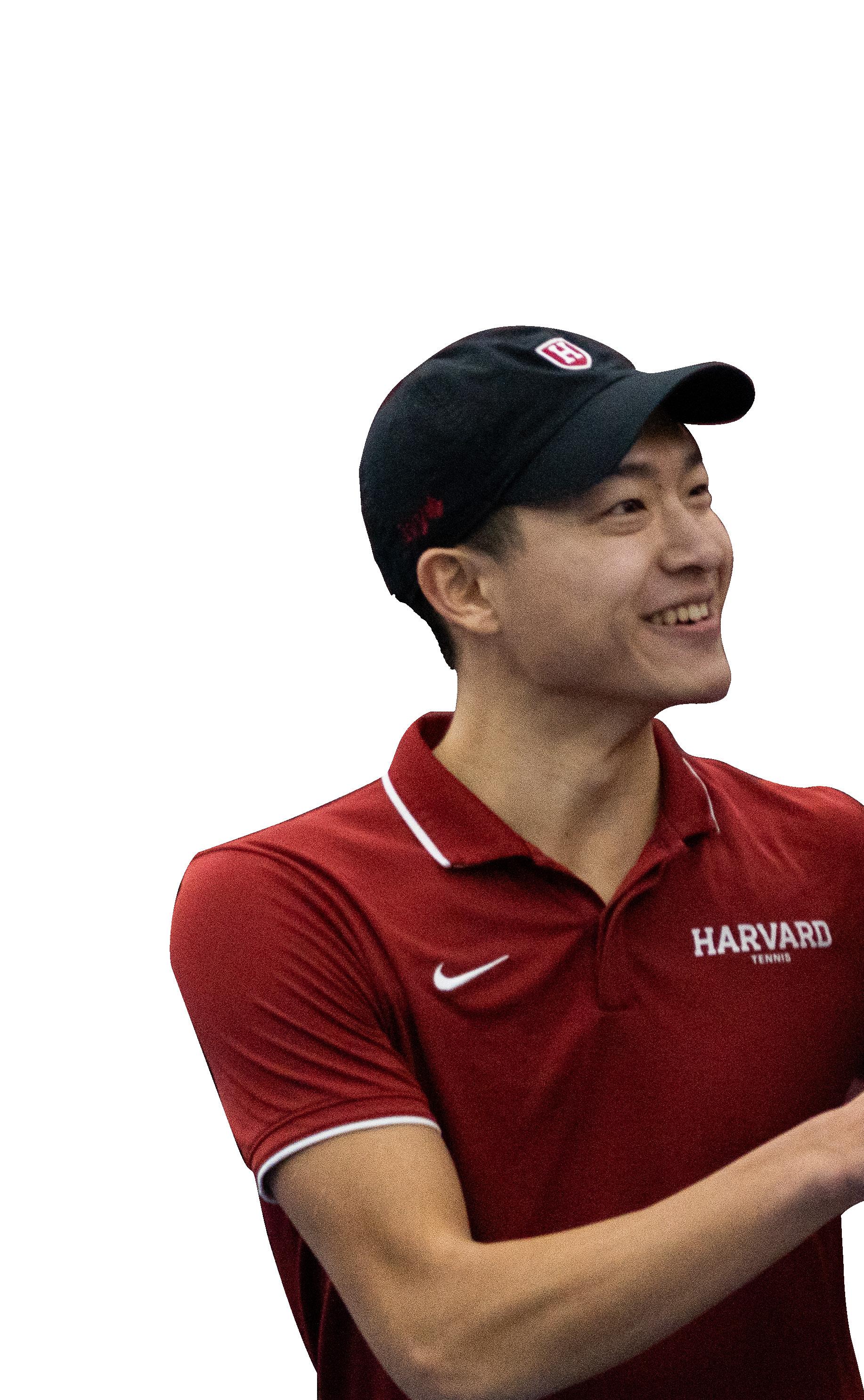
form at a really high level.”
Rueb attributes the team’s on-court success in part to its tough in-season competition.
“One of the reasons that we were able to be ranked so high and finish the season at 12th in the country is that we scheduled top level competition, and that gets you ready. You take some losses, yes, but it also gets you better. And our goal is to be playing our best tennis here in May, at the NCAA tournament,” he said.
This is where Harvard tennis’s attention now turned. In the NCAA tournament this year, the Crimson faced off against strong tennis programs from across the country. 13 4 Record Overall 2 2
“You want to make you’re healthy, rested, and that you’ve been compet-

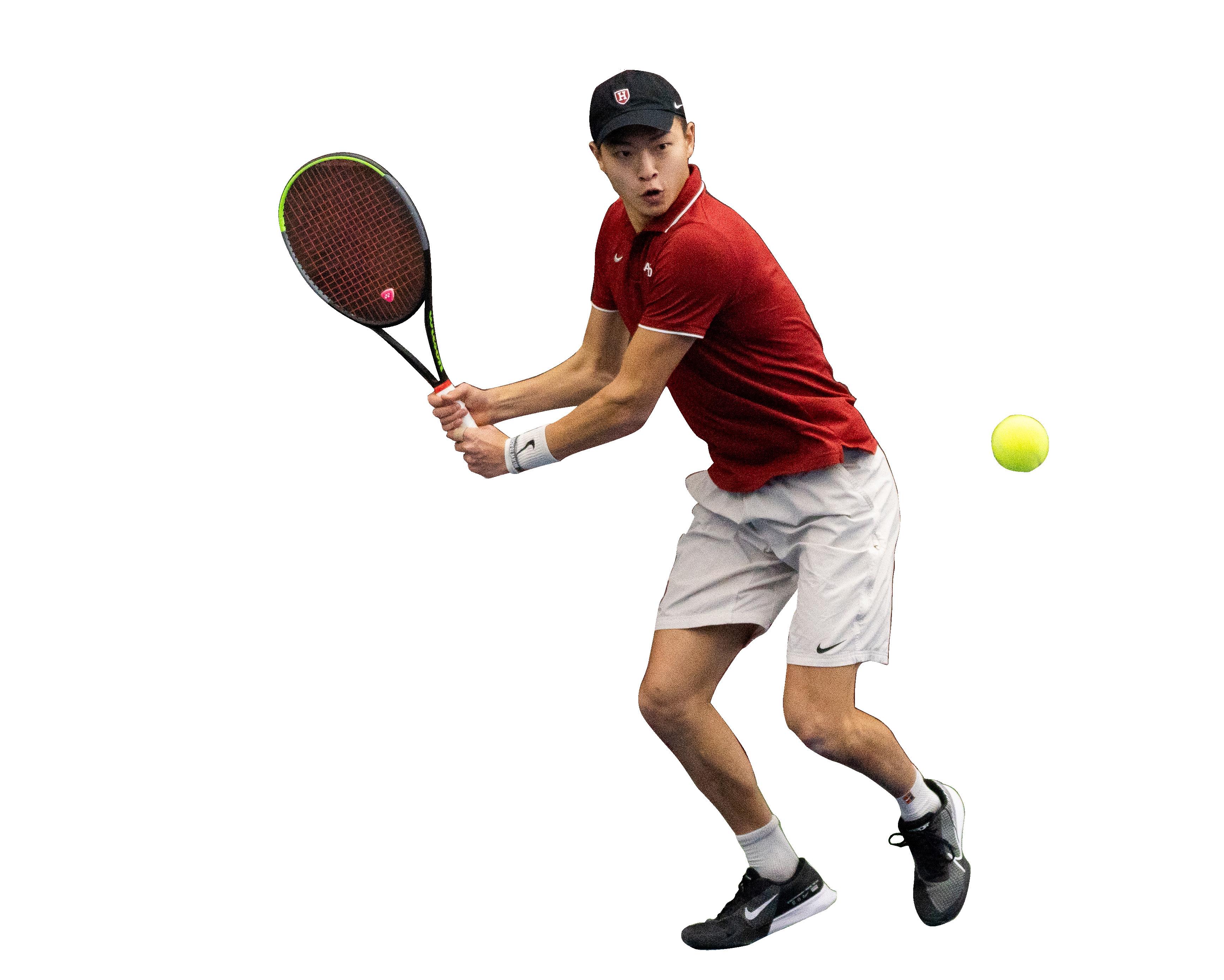
ing the Wildcats’ Jaden Weekes 6-0, 6-2. Milavsky has been dominant all season. For the week of April 29, Milavsky earned Harvard Athletics’ Student-Athlete of the Week award, presented by the Harvard Cooperative Society. Although team competition came to an end during this matchup against the Wildcats on May 11, Williams and Milavsky will continue to represent Harvard tennis at the 2024 NCAA Individual Championships in
to take it on. “It’s going to be a grind but I really want to perform the best I possibly can. I’m excited. The next four weeks are going to be a busy time, but it’s going to be a lot of fun,” Williams said.
Whether it be the outstanding performances from Williams and Milavsky, strong leadership from the senior captains, or the never-ending support from the coaching staff, everyone on the Crimson squad contributed to its unforgettable season. It is this type of complete performance that earned the squad our coveted team award this season.
lauren.choy@thecrimson.com daniel.hochberg@thecrimson.com
Excellence in sports is not some thing that comes overnight. For the Harvard women’s tennis team, it has taken almost the entirety of the team’s five-decade existence to prove itself in the competitive landscape of both the Ivy League and NCAA.
But this year’s program, the 50th team, has definitively proved itself. It put up big wins, unprecedented dominance, and rap id growth that has characterized itself as a team built on the unity between a dynamic freshman class and veteran cornerstones. Its eclectic and electric mix of experienced play ers, mature youth, and some of the best talent the program has seen this millennium led the Crimson to a 19-5 record and a 5-2 finish in the Ivy League, good for second in the conference. The Crimson also claimed the longest win ning streak in program history by winning 14 straight matches while going a month and a half without tasting defeat. It is this dominant performance and ability to break through to the top of its division that earned the award of Breakout Team of the Year.
Special teams are formed well before the season starts; team chemistry and cohesion don’t put points on the scoreboard, but they can still be the difference between a good team and a great one. The older members of the team were well aware of this fact, and they began watering the seeds of a supportive team environment by engaging with the in



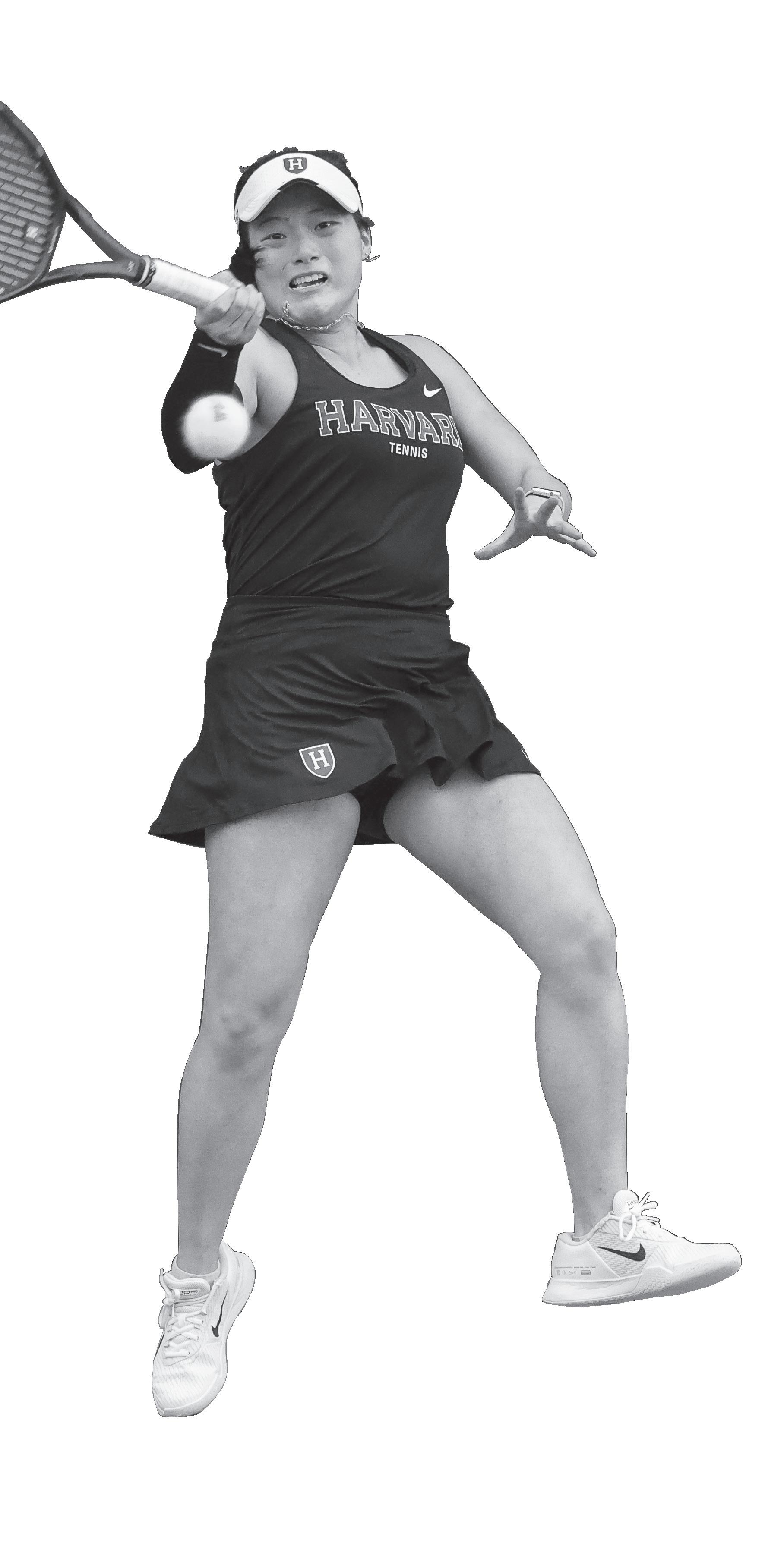
its redemption against Yale, Team 50 showed its dominance. Two days later, Harvard went one step further and set a new record with a victory at home over Brown. The Crimson added two more wins onto the streak for show, including a victory over No. 43 Columbia. Harvard finally succumbed to defeat on the road against No. 68 Penn.
The team’s next loss, to No. 44 Princeton was heartbreaking for the team, as Harvard took the future Ivy League Champions to the wire, losing 3-4. Although this loss almost assuredly clinched the Ivy League championship for the Tigers and eliminated the Crimson from contention, Harvard showed grit and mental toughness by defeating Dartmouth on the road to finish the Ivy League and regular seasons. This win reflected the mental toughness that Sheila Kelly Palandjian Head Coach for Har-
vard Women’s Tennis Traci Green and her staff preached

to the team all year.
“Coach Green has told me to stay really present and focused,” Kim said. “Controlling what I can and don’t worry about what’s already happened because I can’t do anything to change that.” She showed that these words were more than a mantra by recovering from the Princeton loss to defeat her singles opponent in straight sets against Dartmouth.
“One of Green’s favorite quotes is ‘Turning the page,’” Karra added. “She says that a lot on the tennis court, but, for me, it really shows through in a lot of other facets of my life as well. It’s of course super helpful after we lose the doubles point and on the court but also a really important life skill.”
Its regular season track record earned Harvard a spot in the NCAA Tournament for the first time since 2010; this postseason berth ended the longest drought in program history. Postseason tennis is hard for any team, but the Crimson faces an additional challenge: Harvard finals season. The NCAA Tournament and finals week at Harvard run concurrently, forcing athletes to split their focus. Although facing finals and a tough opponent such as No. 9 Texas can be daunting, balancing the two challenges only further proves the team’s collective mental fortitude in being able to excel both on and off of the court.
The Crimson made a valiant effort in its playoff matchup, but ultimately, the superior depth of the Longhorns was too much for Harvard to overcome. Though the loss ended the Crimson’s season, there was no shame to be felt in defeat for Harvard. Of the Crimson’s losses in this stellar season, four of the five came on the road against ranked teams.
The Crimson claimed victory over two ranked teams on the season and garnered seven shutout victories, four of which were over Ivy League opponents.
The end of the season leads the team to perform reflection and introspection in the quest to improve during the offseason and maintain momentum for next season. The privilege of playing while wearing the Harvard name is something that could easily be overlooked during the rush of the season but is not lost on the Crimson’s rookies; instead, they use it as a source of pride and motivation.
“It’s been an honor, honestly, to play on the ten-
nis team. Even sometimes when I don’t want to go to practice, I just try to think about how lucky I am to have this opportunity that so many people work for their whole lives,” Block said.
Reflection is especially pertinent during anniversaries, and this season being the 50th anniversary of women’s tennis at Harvard led the program’s storied history to be at the forefront of the players’ minds.
“The 50th anniversary really put things in perspective and made me even more excited about where I am today or three years ahead of me, just seeing how incredible these women are and what they’ve done,” Karra said.
That sense of family, history, and unity help fuel the fire driving the team to reach ever-greater heights. While the accolades that the Crimson collected this year were unprecedented, the team is still not satisfied.
“As a team, we want to win the Ivies next year, and we know we can do it so that is reassuring. Narrowly missing out this year definitely lights a little bit of a fire under us,” Block added.
Maintaining positive culture through roster turnover is a challenge faced by every college team, but Harvard seems prepared to face that challenge behind its mature, talented underclassmen. The Crimson will look to replace two seniors in the upcoming season: Sany Gawande and Iveta Daujotaite. These two players have helped oversee a shift in the culture of the program. As a result, the underclassmen expressed gratitude for the contributions of these departing seniors and are eager to carry on their legacies.
The breakthrough of the Harvard women’s tennis team has been building over recent years as talent accumulated and culture was curated. Years of knocking on the door of success finally came to fruition. The addition of ready-to-play freshmen gave the team the strength it needed to jump to another level, and the home loss to Yale led the team to quit knocking on the door and instead kick it down. A record-breaking streak and a second-place finish in the Ivy League announced that the team had arrived. And next year, the team plans on showing that this year’s run is not an aberration for the program, but a harbinger of a bright future for the program.
emma.dejong@thecrimson.com reed.trimble@thecrimson.com

“‘Never give up, never ever give up’ has always been our mantra, and obviously today was the epitome of that. So proud of our kids, so proud of our coaches – it was just a great day for Harvard football”
Head Coach Tim Murphy
After putting the finishing touches on his final Ivy league crown
Grit. Determination. A desire for victory. These traits are what define a team that, against all odds, can find success. However, an additional attribute aided Frisbie Family Head Coach Gerry Byrne and his men’s lacrosse team in its comeback victory against the Bucknell Bison earlier this season: preparation.
In what was a seemingly hopeless first half, Byrne’s squad dug deep to overcome a seven-goal deficit that had tipped all of the momentum into Bucknell’s favor. The Crimson team remained composed and drew on the maturity of its starting lineup to methodically chip away at the Bison’s lead. Its tact in implementing the scenarios Byrne had thrown at it all season — like being two goals down with a minute remaining, or being locked down on defense defending a mock one-goal lead — had equipped the team with the tools needed to compartmentalize each goal as an individual battle and slowly claw its way back into contention.
It is the team’s strive for success that has defined it as a competitive program that is ready, and deserving, to find victory against top programs. Its desire to win, manifested against the Bison, is also what secured the squad’s endeavor the honor of The Crimson’s Comeback of the Year.
“As much as you can, you practice being behind. And so we’ll add elements to our practice, particularly early in February and January when we’re training. So
the fact that one of our earlier games required us to come back, we’d already kind of done those scenarios, where there’s say six minutes left in the game and you’re down three. We’ll play a scrimmage where we execute that. And, pretty consistently, we came back against our scout team,” Byrne said. “So, they knew the drill, they knew what you had to do, knew how important the ride was and the different things we do within the ride, and the different things we do on the faceoff. You have to practice it to be good at it, and I think we had really practiced it well in February.”
In a season that was defined by an early slew of slow starts, Harvard picked up momentum in its contest against the Bison late in the second quarter, notching two goals with about three minutes left in the half.
Under Assistant Coach and Offensive Coordinator Neil Hutchinson’s tutelage, the man-up unit proved to be an effective threat throughout the season, and it was a bright spot in the Crimson’s offensive efforts against Bucknell. The Bison, with 3:43 remaining in the second quarter, drew a one-minute penalty for a late cross-check against senior attackman Graham Blake. The Lewisburg, Penn., program wouldn’t know it yet, but its latehit against Blake would be the catalyst for Harvard’s comeback.
A palpable energy shift could be felt in the stands as the man-up line jogged onto the field, its desire to answer Bucknell’s chippiness towards its teammate evident before the referee even blew the whistle. The Crimson was ready to avenge the hit against its teammate and show the bot-
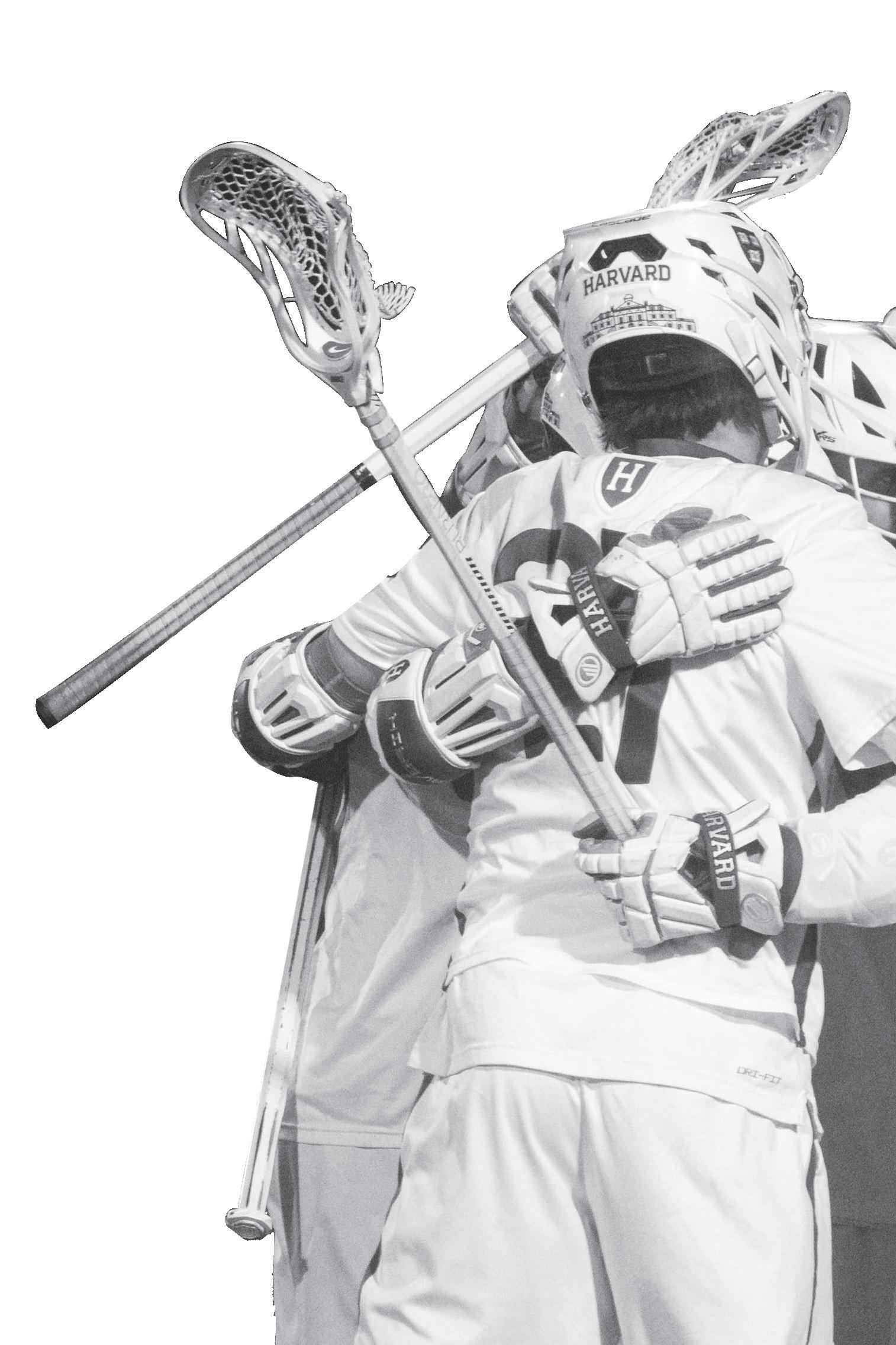
tom-tier Patriot League program who was going to travel home victorious.
The attack spread the Bucknell defense thin, stretching itself outside the fan in an effort to catch the Bison man down unit on a late rotation. The attack slung the ball down low to sophomore attackman
Teddy Malone at the X, and the quick pass
behind the cage caught Bucknell ball-watching. Junior attacker Sam King held his space at the top of the fan as he noticed the Bison defense sag in towards Malone. This created am - ple room for Malone to lob a pass to junior attackman
Sam King, who sent the ball flying past Nolan
with 3:23
seconds left in the half.
“We had a couple of plays and we talked about some of the things we wanted to focus on this week during practice, like spacing, moving the ball, not holding the ball for too long, and I think we all did that,” Malone said. “Our man- up group has been gelling well together, and I think that showed today.”
After some backand-forth play be -
tween the two teams, Harvard came up with a big stop and a successful clear with 40 seconds on the clock. King sent the Crimson into halftime with some much-needed momentum, converting a rebound from a missed shot by Botkiss on the left side of the crease. Botkiss nearly slipped his shot past Nolan, who was unable to retain possession of his save. King read the play beautifully from behind the cage, tracking down the ball as he quickly wrapped around the right side for a flick past the netminder. King was met with a late-hit from Bucknell that sent him flying, and the penalty carried over into the second half, giving the Crimson an advantage as it stormed the field after the break.
“He lit a spark in us, got us going again, and motivated us to see that the game wasn’t over and that no winning play was made yet,” Malone said about Byrne’s halftime speech. “And I think that in that second half we made tons of winning plays that contributed to our victory.”
The attack clawed back two more goals at the top of the third, the first com - ing from an
unassisted take by
Blake.
Sophomore offensive
middie Finn
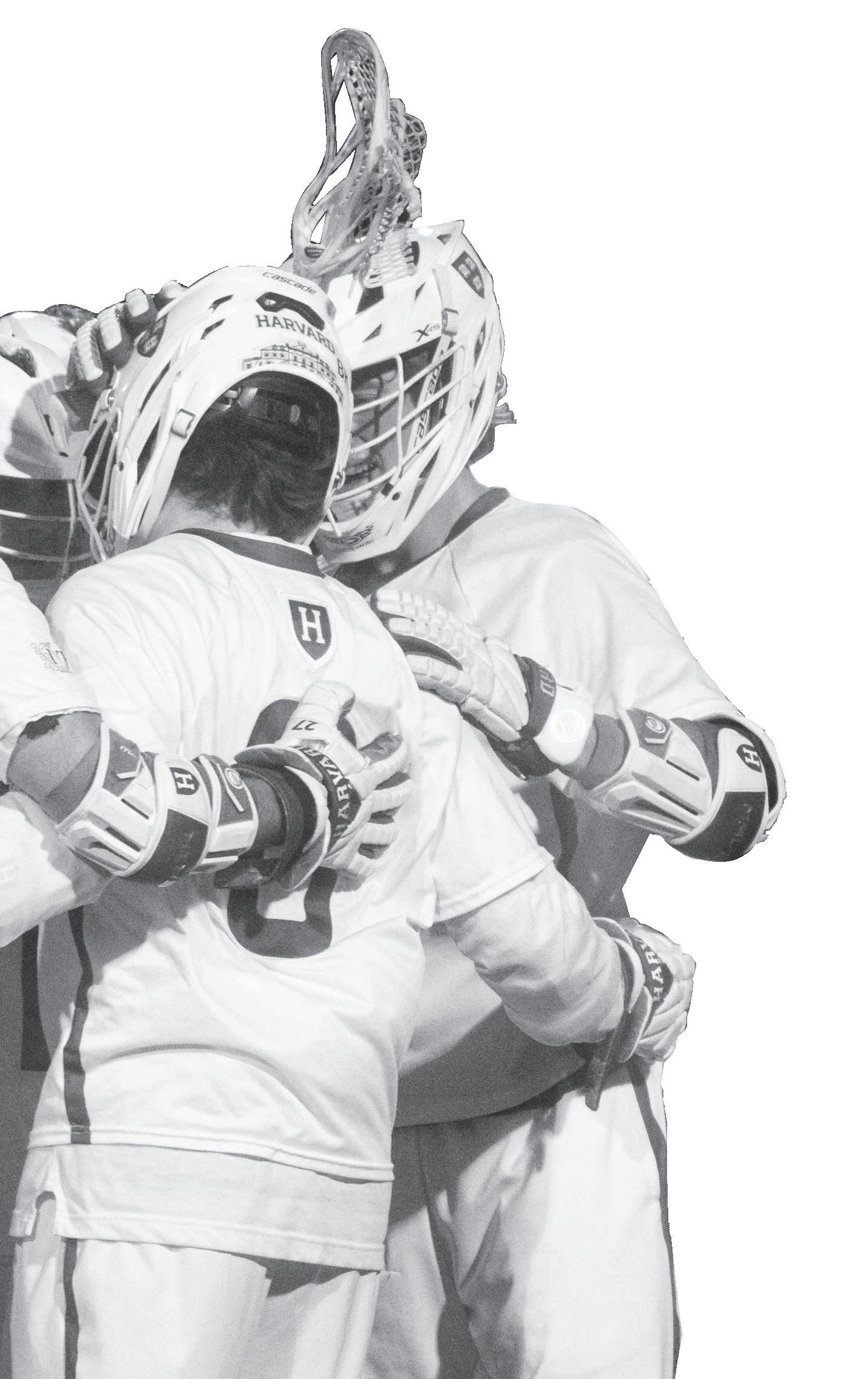
Pokorny found success with a hard dodge down the left alley, sending a lefty bouncer past Nolan to make it a three-goal game. Despite the effort, Bucknell responded in kind, capitalizing on strong takes from Hans Huber and Peter Grandolfo to send the Bison up by five. Malone again came in clutch, shifting the energy with a slippery inside roll dodge that allowed him to get the inside lane on his defender around the right side of the crease before burying the ball past Nolan on the doorstep.
Despite trailing by four after 45 minutes of play, Harvard dominated the fourth quarter, notching more goals during that period than it had in the other three combined. The attack came out with all cylinders firing in the final quarter, and it was Malone who started the scoring effort, striking paydirt less than a minute in. Starting with the ball behind after backing up a narrow miss by King, Malone sent his defender falling to the turf with a shifty roll dodge. With his defender sprawling, Malone ripped a lefty shot past Nolan from the elbow with time and space. The Harvard bench and fans went wild for Malone’s theatrics, and the raucous cheers drowned out the announcer as he broadcasted the tally.
Bucknell retaliated with a quick goal from sophomore middie Will Hopkins, but the Bison were unable to capitalize on the momentum, with Harvard sending four more past Nolan in less than three minutes, tying the game 11-11 with 9:33 on the clock. Botkiss scored the equalizing goal on a shifty face-dodge that allowed him to get underneath his defender for a strategically-placed shot off-stick hip high. The fourth quarter showcased 15 minutes of cohesive, unified, play for the Crimson.
“It’s just taking it with the same attitude at all times. You can’t get frazzled when the game is close and you have to be calm, cool, and collected, and be able to make a play,” Barnard said. “And, fortunately, in the last couple of games we have been able to make one more play than the other team has, and end up with the victory.”
Harvard did not allow a Bucknell goal on a 30-second man-down-play derail its comeback, and after losing the initial faceoff clamp to Bucknell, junior SSDM Ray Dearth used his speed to carry the ball across the midline. The opposing defense was slow to slide to the SSDM, which allowed Dearth to capitalize on their hesitation with a hard righty high-to-high finish from the top of the fan that flew past Nolan a mere 15 seconds after Hopkin’s goal.
Jogging back to the 50 with confidence, DeGennaro secured the clamp and the faceoff unit got the ball down to Malone, who pushed towards the cage. Malone sent his defender to the turf for the second time that afternoon, tripping up his opponent with a slight hesitation as he changed his momentum. The Bison defender fell over his own feet as Malone made a hard stop to look for incoming Harvard cutters from the box. As his defender went down, Malone switched to his left hand to increase his angle before sending a sniper past Nolan’s feet in a high-low finish that put the Crimson in the lead 13-12.
“To come back with six or seven goals, most people haven’t been in games like that. So, it’s unbelievably memorable. When you’re in those games and you can kind of feel the momentum shifting at times and it’s kind of an injection of juice and enthusiasm and momentum into your players,” Byrne said. “And when the game is over you just have this high, and the morale of the team was a reminder that we’re never out of any game.”
Harvard clung to its lead as the clock wound down to zero. Hindsight may be 20/20, but as the team rushed the field to embrace its goalie and celebrate its hardfought victory, it seemed inevitable that it would spend the remainder of its season posting tough performances against the best teams in the nation. In what was ultimately a one-goal game, Byrne’s squad showcased why it deserves the title of Comeback of the Year.
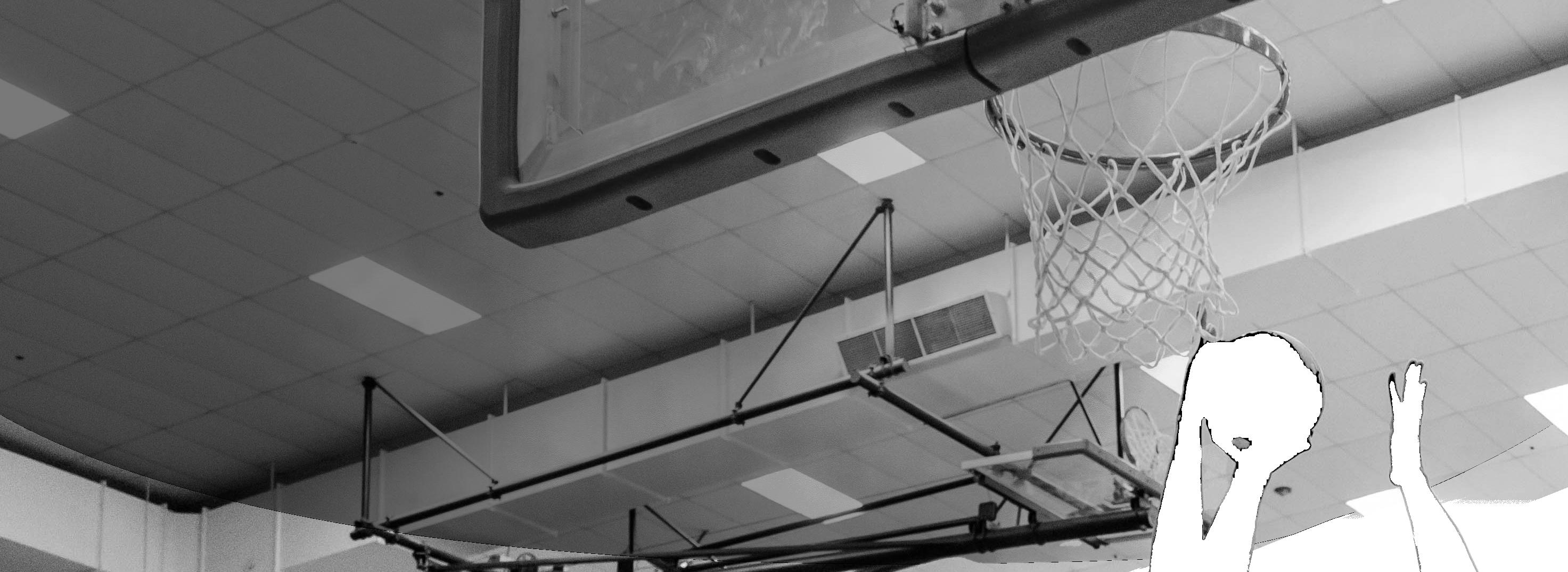 By ALEXANDER K. BELL CRIMSON STAFF WRITER
By ALEXANDER K. BELL CRIMSON STAFF WRITER
The Harvard football team’s loss against nemesis Yale, which resulted in the team having to split the Ivy League title three ways, might seem like an apt choice for the Heartbreak of the Year. But the football team still shared a slice of the conference title. The men’s basketball team wasn’t so lucky, to find hope amid heartbreak. In a game that all but slipped out of its fingers, the team’s overtime loss against the Browns Bears earned the moniker, as it single handedly barred the squad from postseason play.
After battling late into the season for a place in the Ivy League end-of-season tournament, men’s basketball’s postseason hopes came down to a crucial matchup with Brown which would determine control over the fourth and final qualifying spot. Despite starting slowly, the Crimson came back from a 17-point deficit to force overtime against Brown, only to lose 71-68 in a heartbreaker that all but eliminated the Crimson from Ivy League tournament contention.
“It was definitely a tough feeling,” freshman guard Malik Mack reflected. “Everybody’s kind of blue, kind of down. We had a game that next day so it was a quick turnaround, but we kind of felt a little down on
ourselves in that moment because we put so much into it and we gave it our all that night and to come up short was a devastating blow.”
As the clock ran out in overtime, Brown fans rushed onto the court to celebrate, capping off an electric game by shaking the Pizzitola Sports Center, just as they made their presence known with their enthusiasm throughout the evening.
Reflecting on the game after the season, Mack labeled it one of his favorites of the season, due to the intense atmosphere.
“The Brown game was a big game for sure,” Mack said. “I wouldn’t say hostile environment, but definitely something you don’t experience often in the Ivy.”
Harvard battled back from a 58-49 deficit late in the second half to go on a 12-0 run and lead 61-58 with 18 seconds on the clock.
But the Bears’ Kino Lilly Jr. made a clutch three-pointer with just five seconds on the clock to force the game into overtime.
The first and only overtime thriller of the Crimson’s season did not disappoint. Set up from tip-off as a swing-matchup that would determine control of the final spot in the Ivy Madness tournament, Brown’s win over Harvard had it all: physical blocks, fourpoint plays, and a breathless overtime period — all in front of 1,700 vocal Brown fans in Providence.
The game started off with Lilly Jr. having his first three-point attempt of the contest
characteristically blocked by stretching senior forward Justice Ajogbor.
The Bears’ guard was able to gather his own rebound, however, and sank a second-attempt three-pointer to give Brown the first points of the contest.
Points would prove hard to come by in a tense first half, especially for the Crimson, which trailed 11-4 with 10 minutes left in the first half. Mack then started and finished a couple of tough drives to the rim, adding a pair of crafty layups to double Harvard’s point tally and kick start the Crimson.
Brown continued to make life hard for Harvard with its physical play under the rim and aggressive rebounding. The Bears out-rebounded their opponents 23-15 in the first half, including 11 offensive rebounds, making it difficult for the Crimson to close an early gap.
Mack was able to push Harvard within single digits of the Bears before halftime, as the star guard hit a pair of three pointers and two free throws to bring his first-half tally up to 12 points.
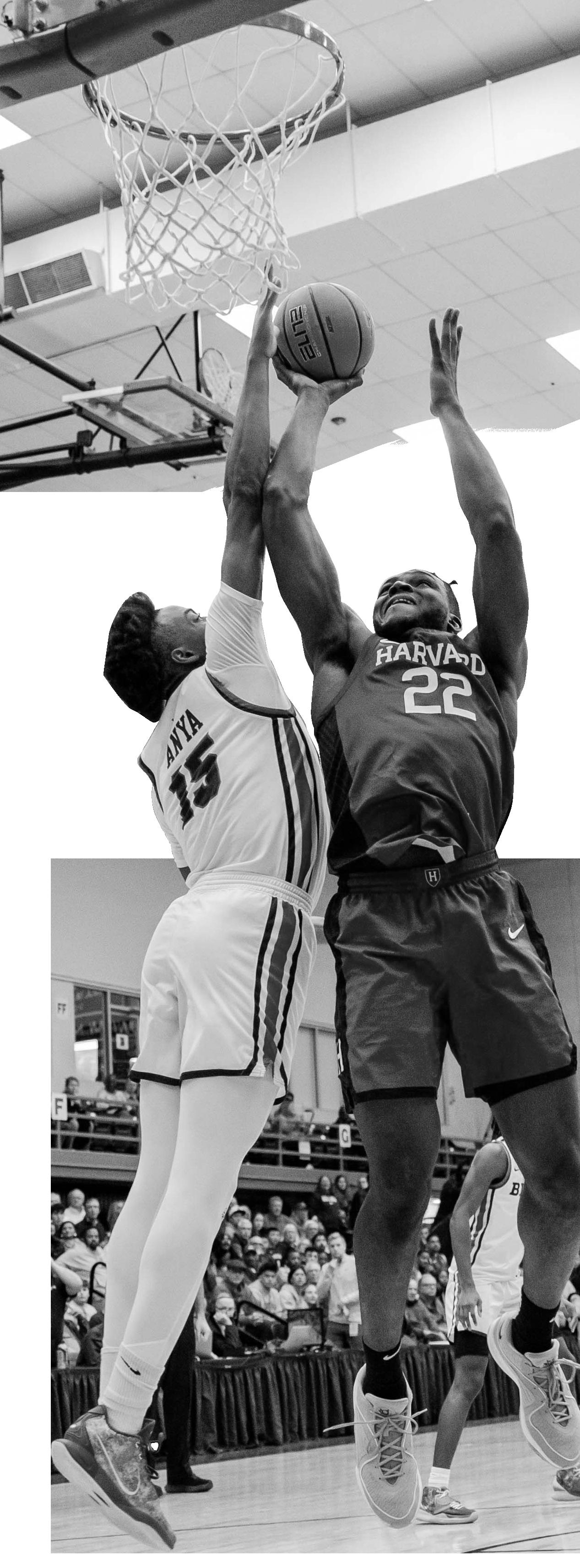

Despite the Crimson’s progress, Brown would get the last action of the first half, as Lilly Jr. easily drove the length of court for a layup to put Brown on top at the break, 28-19.
The second half of the contest showed two teams that were unrecognizable, based on their first half performances. Harvard and Brown had shot a combined 20 percent, 4-of-20, from three point range in the first half. In the second, Harvard knocked down 6-of-9 attempts on 66.7 percent shooting, while Brown followed suit, hitting 5-of-7 for a whopping 71.4 percent mark from behind the arc.
Despite Harvard cutting the deficit to five behind an early triple and a pair of layups from sophomore forward Chisom Okpara, Brown used its newfound shooting form to retake a 17-point lead, 50-33, with 11:15 left in the contest.
Despite ESPN analytics predicting a 99.0 percent win probability for the Bears at that point, it would have been a mistake for Harvard fans to take their eyes off the game.
Still trailing 56-43 and with less than seven minutes on the clock to work with, what happened next would silence the boisterous student section inside Pizzitola Sports Center.
Initiated by a four-point play from junior guard Tyler Simon, the Crimson went on an 18-2 run, with Okpara, Mack, Ajogbor, Simon, and junior guard Louis Lesmond all hitting clutch points to put Harvard up, 61-58, with 18 seconds to play and possession in favor of the Bears.
Despite a Harvard timeout before play resumed, the Crimson was unable to stop a step-back three from Lilly Jr., who leveled the score at 61-61 with five seconds on the clock, forcing overtime in Providence.
Lesmond started the extra period with intent, hitting a three-pointer to put the Crimson back up, 64-61. Harvard quickly lost the advantage, but Ajogbor slammed
home a dunk to enter double-figure points on the night and regain a two-point edge, 66-64.
After failing to connect on a layup and three-point jumpshot, Brown regained possession through a jump-ball, allowing sophomore guard Alexander Lesburt Jr. to hit a dagger three for a 67-66 Bears lead with only 56 left seconds to play.
The Crimson was unable to score on its next two possessions, forcing it to foul and stretch Brown’s lead to 71-66 off of free throws in an attempt to create one last opportunity. Mack put in a layup in the dying seconds of the game, but it was in vain, as the clock hit zero and Brown fans stormed the court, victorious. The final score stood at 71-68.
With the win, not only did the Bears push Harvard out of postseason play, but the Providence squad clinched the head-tohead tiebreaker over the
Crimson, having beaten Harvard earlier in the season in Cambridge. That tiebreaker would not prove relevant, as Brown went on to clinch the fourth seed in the Ivy Madness tournament,
eventually beating preseason favorites Princeton in the semifinals to advance to the Ivy League championship. The Bears were seconds away from clinching a March Madness berth, before being subjected to a heartbreak of their own after conceding a buzzer-beating one-handed floater from Yale’s Matt Knowling that proved to be the game winner. Justin Timberlake put it best: what goes around comes around.
The result was undoubtedly frustrating for the Crimson, as it condemned the team to its third consecutive season
of missing the playoff tournament by fine margins. Next season, the team will look to end that streak, albeit without its leading scorer Mack, who has committed to play for Georgetown next year.
“It was definitely a little disappointing, but as a team, it kind of brought us together as a family you know, just knowing that we gave it all and that we trusted each other that night and sometimes you play your best ball and you don’t win,” Mack said. “That game just brought us together more as a family for sure, even though it was a devastating loss.”
alexander.bell@thecrimson.com
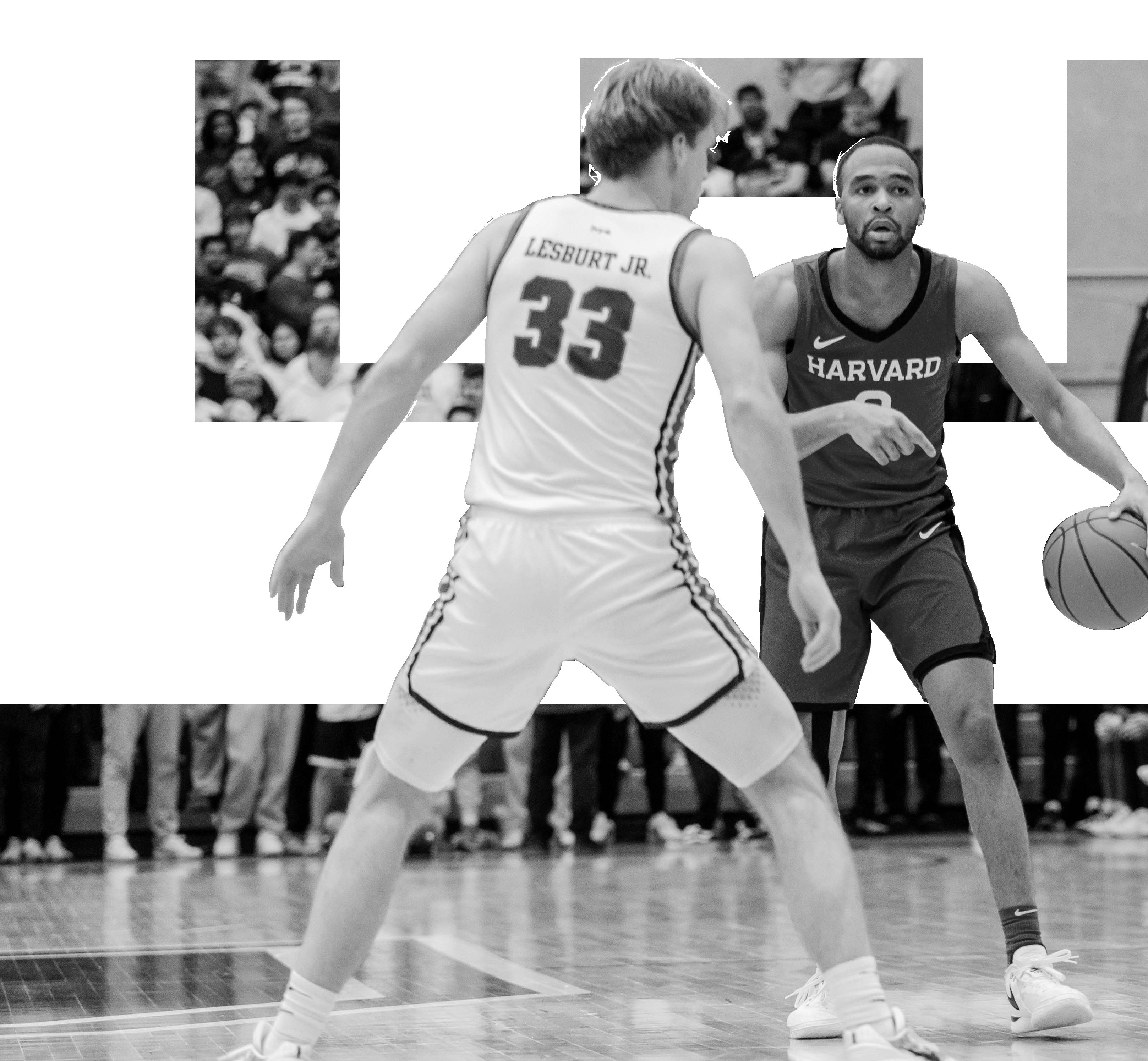
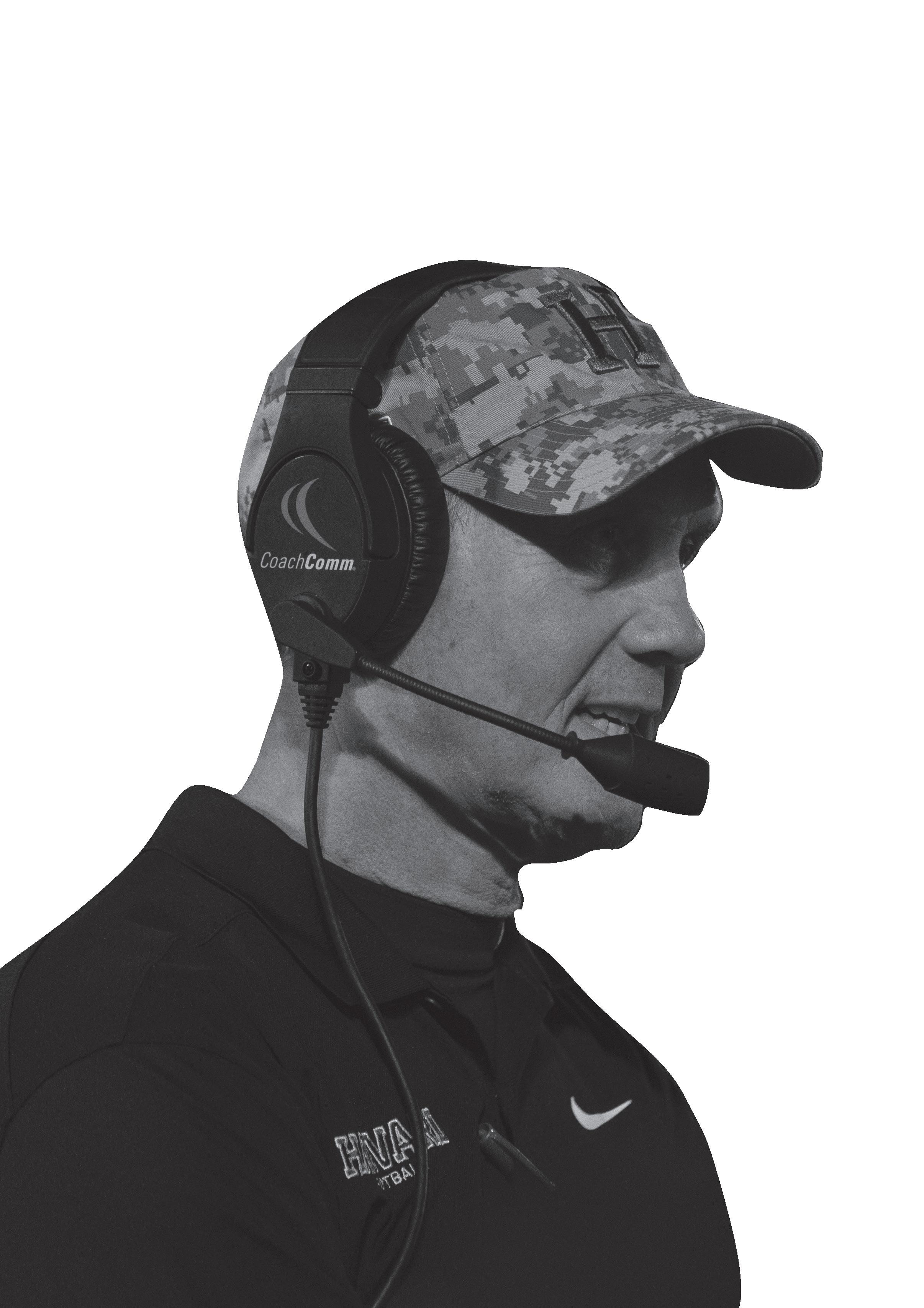
both graduated, forcing junior Charles Deprima, who had never previously attempted a pass in college, into the starting role. Junior running back Shane McLaughlin — despite breaking out with two scores in a 41-25 victory over Howard on Oct. 16, 2022 — was relatively unknown after Aaron Shampklin ’21 and Aidan Borguet ’23 delivered sustained brilliance over the previous three seasons. Kym Wimberly ’22, the leading receiver on the 2021 and 2022 teams, also left, transferring to Delaware for his fifth year of eligibility.
Ivy League football analysts were skeptical. In the conference’s annual poll of 16 media members, Harvard was projected to finish fourth, garnering just one first-place vote and lagging behind Yale, Princeton, and UPenn. Media members accurately assessed the former’s talent, but underestimated Dartmouth and Harvard, as the Bulldogs and the Big Green ultimately shared the title with the Crimson in the fifth three-way split of the Ancient Eight crown since conference play began in 1956. It didn’t take long for Murphy’s Crimson to prove how overlooked it was. In particular, Murphy highlighted a 38-28 victory at No. 6 Holy Cross on Sept. 30, 2023 as the moment when he realized he had a championship-caliber team on his hands.
The Crusaders had made it all the way to the FCS national quarterfinals the season prior before falling to South Dakota State on the road, and they returned a strong team in 2023. They were 2-1 going into the evening matchup at Worcester’s Polar Park.
reps in 2021 and 2022 —
At that point, Harvard stood at 2-0 after a convincing home win over St. Thomas and a nail-biting shootout victory over Brown, 34-31. Deprima had gotten off to a hot start to the season, notching a pair of 100-yard rushing games. But the Bears finished just 5-5 and the Tommies were still finding their
stride; Holy Cross would be a different caliber of opponent.
“If we don’t beat Holy Cross, they go to the playoffs again,” Murphy said. “That was a big win. They’ve done a great job with their program. It’s obviously a scholarship program, and I felt the way our guys stepped up across the board — offense, defense, special teams, coaches did a great job coaching our kids up — that was a terrific win.”
Beating the Crusaders put the Crimson on the map, as it vaulted from No. 24 to No. 19/21 in the FCS rankings. From there, Harvard continued to roll, recording comfortable wins over both Cornell and Howard. It was reminiscent of the 2021 season, when the Crimson won each of its first five games before losing in controversial, heartbreaking fashion at Princeton and following it up with a tight defeat to Dartmouth — ultimately falling one game short of the conference championship.
For the Crimson, lightning appeared to strike twice, and painfully so. The Tigers snapped Harvard’s winning streak on Oct. 21 and sent the visitors back to Cambridge reeling after the vaunted rushing attack put up a poor performance in a 21-14 loss.
But, thanks partially to Murphy, its fortunes soon reversed.
After Deprima struggled in the first quarter of a 17-9 victory over Dartmouth, throwing an interception on the opening drive, the Head Coach ran a mid-game quarterback competition between his incumbent starter and Craig, inserting the relatively untested signal-caller into the lineup the following drive. Craig decisively won the battle, notching 36 rushing yards and two scores in a gritty effort that staved off the déjà vu from 2021. Putting in an unproven sophomore during one of the biggest games of the season wasn’t a decision that was popular among the coaching staff.
“Having to make the change in-game to change quarterbacks [was] something that was not necessarily everything the staff wanted,” he explained. “It was a head coach decision. I’m not sure that our coaches felt comfortable with it, but that’s what we’re paid to do. That’s an experience thing.”
Ultimately, it proved to be the right one.
Craig — who served as the fourth-string quarterback just one season earlier — led Harvard to consecutive victories over Columbia and the Quakers, throwing for more than 250 yards, completing over 60 percent of his passes, and recording both passing and rushing touchdowns in each one. Murphy raved about the leadership capabilities of both Craig and Deprima, who took his benching in stride.
“When you’ve got a great kid at quarterback that suddenly is not the quarterback, and him still being able to lead the team and him still being able to go out there and compete every day, that’s not a given at that position,” Murphy said of Deprima.
“I thought both our quarterbacks did a great job of being leaders, being respectful to the decisions that I made, and making the best of the opportunities,” he added.
Murphy’s personnel decisions, the leadership of Deprima, Craig, and captain Nate Leskovec, and the tenacity of every player on the roster meant that — despite being forced to
championship that made it the tenth championship for our team during that era, I couldn’t really have asked for more.”
As he has typically done throughout his career, Murphy deflected most of the praise for Harvard’s brilliant 2023 season to his players and staff. In particular, he credited defensive coordinator Scott A. Larkee ’99 and defensive backs coach Ryan Crawford for helping to keep an inexperienced unit steady. Under Larkee and Crawford’s tutelage, the Crimson ultimately finished ninth nationally in Team Passing Efficiency Defense, a composite stat that takes several variables into account. It also registered more interceptions, 13, than touchdowns allowed, 12.
“It takes a village, and we certainly had a great village,” Murphy said. “[I’m] really pleased with how our staff and our kids evolved through the season.”
Ultimately, the 2023 season bolstered Murphy’s already-strong case as the greatest football coach in Ivy League history. He finished with 200 total victories for Harvard, 141
tury; the only year in which it failed to do so was 2019.
“I’m very grateful for the recognition,” Murphy said, when presented with the Greatest of All Time label. “I never woke up everyday thinking I was the best at anything. I was the first and only one in my family to go to college. I was surrounding myself with great friends who were pretty humble people. I think that we put together the greatest teams to allow ourselves to have that record. I don’t think it was because of me.”
griffin.wong@thecrimson.com
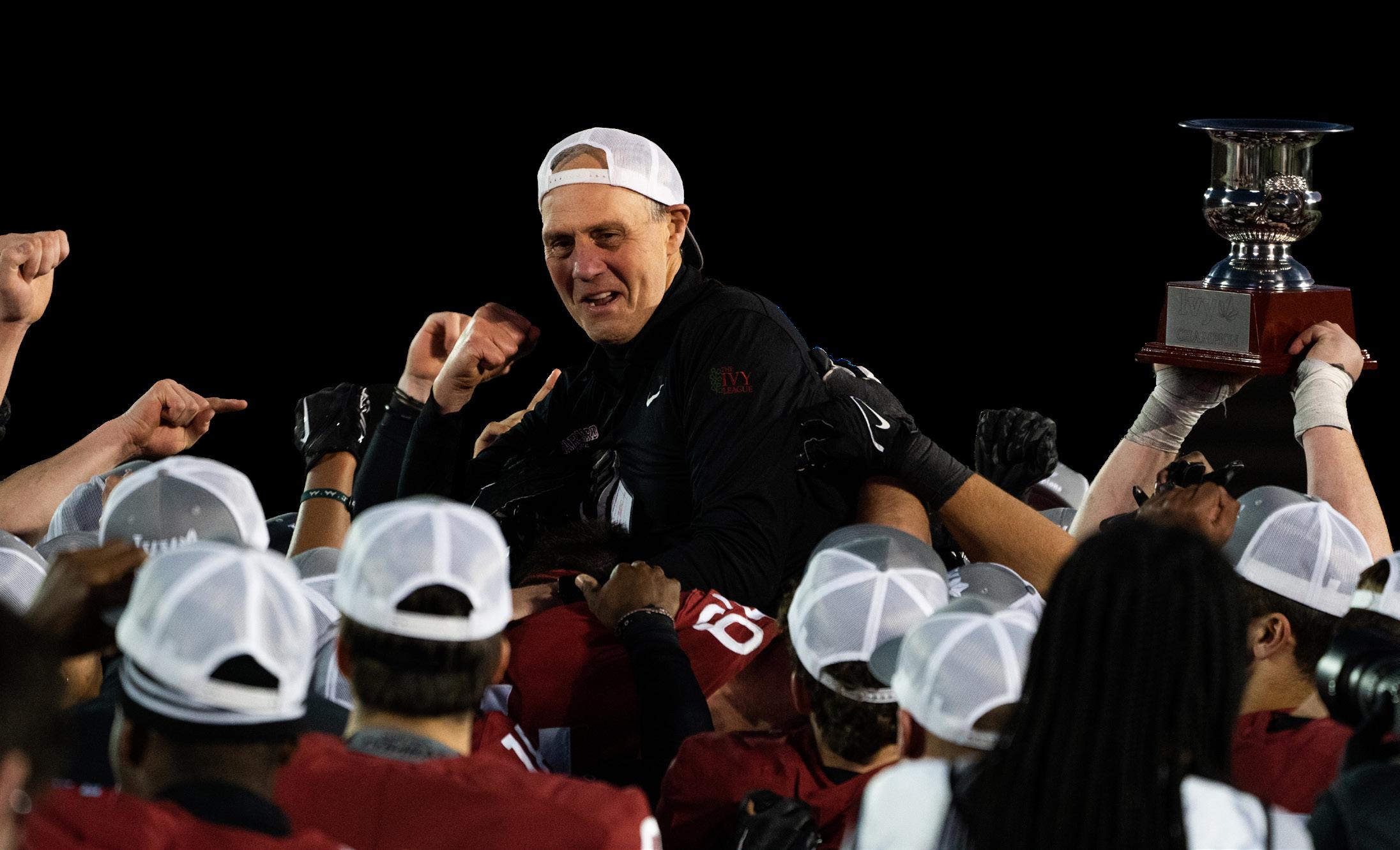
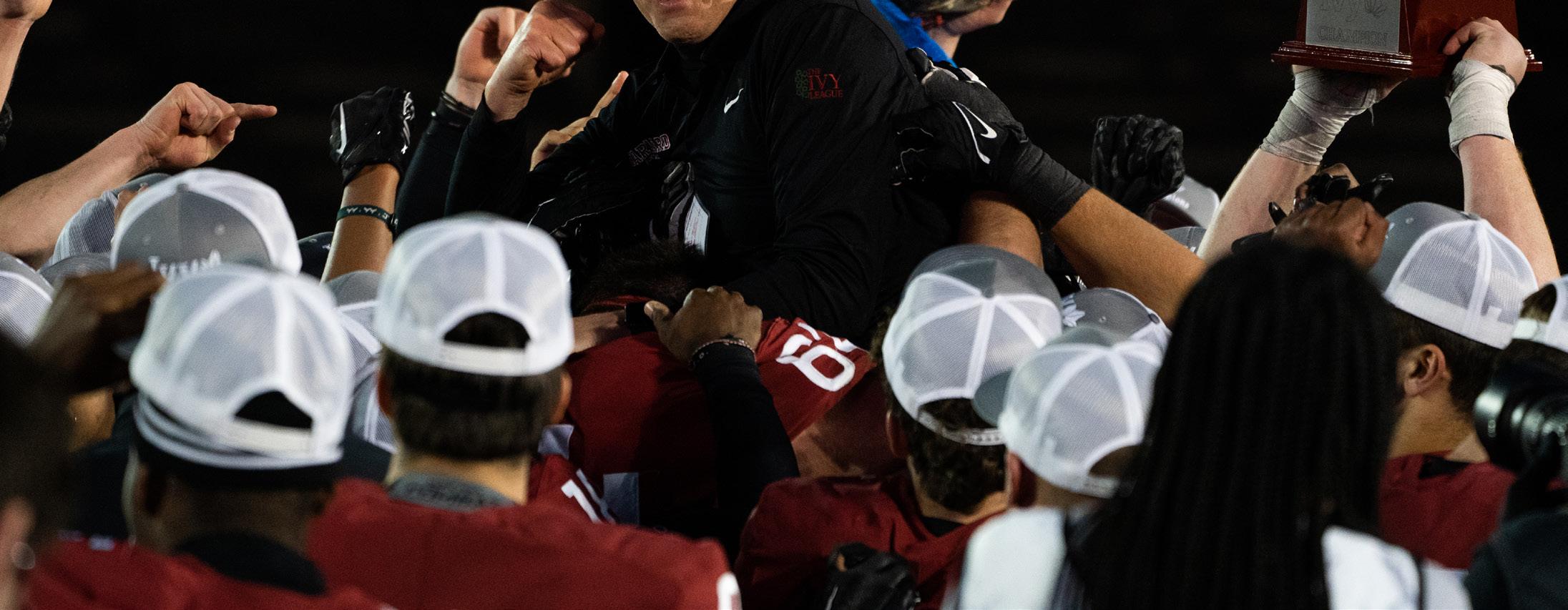
Although I am not a student-athlete myself, I have had the privilege of documenting the incredible athletes across 42 Division I sports at Harvard from my favorite place: the s idelines. As a sports photographer, I have witnessed the demanding hours, commitment, talent, and passion required to play on a sports team at Harvard. These athletes excel not only in their sports, but also in managing a rigorous academic and extracurricular schedule. They deserve to be celebrated.
For the third year at Harvard and the fourth year overall (as this project began during my senior year of high school), I present From the Sidelines: a photo essay celebrating graduating senior athletes at the top of their game. Over the spring 2024 semester, I reached out to coaches from every athletic team, asking for the name of one senior athlete who deserved recognition and embodied the morals, passion, talent, and drive of their team. I subsequently conducted individual photoshoots with the chosen athletes to highlight their dedication to both Harvard and their sport.
From the Sidelines commemorates these exceptional graduates and serves as a visual representation of the perfect vantage point I’ve been lucky to inhabit. These athletes have profoundly impacted not only Harvard but also my own journey, inspiring me to pursue my dream of making the sidelines my forever home. While they strive to stay off the bench, I’ve found my passion right beside it.
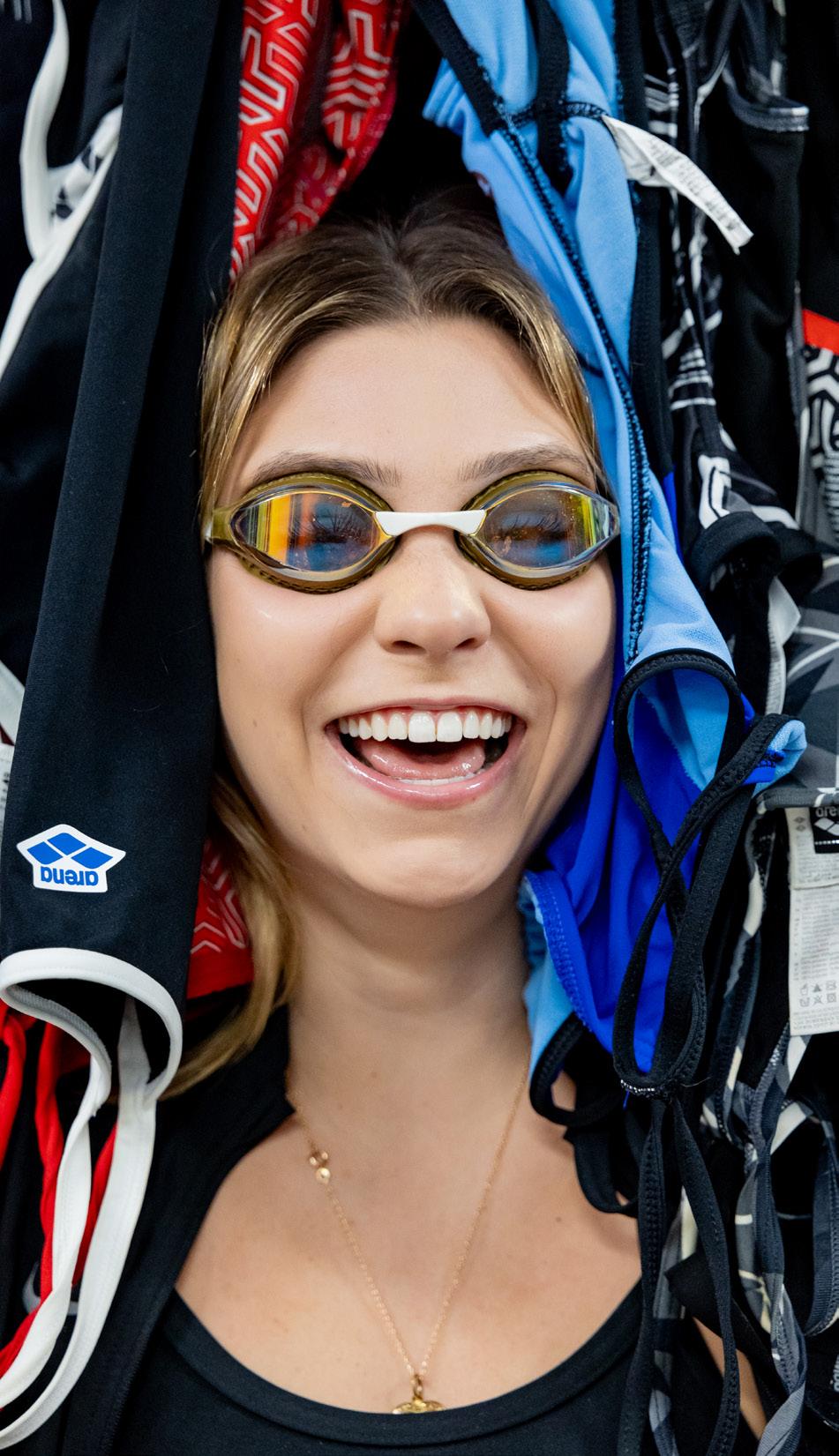

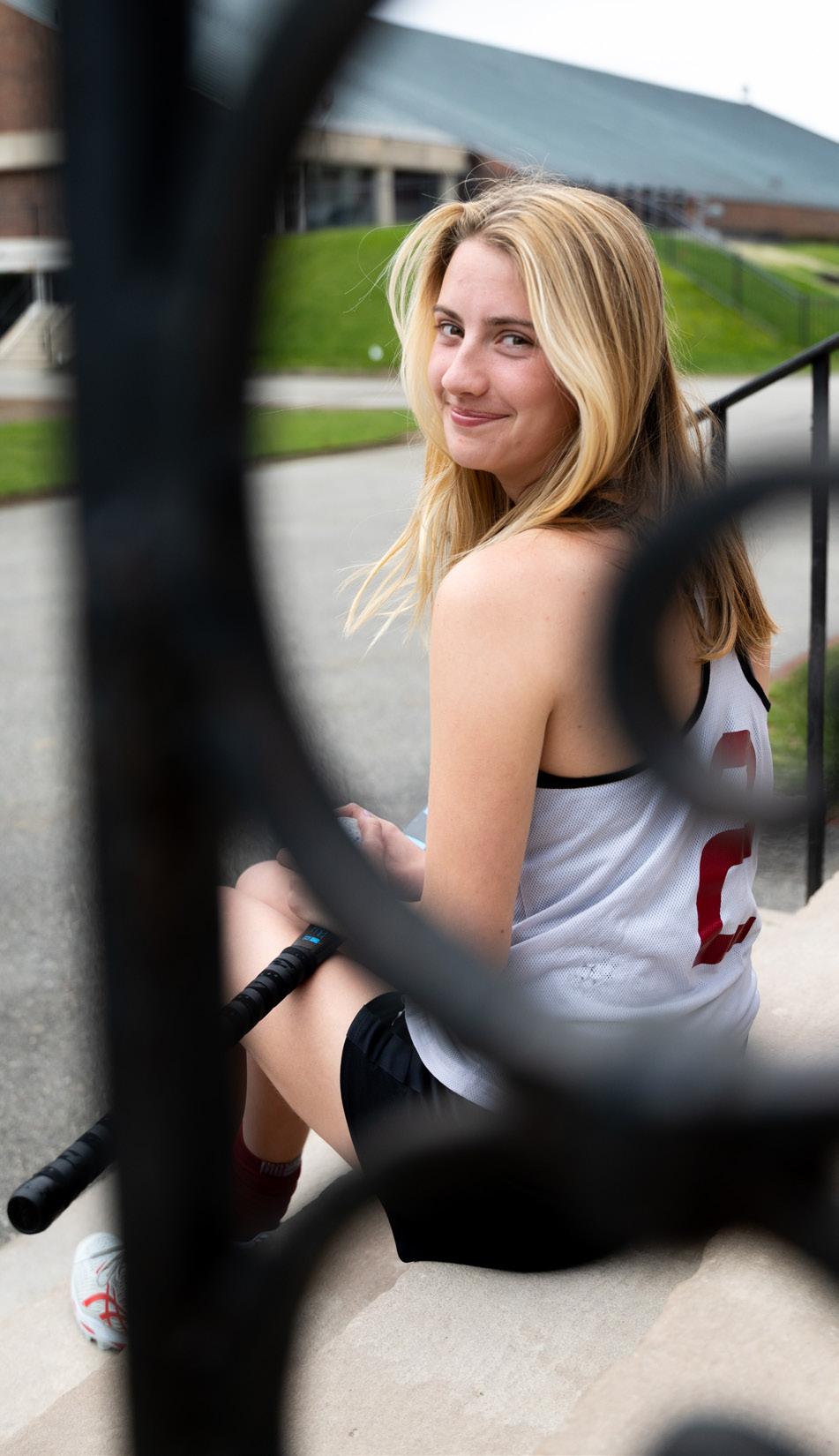
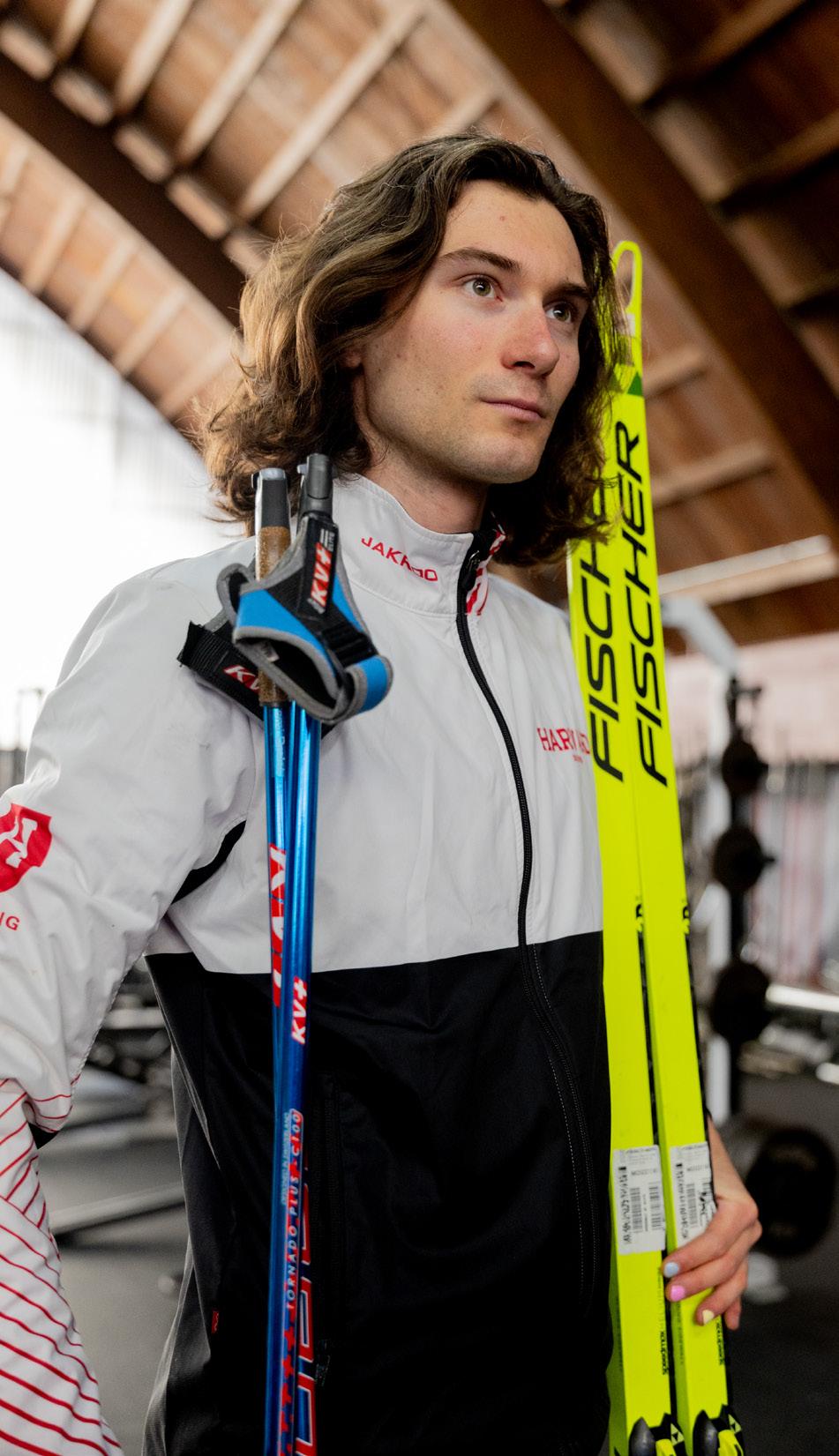
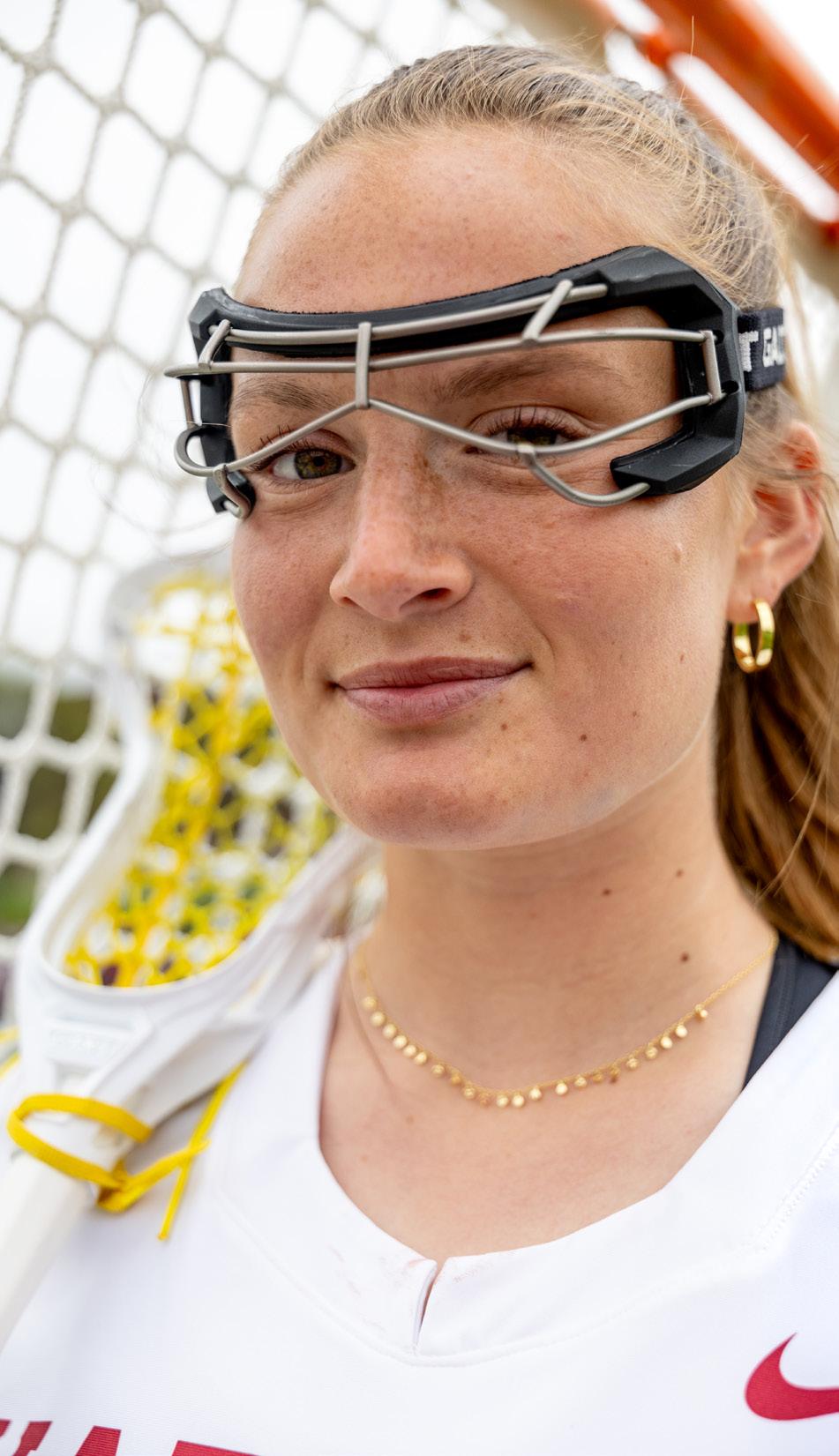
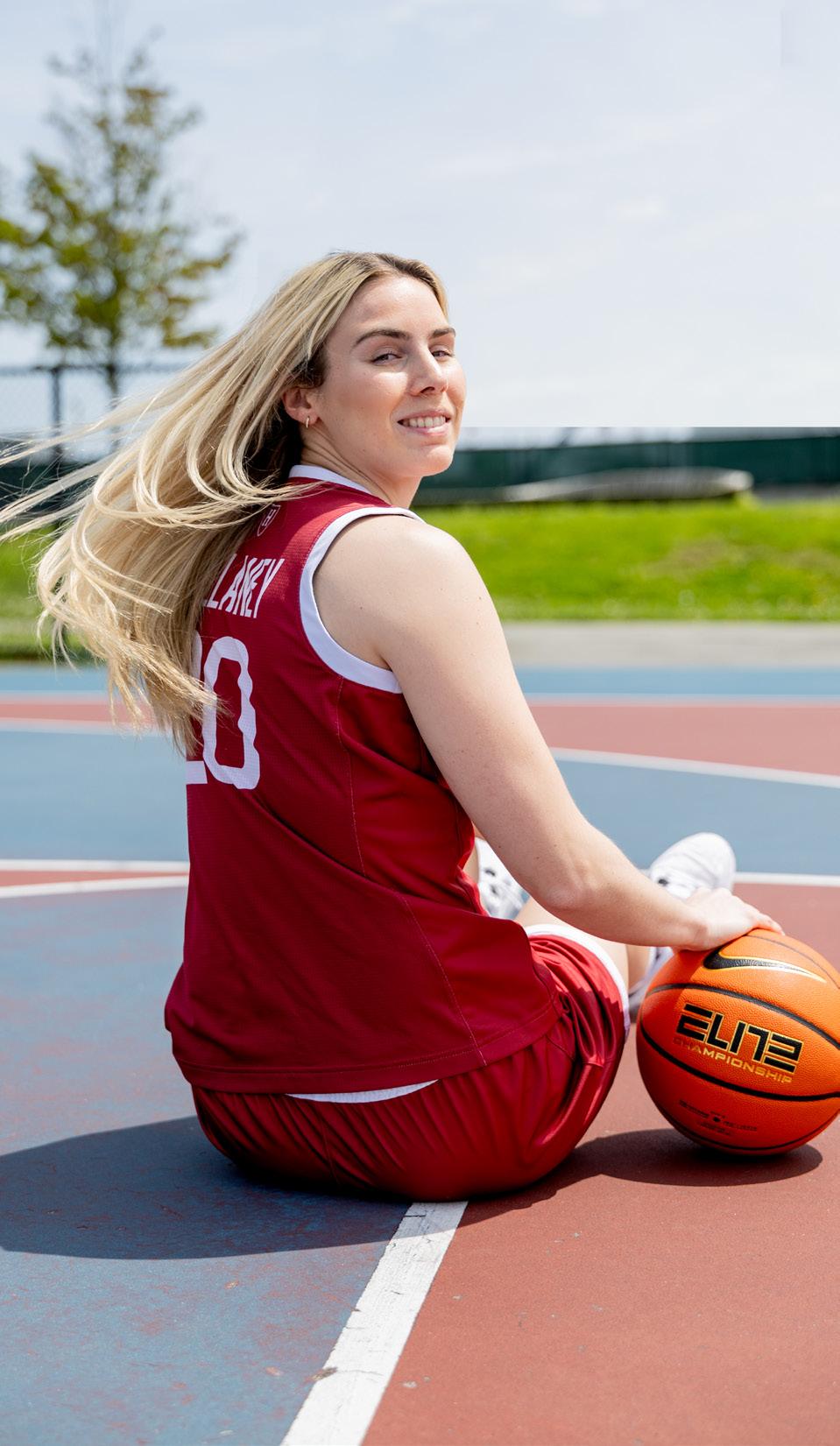
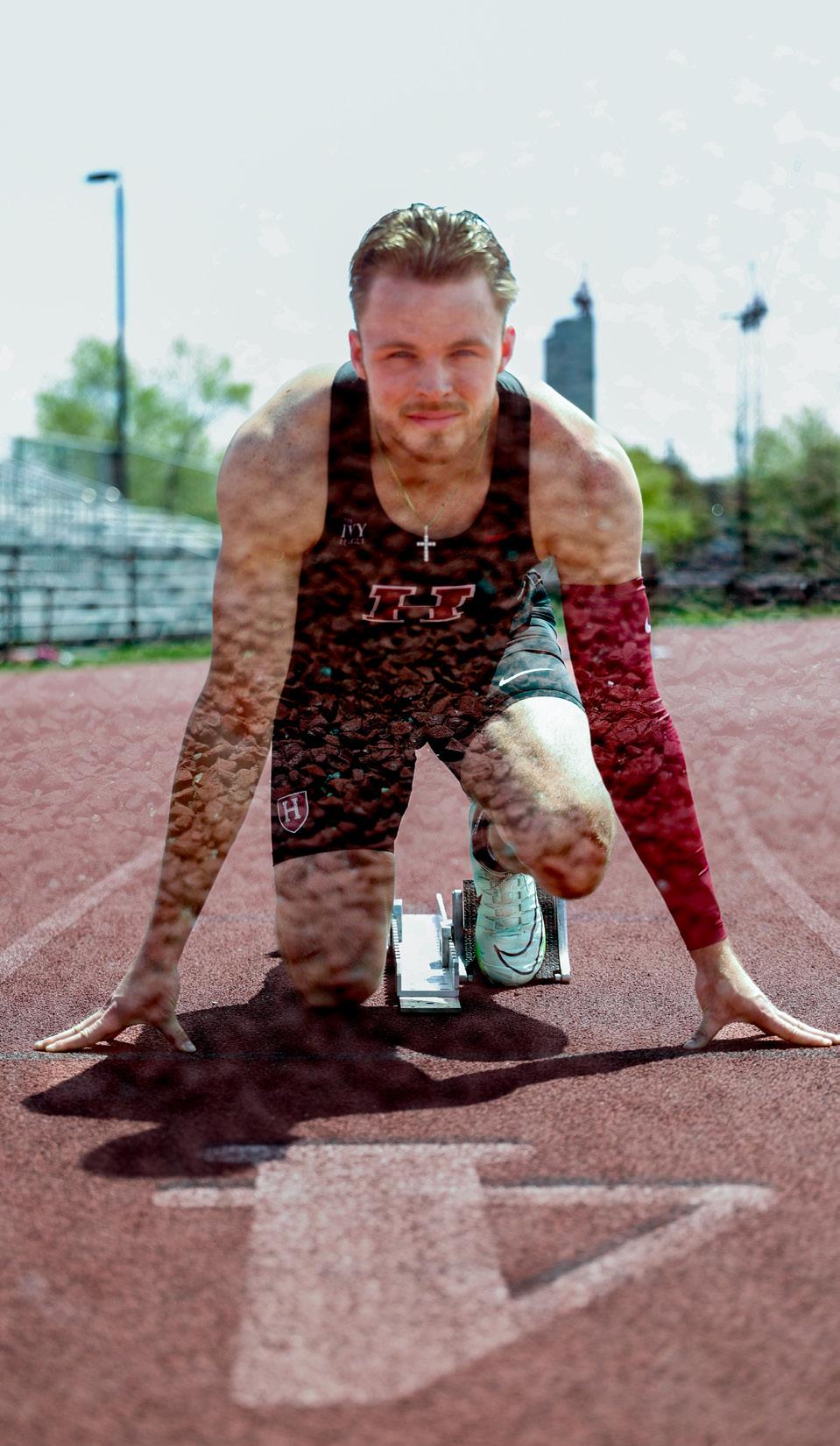

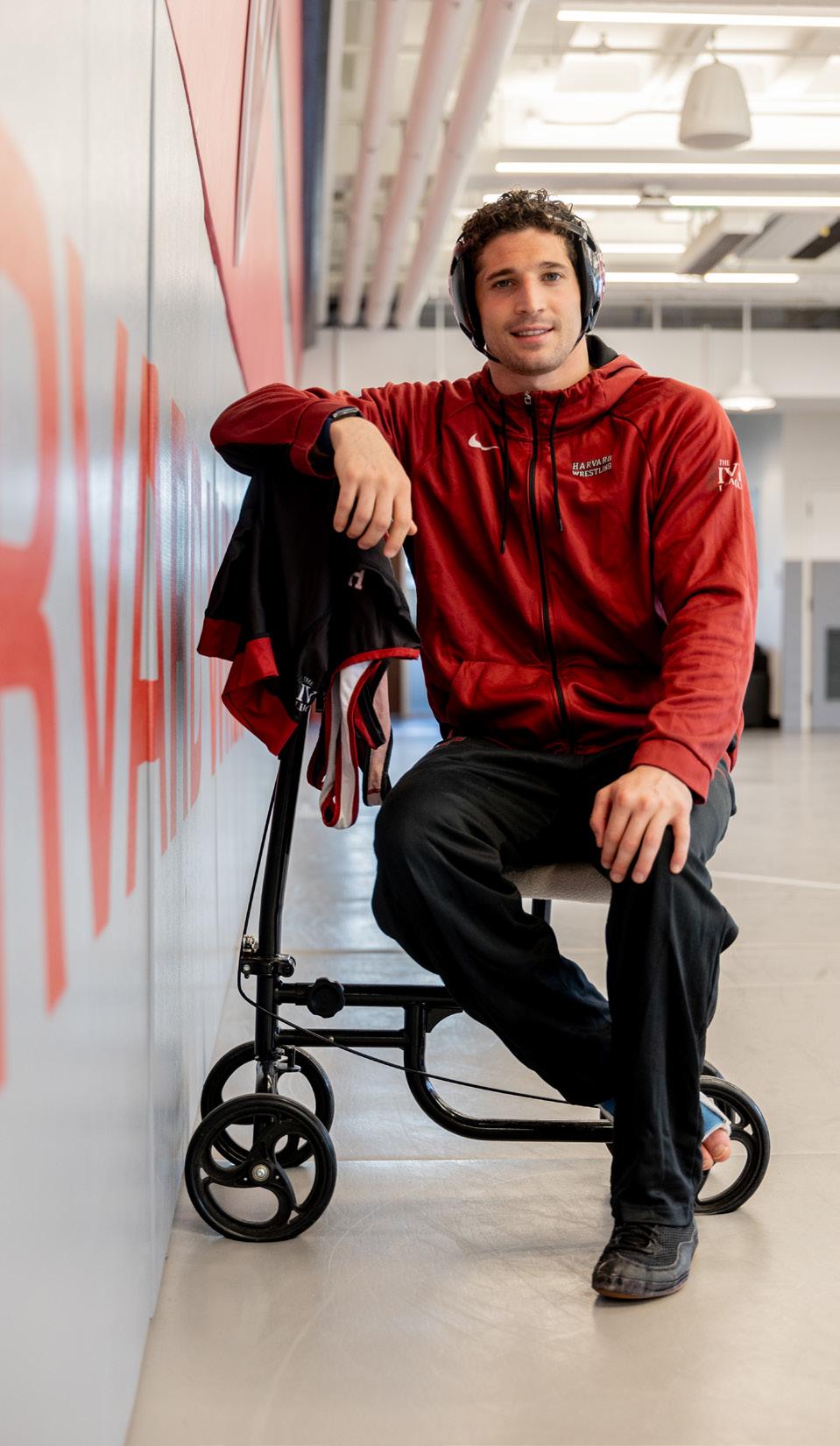
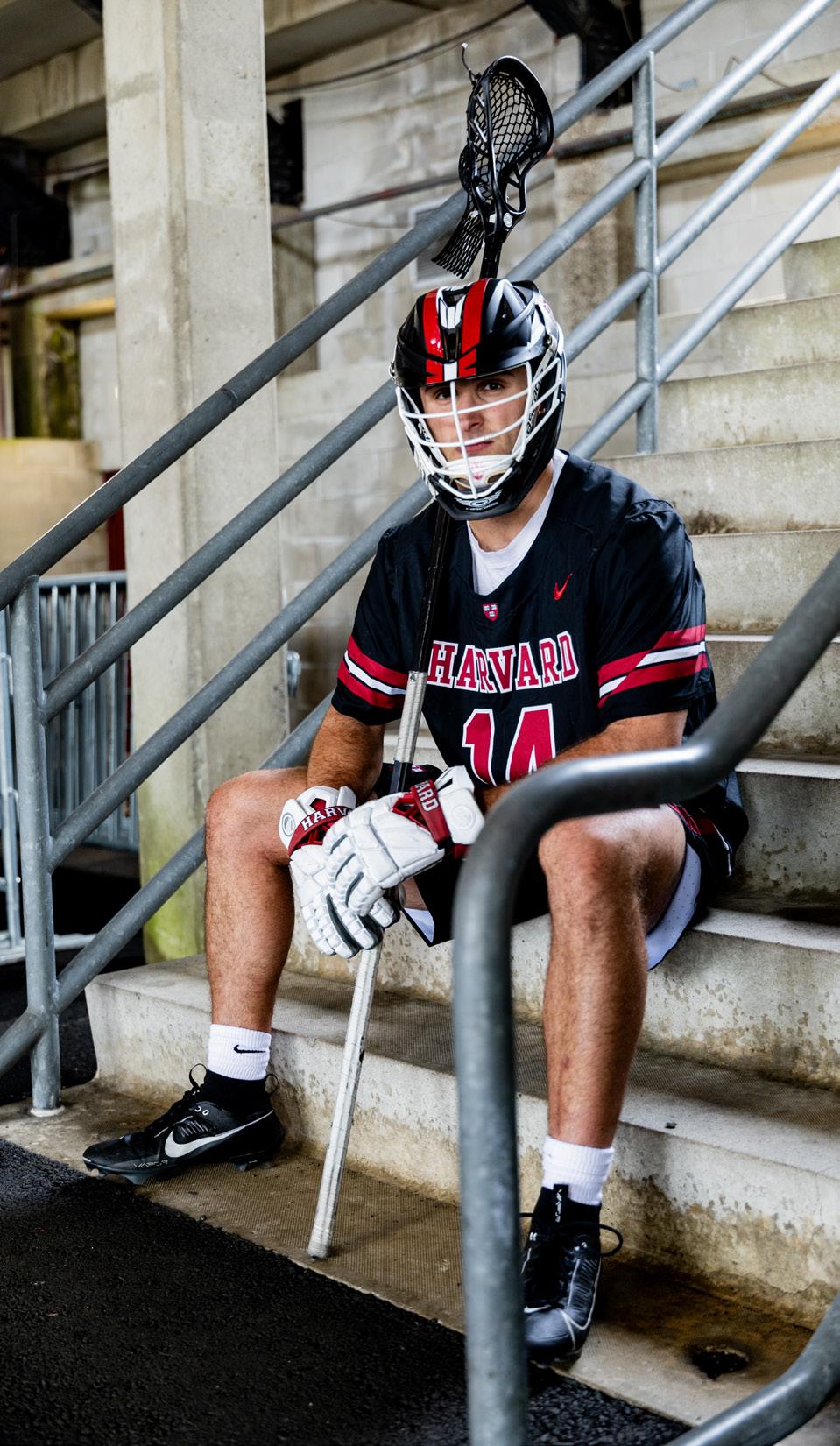
In a year of sports brimming with standout performances and break out stars, it’s not easy to coin a single contest as “Game of the Year.” Howev er, the story of a retiring Head Coach clinching his 10th Ivy League championship in thrilling fashion deserves all the flowers. In his last win as Head Coach, Crimson legend Tim Murphy led Harvard’s football team, which hadn’t won an Ivy League title since 2015, to a nail-biting 25-23 triple-over time victory over UPenn. In a game set to be an instant classic, the Crimson stuck to gether as a team and battled valiantly for the league crown.
Entering the game, Harvard was 4-1 in Ivy play, with the team’s only loss on the road coming from a nail-biter against Princeton. In the first quarter, the Quakers pounced on the Crimson’s thinner run defense and jumped out to a quick 7-0 lead via a 29-yard rushing touchdown. Harvard’s offense quickly countered and sped down the field in only six plays, culminating in a three-yard rushing touchdown from sophomore start ing quarterback Jaden Craig that evened the score at 7-7.
Entering the second quarter, both teams stagnated on the offensive side of the field, with four straight punts. Finally, with 11:43 left in the second quarter, UPenn connected on a 43-yard field goal to put the Quakers ahead 10-7. Like in the first quarter, Harvard’s offense responded immediately and effectively.
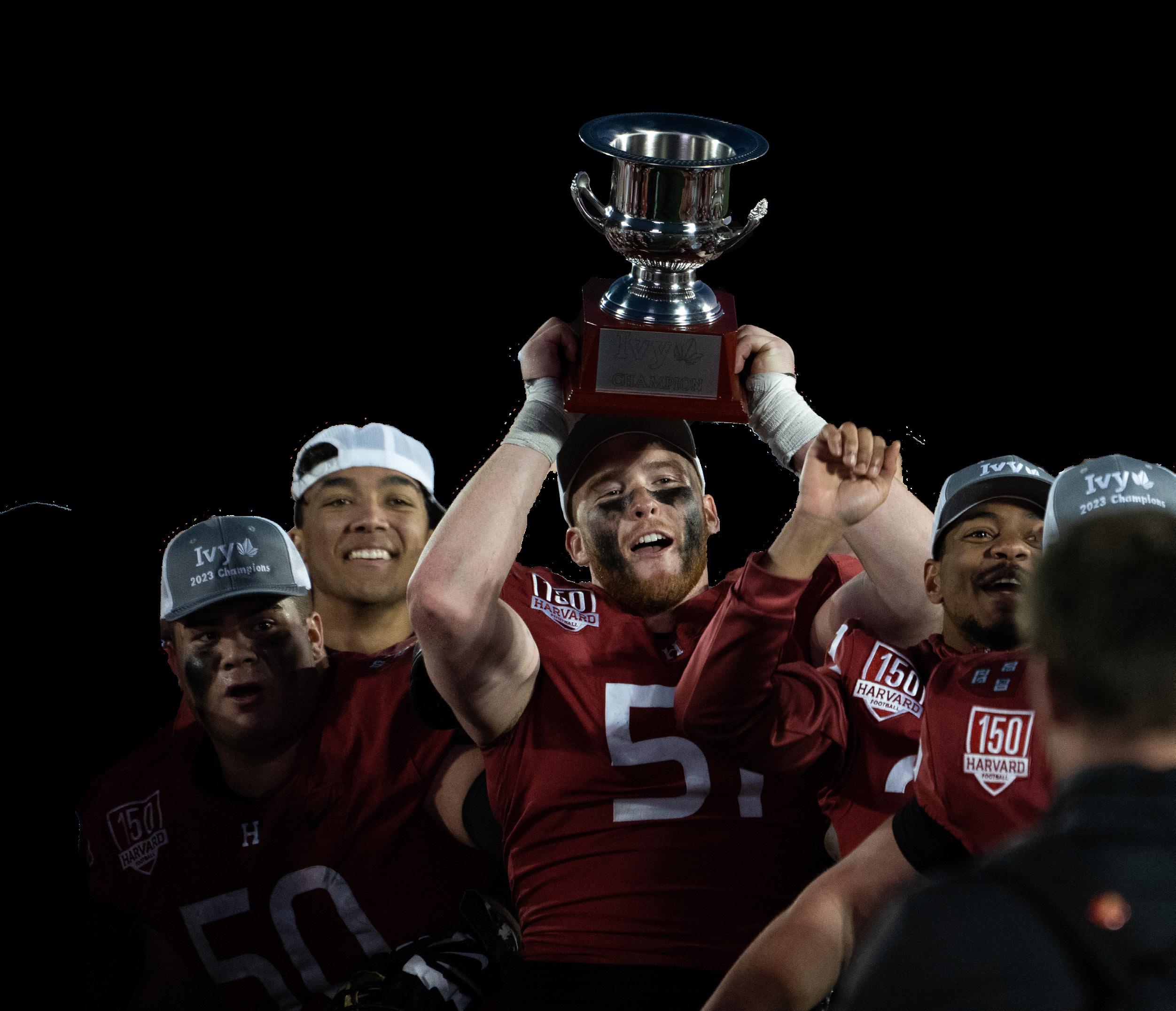
“Our backs are kind of against the wall, just because a lot of people are counting us out. Among this group of girls, that only makes us motivated to work harder.”
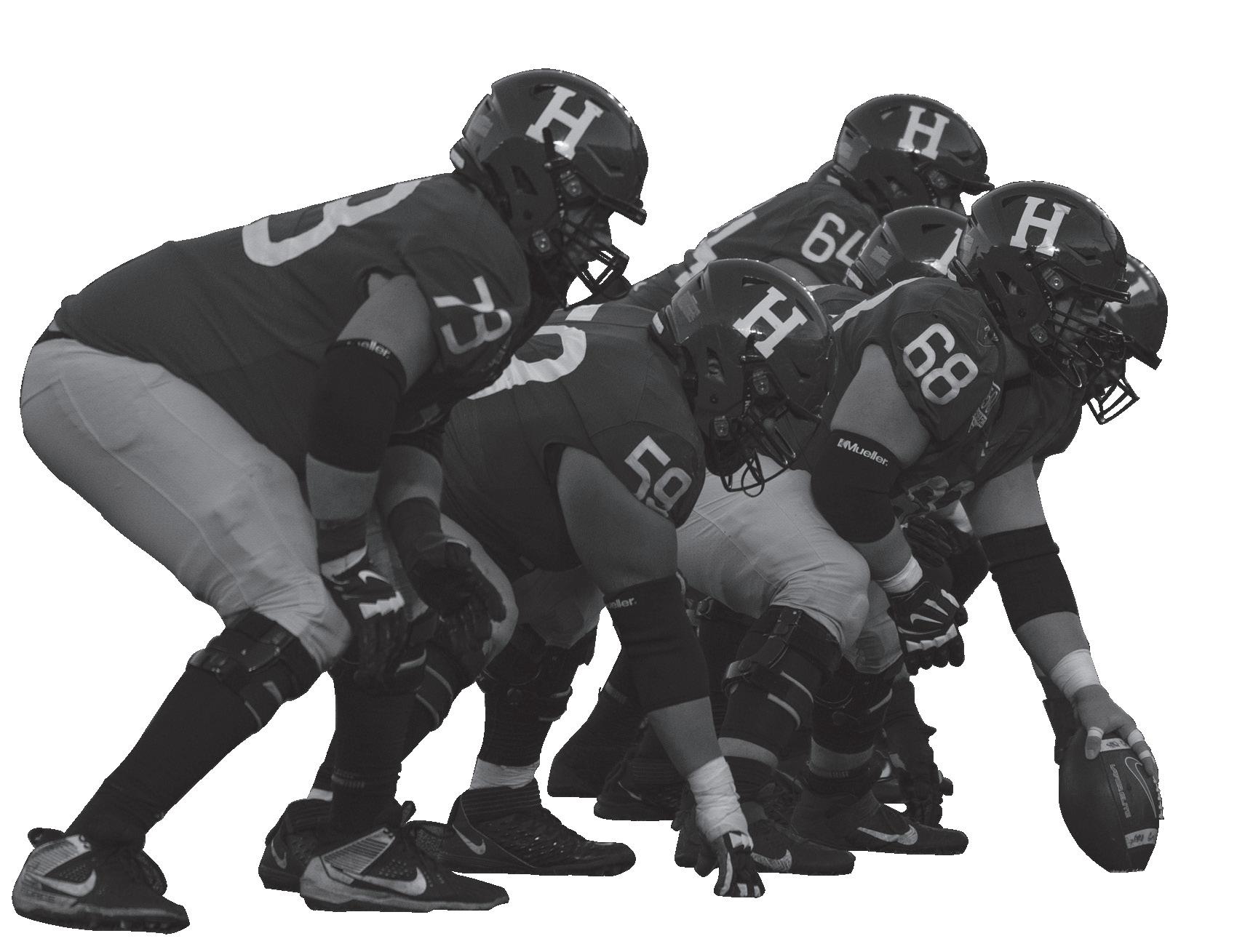
ment.”
Harvard had a prime opportunity to put the game away late in the fourth quarter. A 19-play, 69-yard drive that ate nearly nine minutes of clock-time resulted in a 30-yard field goal attempt with 2:15 left in regulation. But senior kicker Cali Canaval missed the kick, giving the Quakers their first opportunity to take the lead and spoil the conference title chance for the Crimson. A nine-play, 55-yard drive from UPenn gave it a 59-yard field goal attempt as time expired in regulation. Fortunately for the Crimson, the kick was blocked and the two teams headed into overtime.
There’s few sporting situations quite like college football overtime, an emotional roller coaster that ESPN has aptly described as an “anything-you-can-do-I-cando-better” contest. Each team receives at least one chance to score — removing the oft-criticized arbitrariness of NFL-style sudden death — and has the chance to start its drive at the other team’s 25-yard line. The exchange could theoretically extend into perpetuity, but the tension rises in each new period: in the second overtime, teams that score a touchdown must attempt a twopoint conversion. If the score is still knotted after that, each successive overtime period consists of the teams attempting two-point
attempts until one side cracks.
In the first overtime period, each team delivered, but barely. Both offenses settled for field goals to put the score at 23-23. Neither team was able to convert in the second overtime period, though UPenn had a golden opportunity to end the game: after Craig threw an interception at the UPenn 10-yard line, all the Quakers needed to do was put points on the board, and the game would be theirs. But kicker Graham Gotlieb’s 36-yard field goal attempt hooked left. Gotlieb put his hands to his helmet, flummoxed at the football’s cruel path through the air.
With tensions mounting and the third overtime about to begin, both teams knew that the first team to score would likely win the crucial conference matchup. “You know, in situations like that football really becomes a game of inches,” Locnikar explained. “One mistake and you lose everything you worked for, for the whole year. I think we just prepared the best that we could, and luck was on our side.”
At this point, the format shifted to only two-point conversion attempts, changing the landscape of each possession. One poor attempt, and the story of the entire Harvard season could change. On Penn’s two-point conversion, junior defensive back Gavin Shipman came up with a clutch pass block in the end zone. On its own attempt, Murphy and the Crimson did something unexpected. It was as gutsy as the “Statue of Liber -
ty” play that won Boise State the 2007 Fiesta Bowl and as smooth as the “Philly Special.” Craig handed the ball off to junior wideout Scott Woods II, who then tossed the ball to Barkate on the reverse. The defense’s focus had completely shifted off the dual-threat quarterback, but he was still in motion, stopping for just a moment and then streaking toward the right corner of the end zone. Throwing off his back foot and with a UPenn pass-rusher in his face, Barkate tossed a rainbow to Craig in the endzone to seal the 25-23 victory and the Ivy League championship for the Crimson.
The trick play was a surprise to many. Barkate, instrumental in its execution, said, “We have a couple two-point conversion plays designed. I was a little surprised when I heard the call on the sideline. We were ready, but I was honestly a little surprised. Grateful that we called it and grateful that I could make the play.”
After the play, players stormed the field to celebrate their first title in eight years. For athletes, fans, and coaches alike, the game became a core part of their Harvard experience. For the team members who had been on the roster in 2021 — when a controversial quintuple-overtime loss against Princeton denied the team a chance at the Ivy League title — the victory felt karmic.
“For me, it was probably the most surreal moment that I’ve had as a Har vard football team member,” Locnikar said. “With the 2021 season, the Princeton steal, that game unfortunately stripped us of our rightful Ivy League title. So go ing into 2022 and onwards, we worked hard, and it was just great to be with the team. But I think this past year, especially with that crazy ending to the Penn game, just nothing felt more surreal to that. So it was just awesome. I’ll never forget the last mo ment with the trick play. It was just elec tric. We all rushed the field and with all the teammates together. I couldn’t be happier.”
While Harvard closed out the Murphy era in spectacular fashion, the program is ready to turn over a new leaf as newly-appointed Head
Coach Andrew Aurich takes over. On the future of the program, Barkate said, “I think that the passing of the torch has been subtle, but definitely a good thing for the program. He’s the man for the job and he’ll do great things for the program. The game plans will probably be relatively similar to last year, but it could have some changes. We’re expecting similar things though, for the most part.”
Locnikar echoed the continuity in the locker room, even after such a thrilling season. “With any transition, things were tough at the beginning, but I can say that I’m just thrilled to be a part of this team. I think we have the best coaches in the whole country. And I’m just happy to represent them every day.”
Every victory builds confidence, but some build more than others. As the team begins a new era in September, its triumph over UPenn will surely be front-of-mind.
“It’s really just a blessing to be part of this program and to keep working for what we need next year, which is an undisputed Ivy League Championship,” Locnikar said. “I think it’s in our reach, and we’re gonna get it.”
praveen.kumar@thecrimson.com jack.silvers@thecrimson.com
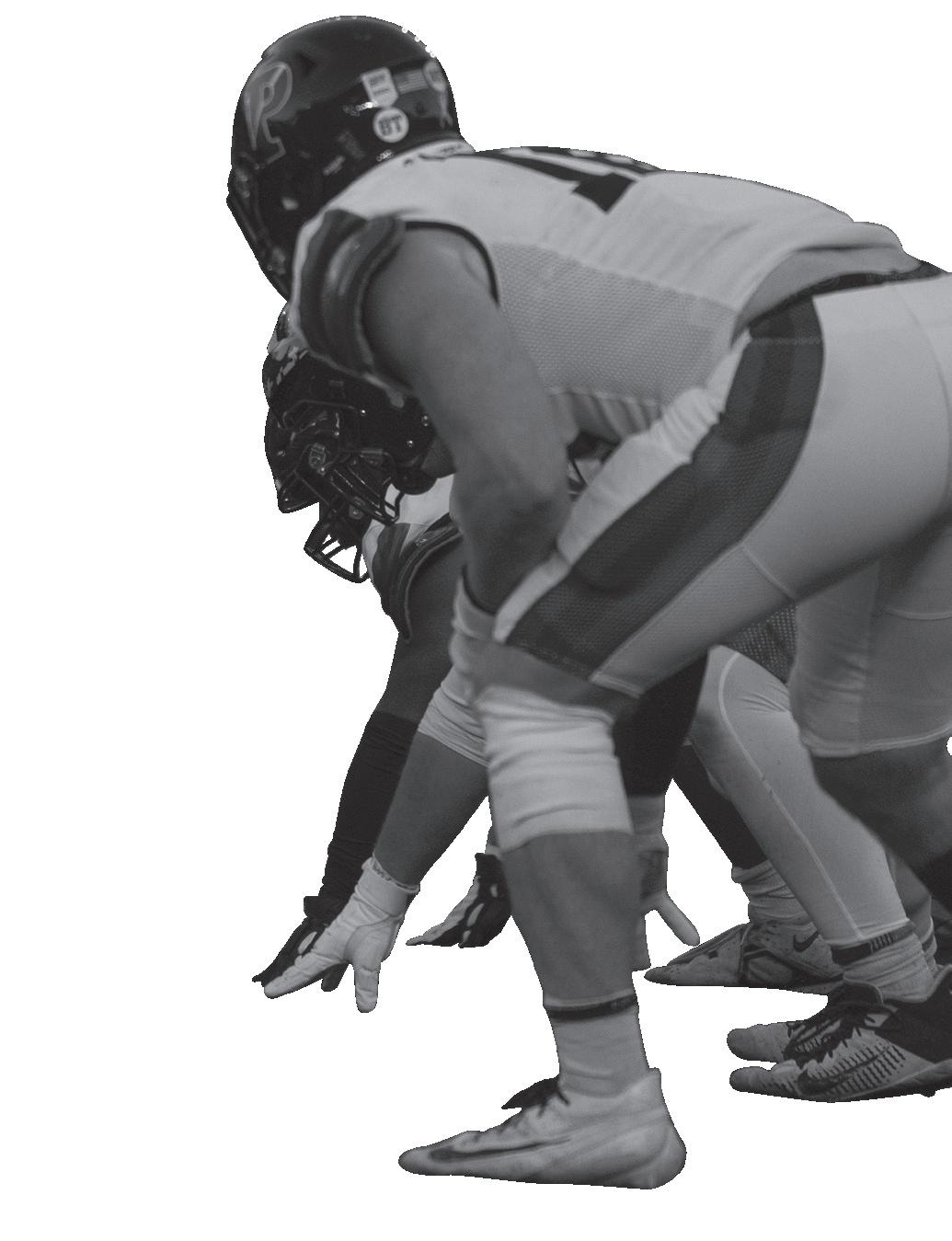
On a gloomy Friday afternoon in November 2021, thenNo. 12 Harvard field hockey took to the field in Ann Arbor, Mich. for a gritty battle against Northwestern in the Final Four of the NCAA tournament. The Crimson was fresh off two exhilarating overtime wins against No. 6 Louisville and No. 2 Michigan. At that point, Harvard had surpassed its previous record of reaching the quarterfinals in 2018.
Despite fighting tooth-and-nail, the Wildcats managed to edge a penalty corner in double overtime, ending Harvard’s historic season. Northwestern went on to win the tournament in a 2-0 victory over top-scoring offense Liberty.
Flashing backward 11 years, Harvard went 3-14 in its 2010 season — and a dismal 1-6 in the Ivy conference — a record that might seem unthinkable for current Crimson jersey-holders. It was the sixth consecutive season that Harvard failed to win at least half of its games dating back to 2004, resulting in a whopping No. 64 rank among Division I teams.
In just a decade, Harvard field hockey improved its ranking by tenfold, soaring from No. 64 to sixth in the nation. This is no small feat. Like professional sports teams, it can sometimes take several decades to break a losing cycle and build a team up to the championship level.
“I think 2014 or 2015, we had our first winning record,” said Head Coach Tjerk van Herwaarden. “That really gave us hope, because we were slowly increasing our strength of schedule.”
In 2012, van Herwaarden’s first season as Head Coach for Harvard, the Crimson went 3-13 overall. It was a season characterized by injuries and unlucky Ivy contests, as the team put only 18 goals on the board the entire season. 2013 marked a notable shift in the team’s performance, achieving an 8-9
record. Despite ending with more losses than wins, it marked considerable improvement, with the Crimson more than doubling its goal count to 37 total.
Harvard’s strength only increased from there. In 2014, the Crimson went 10-7, its first winning season since 2004. It lost narrowly to one ranked opponent — No. 11 Boston College — and put three Ivy wins under its belt.
Yet, 2016 marked one of the biggest victories for Harvard: a breakthrough year when it beat eleventh-ranked and archrival Princeton for the first time in over a decade.
In recent memory, the Ivy League title has shifted back and forth between Princ-
eton] was one of the only Ivy League games that was very competitive, to where the standard was kind of equally matched,” said former team captain and All-America second-team goalie Ellie Shahbo ’22.
“[Harvard] started winning enough games to where the only team it started losing to was Princeton,” Shahbo added.
The rivalry with Princeton became more entrenched over time as Harvard steadily matched the competitiveness of the Tigers. Altogether, it appears that Harvard’s rapid ascent from 2012 to 2021 can be attributed to van Herwaarden’s clever recruiting strategy, an improving team culture, an effective balance between aca-
A lot of the girls who were seniors when I was a freshman left a legacy of pushing the program forward. It’s the incremental baby steps that really pushed the program.
Ellie Shabho ’22Former Team Captain
eton and Harvard. A rivalry familiar to other sports at Harvard — football, swimming and diving, and water polo, to name a few — there is arguably a deeper hatred and hunger to beat Princeton than even Yale.
In the past, part of this intense competitiveness between Harvard and Princeton was because an Ivy title did not necessarily include an automatic bid to the NCAA tournament, but was determined based on rigor of schedule, among other factors. Just last year, the conference introduced an inaugural postseason tournament among the four top Ivy teams whose victor earned the automatic spot. Harvard punched that ticket.
“I remember my freshman year, [Princ-
demics and athletics, and simply winning more games.
“Once the team started to win, the girls that were older started to show us, ‘This is where we were and this is where we are now,’” Shahbo said. “That potential and possibility increase the intensity that the team trained and worked at, which I think was also helped by Tjerk pushing the team in that direction as well.”
Looking at just the numbers, Harvard began to win more indeed. After winning only three games in van Herwaarden’s first season in 2012, the Crimson had a 0.75 winning percentage in 2023 and went undefeated in the Ivy League.
Harvard gained confidence with each
gradual win, building its record and ranking each year. But Harvard was not just winning, it was also bringing in a stronger recruit class.
“I hate losing and I wanted to set a different culture, and I felt it was necessary to get my own recruits in,” van Herwaarden said.
One of van Herwaarden’s clever recruiting strategies is bringing in athletes from corners of the world where field hockey is played differently, making his team diverse in skill and strength.
“We have people that come from across the globe, and there’s different styles with field hockey played everywhere, like England is different from America, which is different from Australia, which is different from the Netherlands. [Tjerk] pulls the skills out of girls on the team to help create this very cohesive gameplay strategy,” Shahbo added.
In addition to being an All-American, Shahbo was also the No. 1 defensive goalie in Division-I field hockey and the winningest goalkeeper in Harvard program history. When she was recruited, she had offers from top field hockey programs — even the reigning NCAA champions, UNC. Yet, she ultimately chose Harvard for its momentous potential and the opportunity to be a part of something bigger than herself.
“What was really cool about Harvard was there was a lot of potential and opportunity,” Shahbo said. “I think Tjerk’s vision for the program is what really sold me and he was really looking to recruit people that had the same vision as him. It was kind of a no-brainer for me, in that sense.”
According to Shahbo, the key to van Herwaarden’s vision for Harvard was consistency: not just winning the Ivy League this year, but every year, and to make regular appearances in the NCAA tournament — something the program has gone on to do consistently in his time as coach.
“Tjerk has always been a big proponent of protecting the culture of the
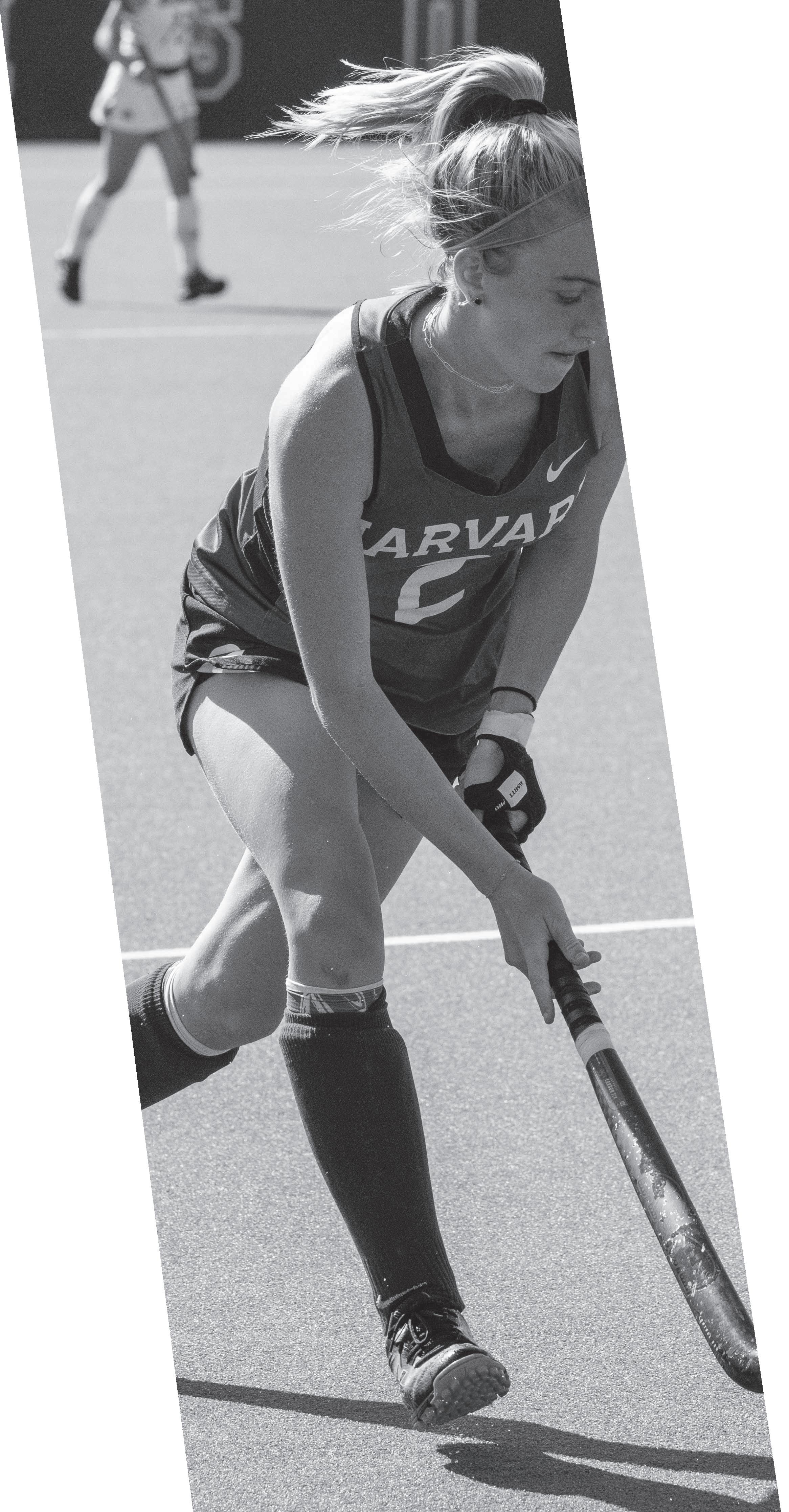
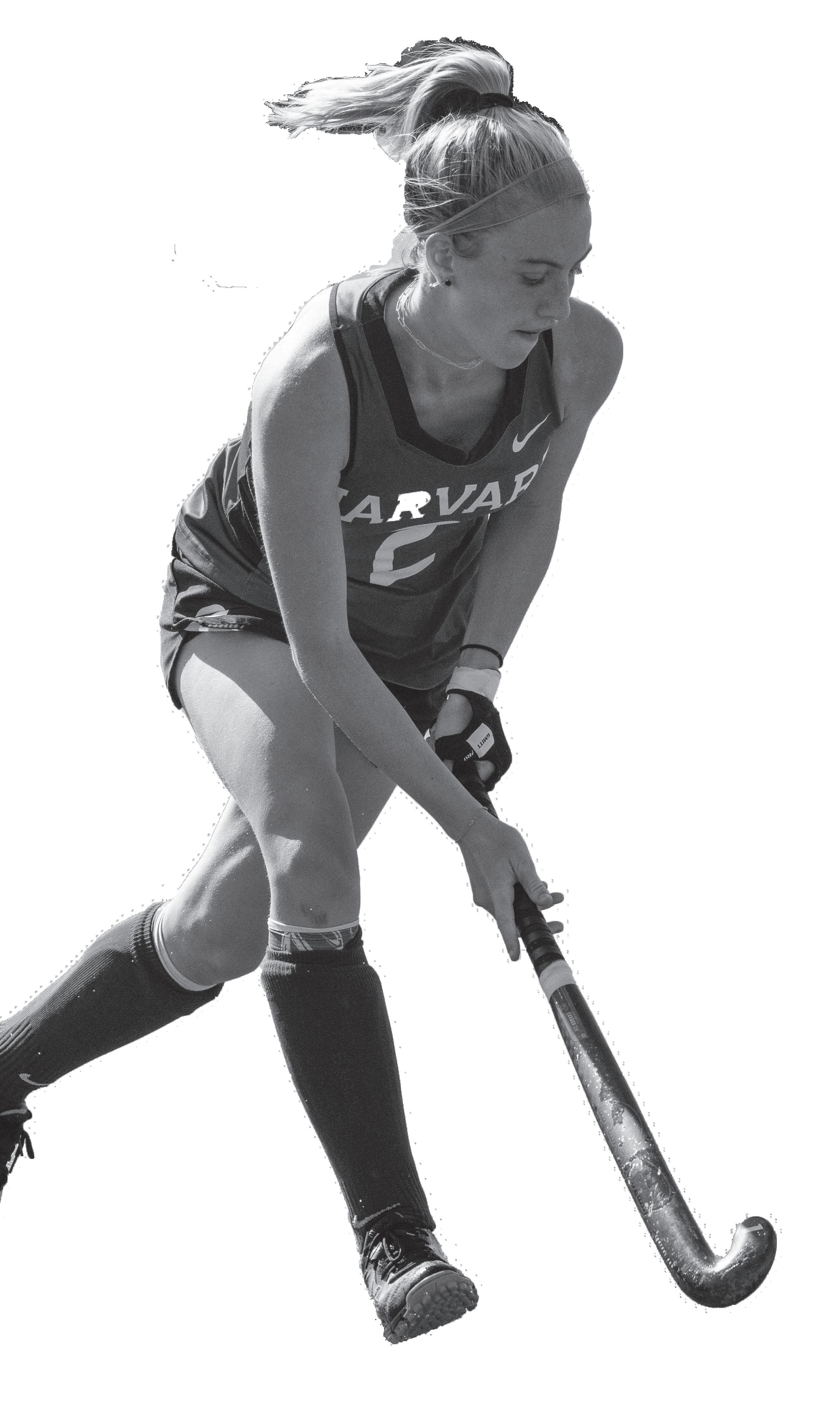
team. And that’s something that is top of mind for him when new people are coming in, whether they’ll kind of contribute and add to that team environment. I think it goes hand in hand with our team being so successful in the last few
Van Herwaarden emphasized that Harvard’s rapid success over the past decade isn’t to be attributed to a particular incoming class or athlete, but in developing a culture that draws champions.
“A lot of the girls who were seniors when I was a freshman left a legacy of pushing the program forward,” Shahbo said. “It’s the incremental baby steps that those girls took in that era before I got there that really pushed the program and set the tone for moving
Whether it’s studying on buses together on the road to an away game or waking up early to complete an assign -
ment before morning practice, van Herwaarden has also made an effort to support his athletes in their academic endeavors within the rigorous Harvard curriculum. He believes that it’s a critical component of the team’s success. In the preseason, the team’s goals are always, firstly, winning an Ivy title and making an NCAA appearance, and secondly, achieving a commendable team GPA. As a signal of its success in that regard, the Crimson recently placed fifth in the National Team Academic Award.
Looking forward to the 2024 season, there is an important matter van Herwaarden and his team must check off first: celebrating the Harvard field hockey program’s 50th anniversary as a varsity sport at the College.
“Harvard field hockey exists 50 years next year as a varsity program at Harvard,” the coach said. “So that’s the first thing that we’re gonna look forward to and then celebrate.”
After celebrating, the team still has some work to do. But what makes it different now than a decade ago, or even just a few years ago, is the program is nearly at its peak. Harvard has consistently ranked as a top-10 or top15 program in Division-I field hockey, making the incremental steps of improvement it saw during van Herwaarden’s early years more difficult to achieve.
“I think it really comes down to the little things like the margins and margins of error, and how you can differentiate yourself from a team that is pretty much equally matched,” Shahbo said.
“It’s the touches on the ball, it’s having certain people have a yard in a different direction and a different position, and I think fine-tuning those things is going to be the biggest challenge,” she added.
To whom much is given, more will be expected. Harvard is at a point where excelling comes from a smaller margin than before. Its team goals, though not as far-reaching as in years past, are more about fine-tuning, which is arguably even more difficult to achieve. The pressure is on.
mairead.baker@thecrimson.com
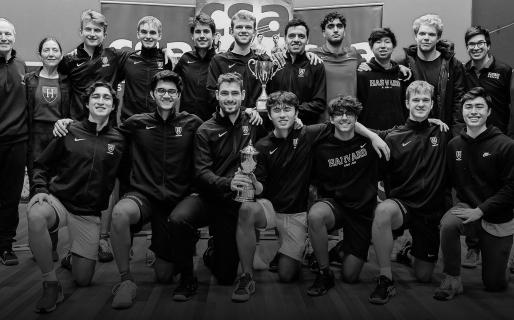 By CALLUM J. DIAK AND KATHARINE A. FORST CRIMSON STAFF WRITERS
By CALLUM J. DIAK AND KATHARINE A. FORST CRIMSON STAFF WRITERS
Often considered “the heartbeat of the team,” team managers play an integral role in varsity sports. The team manager works alongside the coaching staff and players to ensure that a program runs as smoothly as possible. While an important role, managers are sometimes overlooked in athletics. The Crimson sat down with four exemplary managers from Harvard’s basketball, lacrosse, and squash programs to find out more about what it’s like to hold this position.
Harvard men’s squash had a challenging year. Coming off of an exceptional 2022-23 season when the Crimson went undefeated, claiming both the Ivy League title and the national championship, there were a lot of expectations for Harvard’s squash program. Despite losing some key players, the Crimson still entered this year ranked sec-
ond in the country. Harvard started the season off hot with a six-game winning streak, including a commanding win over No. 3 Yale. Hopes of a repeat championship seemed within reach but midway through the season the momentum shifted during a tough stretch of competition. The defending champions fell in three consecutive contests to Trinity College, Princeton, and UPenn. Harvard got back to its winning ways with four-straight-wins to close out the season, but it was too little too late to clinch the Ivy League crown. Regardless of the disappointing results, the Crimson has lots to build off of from this season. And amid all the development and change that has taken place in a very storied squash program, there has been a constant hidden behind the scenes. Alongside Gregory Lee ’87, Russell Ball ’88, Coach Mike Way, and the rest of the coaching staff, is junior Drew Hesp. For the past three years, Hesp has worked with men’s squash as the program’s team manager. Hesp’s tenure as manager has seen Harvard win an Ivy League title and two CSA National Championships.
Q: What got you interested in managing
a team at Harvard?
Drew: I really loved sports back in high school and obviously being on the player end of that was a great experience for me. And so I came into college and one of the things I felt like I was going to miss a lot was getting to still have that experience of being with the team and going to games and things like that. And so early on, I heard the squash captains are looking for a team manager and I was really interested. And so I met with the captains Sam and Marwan and talked to them about it. And it just sounded like a great opportunity to stay somewhat involved in the sport even without being on the playing end. I started doing it freshman year, really loved it, and have been doing it ever since.
Q: What’s it like working with Mike Way?
Drew: Mike is incredible. I’ve played a lot of different sports, and met a lot of coaches. He’s definitely just a level above. You can tell from talking with him, he really cares about the players beyond just the level of being their coach. He really cares to make sure that everyone’s bought into the team, every-
one feels like a comfortable contributing member of the team. There’s a reason that he’s been such a successful coach and the greatest college squash coach we’ve seen. All those national championships really go back to him making that effort to understand his players in a way that I’ve never seen another coach be able to do.
Q: What is your favorite part about being a team manager?
Drew: I think it’s just been getting to grow tight with the guys. That’s what drew me into wanting to be a manager in the first place, was getting to stay within the squash community. And so, all the guys I’ve met, I think we have a great, great crew. I’ve spent a lot of time with them, whether it be at the courts or outside of the courts. I was really welcomed with open arms. I definitely consider a lot of them some of my closest friends. I get to, you know, grab meals with them, hang out with them outside of squash. Freshman year, I think the captains really made a conscious effort to include me in that team stuff. And so yeah, I’ve grown really tight with them. I’m very thankful I got to meet them.
For the second time in the past three seasons, the Harvard men’s lacrosse team posted a winning season. Under Frisbie Family Head Coach Gerry Byrne, the team went toe-to-toe with the top teams in the nation and capitalized on the prowess of its seven All-Ivy honorees, the most the team has seen since 2014. Led on the attack by Sam King, a Tewaaraton Award finalist, the program saw glimpses of greatness over the course of the spring. While Byrne and his coaching staff were instrumental in leading the team to victories, the dedication of its student managers ensured that the players could thrive on the field without having to worry about logistics. Senior Justin Glod , a former member of the program, and sophomore Crimson Sports Board editor Hugo Nunez worked to create a precedent of hands-on team management in a role that had previously been undefined. The two worked practices, games, and traveled with the squad, integrating themselves into the framework of the program as not just managers, but as teammates.
Q: What made you want to be a manager ?
Justin: So for some backstory, I was on the team up until junior year. I quit because of injuries and other personal reasons, but after some time, I felt that I’d be remiss if I didn’t try to contribute to the team in some way, and be involved in the sport that’s given me so much. And I felt like a managerial role was a great way to fulfill that. But also, being on the team, I had a ton of respect for managers to begin with. They do a lot of things behind the scenes just to make sure that the stress level of the team stays low, and that they can just focus on getting better and winning games. I felt that I knew the team, I knew what was going on day in and day out, and I could fit that role very well. And it’s been an overall super positive experience.
Q: There isn’t much of a storied history of managers for the lacrosse team, how has your role with the team evolved?
Justin: I look up to Michael Calabro, who was a senior when I was a freshman. I also look up to Michael Binkowski, who is a senior right now. Those guys had the opposite route that I did, going from managerial roles to active player roles. And I really commend them and everything that they put into the team, and how much they contributed. And
it really gave me inspiration to do the same and I know those guys were battling for a roster spot. However, it was still commend able, how hard they worked, just to make sure that the team was ready to go and how passionate they were for it. And I think I’ve brought that same passion every day.
Q: Athletes always call their managers the heartbeat of the team. How do you think you keep the program moving?
Justin: I think the biggest way that us man agers do that is just making sure that the fo cus of the team and the coaches is only on the game, not around how we’re getting there, or what hotel we’re gonna stay in. Really just being able to go out there and play on the field. And then us on the back end, you know, we’re helping the team in other ways too, we’re taking stats, we have live replays, just to make things more effi cient for the coaches so that they can ana lyze the team quicker and, and make adjust ments quicker. And overall, I think it helps improve our team. And so I think it is a lit tle bit of a behind the scenes role, but I will say that every person on the team has done an awesome job of making me feel like I’m helping contribute to the team in some way and then I’m making an impact.
Q: What has been the best thing you’ve learned from being a manager rather than a player?
Justin: That everybody plays a role. I real ize that some days, my role is small and oth er days, my role is very important. And that it’s important to be ready every day. And, al though it’s tempting to go out there and mess around with my friends, and have fun and just goof around, I know that the goal is a lot big ger than that. And so I respect that out of them. So, a newfound respect for everything that goes into the pro gram and how serious it’s taken.
Q: What made you want to be a manager?
Hugo: It was a pretty obvious decision for me to become a manager. I played lacrosse all throughout high school, and then when I got to Harvard, my club coach reached out to me and said that he knows one of the Harvard coaches

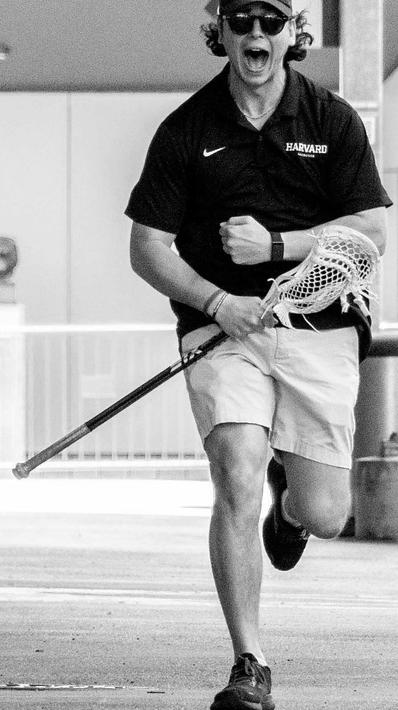
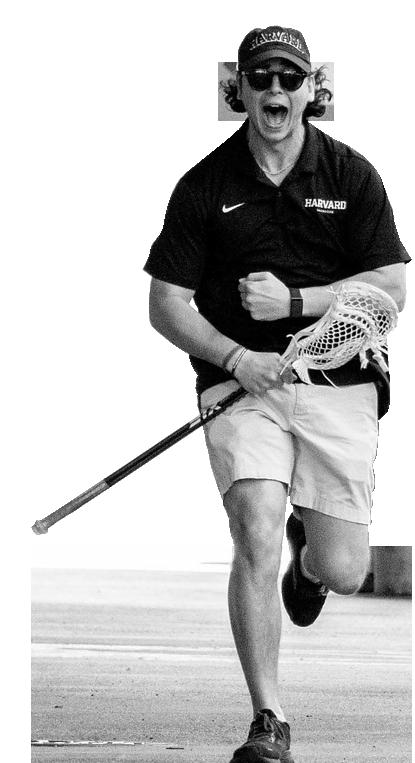
Under Assistant Coach Mike Sotsky — a former senior manager for the Duke 2015 NCAA championship men’s basketball team and a co-recipient of the Gopal Varadhan Award, presented annually to the program’s top upperclassman manager — the Harvard men’s basketball program has established a dedicated squad of student managers. While the program didn’t see postseason action, falling just short of the Ivy League tournament, it posted a winning season for the 14th time in the last 15 seasons. Junior Rebecca Solomon, alongside her other managers, devoted countless hours to helping the team succeed, arriving at Lavietes Pavilion thirty minutes early for each practice and two hours early for each game to ensure that the team would have to focus on nothing more than coming out of each game victorious.
Q: What made you want to be a manager?
Rebecca: I’ve always really loved basketball. I was a team manager for my high school boys varsity team. I used to play basketball, and I got some concussions in middle school, so I stopped playing. But, I still wanted to be involved in the sport. And so when I got to Harvard, I texted Howard Johnson, who I know had been a manager for the basketball team, and reached out to the coaches, and then I just started doing it.
Q: What does your day to day look like?
Rebecca: When I go to practice, I get there thirty minutes before the players. We sweep the court, fill up water bottles, get the balls out, and then help to rebound once the boys start filing into the gym. Someone will help out with the clock, someone will stand with towels and balls just during practice. So,
manager at Duke when he went there. So, I think that he’s always recognized managers as a really important part of the program based on his background, and made a really large effort to foster that community where it really is like a team separate from the team. We have our own team of managers. And so I think that just the collective buy in. I also think it helps that basketball
Rebecca Solomon Men’s Basketball manager I think it’s important to be a good vibe, a good energy. Keep the culture alive, too, especially since you’re not playing.
that would be a typical practice. And then for games, we’ll get there two hours before, set up the court kind of in the same way, prepare the locker room, and then just be there on hand. And then travel. We travel along with them, load the bus, and do all that stuff.
Q: Basketball has a pretty storied managerial program. How does that intensity shape your approach to the role?
Rebecca: The head assistant coach Mike Sotsky was
is a small team as well, and so you really do get to immerse yourself in that. Because it’s such a small group, the managers really feel like they have a large
Q: Athletes always call their managers the heartbeat of the program. How do you think you keep the program moving?
Rebecca: I think that the biggest thing on the first level is just making sure that they don’t have to worry about any of the logistics. When they’re playing in the game, they should have their water, and they shouldn’t have to be thinking about getting the water, and that kind of stuff. So, just making sure that the main focus of the athletes is playing so they don’t have to worry about any of the logistics. And then also, just in terms of culture, I think it’s important to be a good vibe, a good energy. Keep the culture alive too, especially since you’re not playing, it’s easier to make sure you’re bringing good vibes.
callum.diak@thecrimson.com
katharine.forst@thecrimson.com
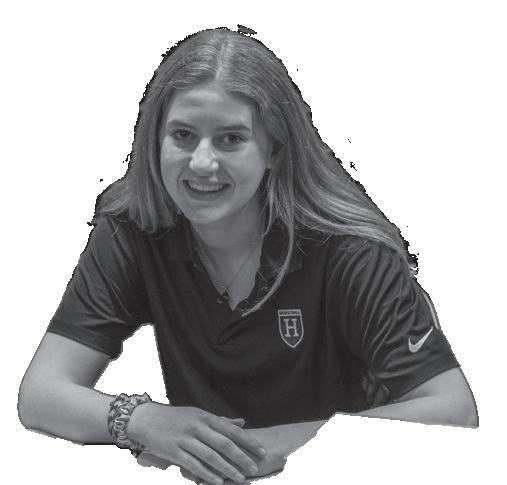
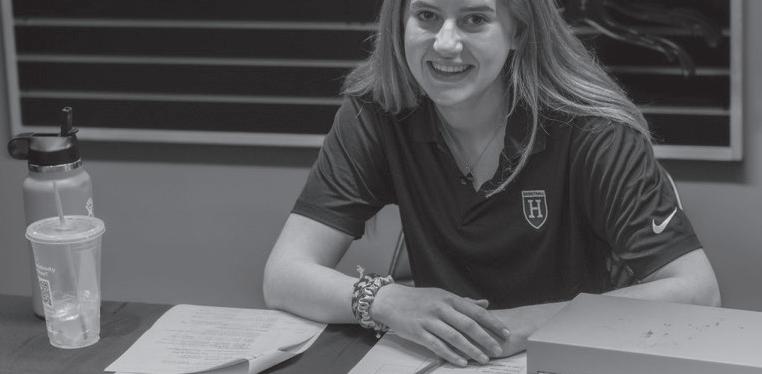
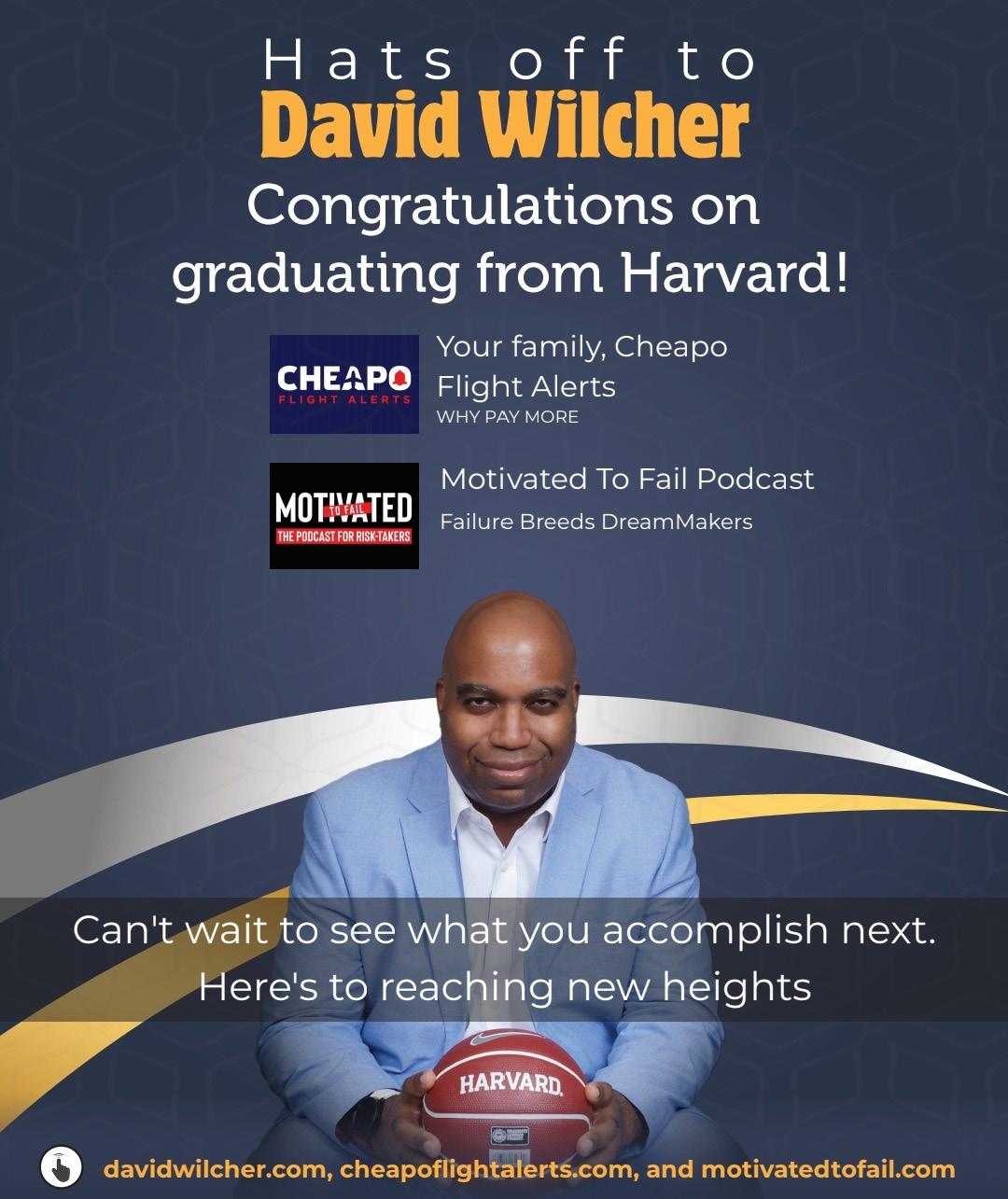
George Cooper is used to taking big swings. The junior outfielder, who hit .294/.335/.400 this season, is known for his free-swinging, contact-heavy approach at the dish, as well as his infectious presence in the dugout. But since arriving at Harvard, Cooper has also been immersing himself in another ultra-competitive environment with a high risk of failure: the music industry.
“The Harvard Tape,” a mixtape made up of songs produced by student-musicians which will also be accompanied by a documentary about the production process, is Cooper’s biggest swing yet. Featuring the talents of a Ukrainian refugee living in Poland, a former American Idol contestant, and an upand-coming producer who’s attracted the attention of the rapper Gunna, the project is an ambitious amalgamation of the relationships that Cooper has built in the Boston-Cambridge music scene.
The project blossomed out of Cooper’s desire to bring together musicians and create a platform that might help them cut through the noise of the oversaturated music scene. Leveraging his connections in his native Los
Angeles, Cooper wanted to turn away from the new marketing techniques of TikTok videos and Instagram reels to develop a longer-form film that would allow him to tell the stories of each of the student-musicians involved. In the process, Cooper hopes to capture attention in a way that might help him market the artists’ talents to the audience.
“We’re trying to do it a different way, and really give these kids a chance and kind of immortalize them in some sort of, you know, visual medium,” Cooper said.
However, it wasn’t until Cooper’s sophomore summer internship with TCC Entertainment, a creative media marketing agency, when he started to piece his project together. His original plan was to capitalize on the firm’s network of influencers, which consisted of “probably a hundred plus pretty big influencers in the Instagram, Tik Tok space.” However, this approach pigeonholed him into a pre-packaged form of production that constrained his creativity. The experience had him thinking, early on, about ways to merge the cachet of contemporary, instant-gratification platforms like TikTok with his desire for longer-form storytelling.
“We widened our scope and tried to make it a little bit more of a concrete project that we could actually solidify,” Cooper said, describing the progression of his ideas throughout the planning stages.
Part of that planning has involved Cooper grappling with the question of what it is he wants his tape to stand for. As the project is still in its early stages of development, he notes that while the true connecting line between the songs and people is unclear, what he does know is that “the unifying factor to all of these people is that they’re coming together for a mixtape that has no specific sound, no specific person in mind. But the overarching theme is message first. We are trying to make music with a message.”
While Cooper is keeping the overall thrust of the documentary malleable at this point, what he does know is that it must encompass his mission to understand how music can be leveraged in a way that changes the world for the better. What Cooper hopes to do is answer the question of “How can we impact people, you know, make songs that aren’t traditionally associated with genres in terms of the lyrical content and what we’re putting out into the world?” He recognizes that he and his peers have been given an incredible opportunity with their talents, and hopes not to “tear the world down with us” by succumbing to traditional commercial pressures.
By trying to break out of the typical music-industry mold, Cooper is continuing his
track-record of taking the path less traveled, an approach that’s shaped by his unconventional journey to music-making.
Cooper admits that the passion project started with a very different end goal in mind than where the tape is now headed. While the film and album have come to occupy much of Cooper’s time outside of the classroom and off of the field, the product has come to represent the culmination of his constantly-evolving passions within the music industry.
“Just trying to find my group and trying to find my little ecosystem and create that little community of the Harvard era of my life was how it started,” Cooper said, describing the process that kicked off his thinking about the mixtape.
His “little ecosystem,” while now dominated by this endeavor, is also defined by one other major aspect of his Harvard identity: his connection with the Harvard baseball team. While Cooper is open in admitting that he has fallen out of love with the sport, his proficiency on the field has not only taught him about teamwork, dedication, and determina-
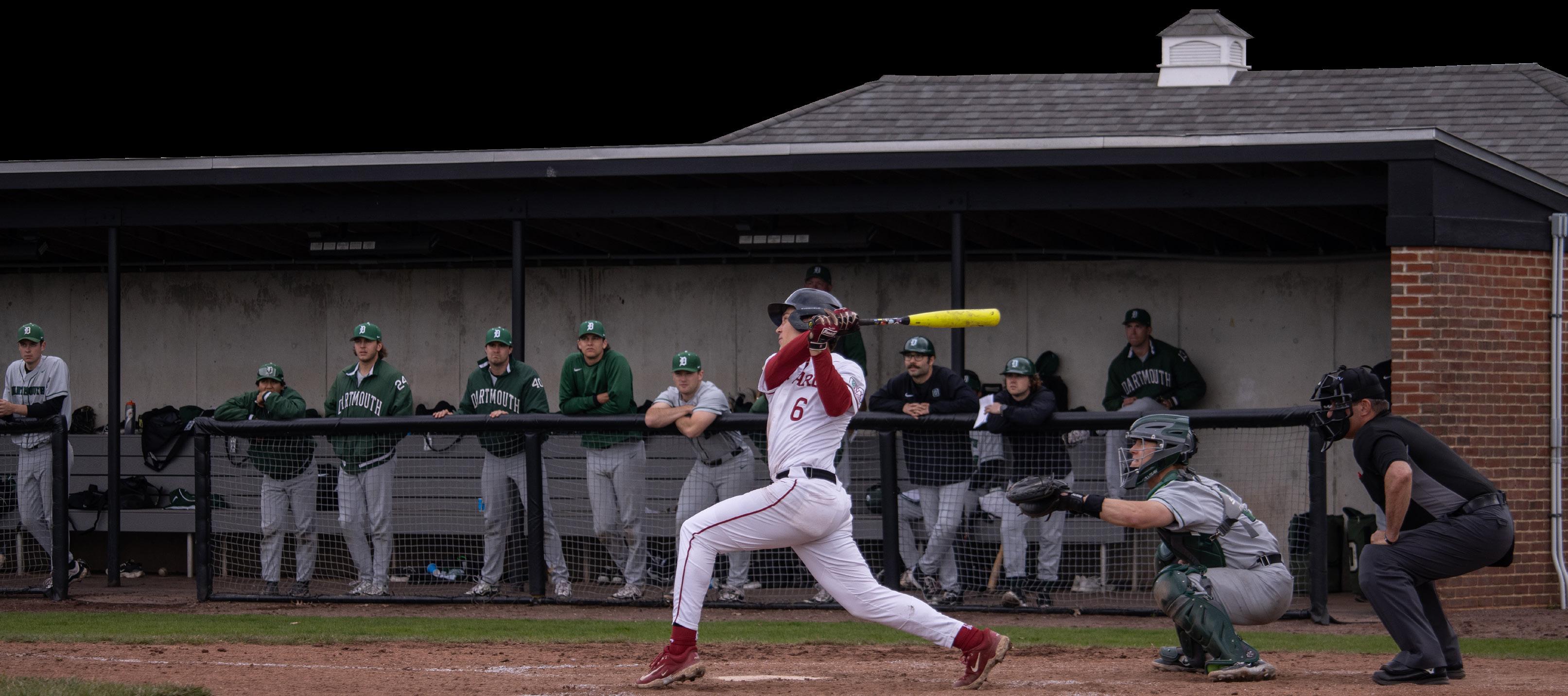
tion, but it has also enabled him to form connections with key players in the music scene which helped to jumpstart his career.
His passion for music first became intertwined with his baseball career when he was in high school. As a standout infielder for Harvard-Westlake, he was recruited to the Crimson by Head Coach Bill Decker, an accomplishment that left him proud, but then listless. Cooper described the weeks after being recruited as a search for purpose.
That search for meaning beyond the diamond led him to spend time with friends in Los Angeles who were musicians, several of whom were also athletes. He cites Jacob Galloway, a drummer who is now the starting catcher for the University of Southern California, and Tako Khoo, a versatile pianist who was recruited to swim for Dartmouth, as formative influences from that time.
“So I’m just with these people kind of in this little creative chrysalis just figuring it out,” Cooper said. “I really love this stuff. I want to be a part of it. But I’m not like these guys, I can’t really make the music like that.” But Cooper didn’t let his initial unfamiliarity with the craft quash his affinity for music.
“I’m trying to figure out how to be of service to these people that really let me into the other side of music, the making of it and not just being a fan. And I very quickly realized I have to start putting people together and making their lives a little bit more doable, you know, try to make the business side of the music work. I also wanted to be a part of the production, touch it. But I’m not the creative guy, I’m not that person.”
This search for a musical identity led him early on to recognize his affinity for putting talented people together, at the same time as
his own talents in music production began to blossom.
At that time, he benefitted from an unlikely connection: an introduction from his high school pitching coach, Joe Guntz, to set up a meeting with the music producer Ron Laffitte, owner of Laffitte Management Group, who now co-produces The Harvard Mixtape alongside LiveNation. Being able to work under Laffitte’s guidance was a dream come true for the rising senior, as Laffitte boasts a deep clientele of artists, including One Republic, Usher, and the Backstreet Boys.
“I mean, he’s at the top of the game,” Cooper said, recounting the story of his first meeting with Lafitte. “And so I’m texting Guntz. And you know, I go to the field at like 7:00 am. And they have a scrimmage two days later, and I meet this guy Ron Laffitte. And we’re just sitting on the sidelines watching his son play ball. I’m just chopping it up with him. And he really gets it, you know. I ended up then calling him the next day and kind of giving him my whole spiel. I told him, ‘I really want to make it in this industry. I manage a couple up and coming artists and producers, mostly in the hip hop field, but I love to clash these genres and make some reggae stuff,’” Cooper said, about giving the music legend his elevator pitch. He ended the conversation with a request for Laffitte: “‘‘Do you have any recommendations for me? Could you maybe give me a reference to one of your people in the industry and give me a shot?’”
Laffitte did Cooper one better. He didn’t refer the Harvard-Westlake alum to one of his peers, he offered to bring him into his own firm instead.
Cooper started working for Laffitte in a capacity that he thought might only become a
summer internship. However, Cooper quickly excelled in his position and decided to stay on as a term-time intern, meaning that he would then be tasked with balancing his baseball and music even further.
“I started working with him last summer, and he extended it into the school year,” Cooper said. “So I’m an intern right now. And then I’ll go right back this summer. Hopefully that’s the home, but him believing me from day one was insane.”
“Insane” isthe word which Cooper often used to encapsulate his experience in the music industry thus far, emphasizing consistently the shock and gratitude he’s felt at being mentored by some of the most prominent names in the business. However, the infielder is quick to admit that without baseball, none of his success would have been obtainable.
“Baseball is kind of the tether,” Cooper said. “[Lafitte] knew me from the baseball side. And it just took a little bit of chitchat to let them know what I’m up to on the music side, and he believed in me. It was awesome.”
Laffitte’s belief in Cooper was all the rising senior needed to build his confidence and dive headfirst into the project. However, what the project would look like was still up in the air.
The idea of pairing a documentary with the mixtape was Cooper’s solution to “cutting through the fluff” of the entertainment industry, and part and parcel of Cooper’s goal to launch all the artists on the tape up from “ground zero” at the same time. The plot synopsis, at this point, is as follows: the documentary makers follow Cooper as he helps 11 students — nine of whom are enrolled at Harvard, several of them athletes — connect with producers and other artists who might help them catalyze their careers.
In a recent development, Cooper will be aided in his efforts not just by Laffitte, but also music industry legend Adrian Miller, who will help Cooper produce and market the music once he finishes piecing together the different tracks on the mixtape. Miller is best known for managing R&B superstar Anderson Paak, an artist whose genre-bending abilities is surely a model for the artists in the doc -
umentary.
The first musician that the viewer is introduced to is Omarion “Armanii” Perez, a junior at Harvard and an R&B singer, via a visit to his hometown to manage a studio session. However, the artist that Cooper is pinning his hopes for success on is graduating senior and former American Idol contestant Isa Peña. Peña, described as a “multi-language pop singer,” has headlined several Cambridge plays, performed the national anthem for the Miami Dolphins, Miami Heat, and Miami Marlins, and is arguably the most well-known vocalist on the track. Cooper envisions her contribution to the mixtape coming to fruition in the form of an original song through a collaboration with a “renowned songwriter.”
Cooper expressed his vision to highlight Peña’s talents throughout the tape, but he was also confident that he will uplift the other contributors’ voices as well.
The rest of the tape is headlined by Elyse Martin-Smith, Erick “E Moreland” Silva, Jaeschel Acheampong, Braden “YoshocK” Ellis, Sophia “Sophy Ivy” Ivanko, Cooper “flydacoop” Prawdzik, Nykeyla “Keyla” Williams, Tyler “Ekblad” Heaton, Dexter “Dexter Suhn” Griffin, and Camille “Cami” Baker. All 11 artists will have the opportunity to share their stories through the visual medium, as well as showcase their talents on the mixtape.
The mixtape is currently set to fall into three distinct acts, with the opening act being an introduction to the artists and a glimpse into their respective personal stories. The second will witness the students as they interact with the entertainment professionals, filming successes in those meetings as well as failures, with the failures being crucial to authentically depicting the cutthroat business the artists are plunging into. In the final act, the film will follow Cooper as he navigates the marketing process, the financial side of funding the documentary, and the eventual planning for the release of the mixtape.
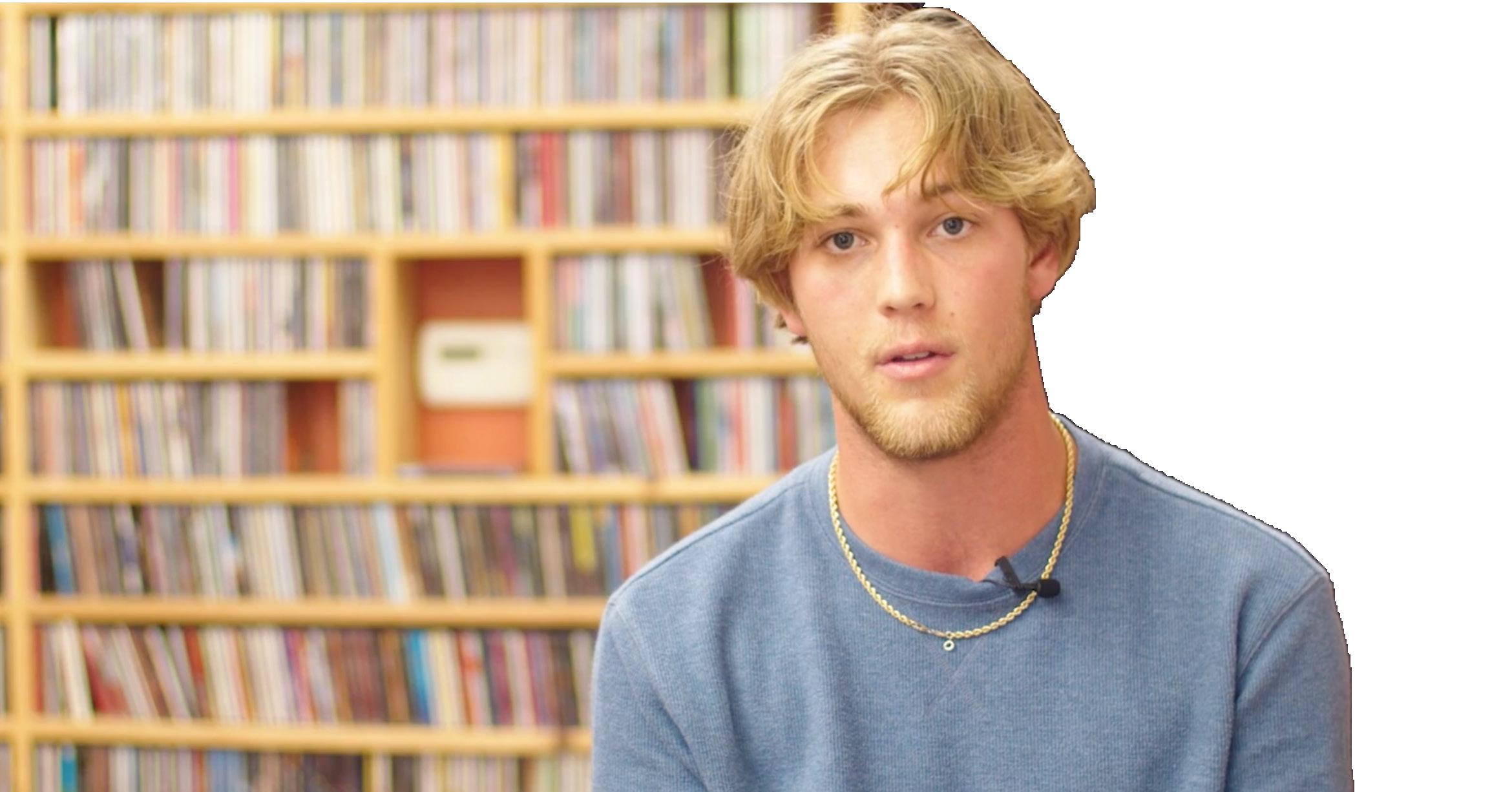
While the students are portrayed individually as they pursue their dreams, there is a shared bond that has formed between them, which Cooper looks to capture within the film.
He describes the cohort as a “tribe of musical misfits turned family.” While the film and album are still being produced, Cooper’s passion in spreading the talents of his peers is contagious even in conversation. With Laffitte and Miller’s help, the dugout demon is confident he will make a name for himself in the music production industry.
katharine.forst@thecrimson.com
jack.silvers@thecrimson.com
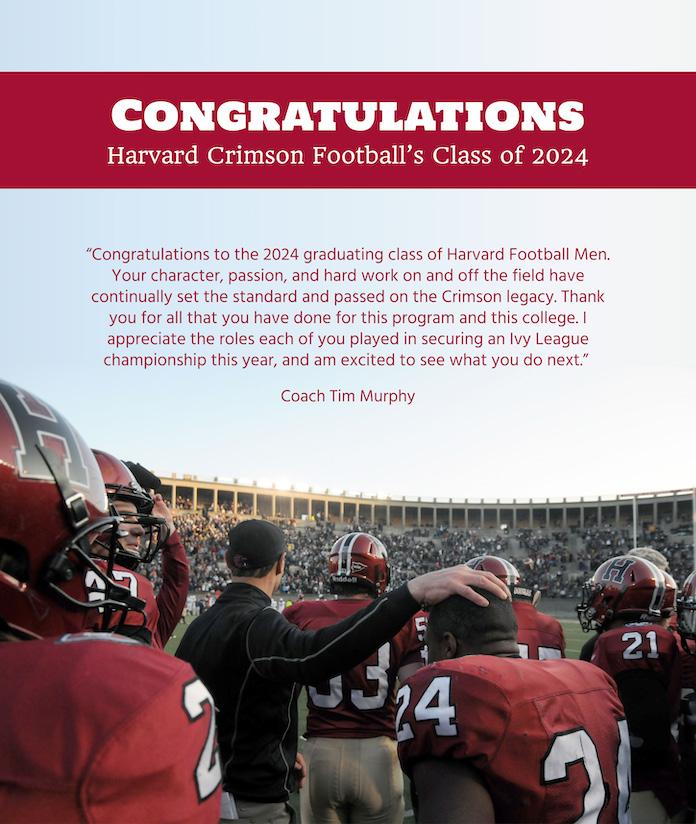
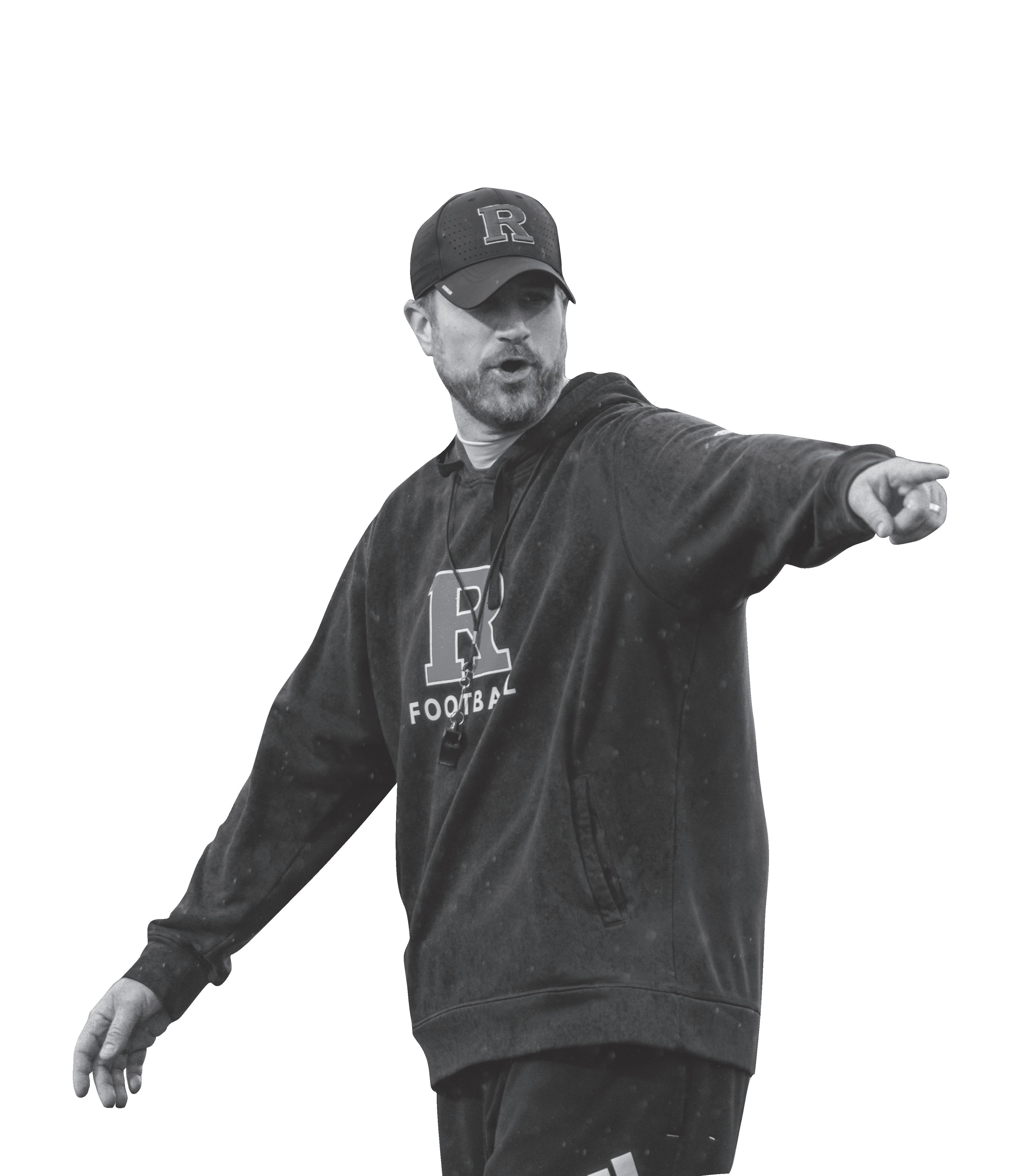 By JACK K. SILVERS CRIMSON STAFF WRITER
By JACK K. SILVERS CRIMSON STAFF WRITER
The last time Harvard had a new football coach, Bill Clinton was halfway into his first term. Mariah Carey had just released her first holiday album, with one track that looked set to become a Saturnalia standard. “Pulp Fiction” had just delivered Quentin Tarantino his first blockbuster, and Joe Biden was just a junior senator.
In 1994, when Tim Murphy was beginning his first season at the helm of the Harvard football program — a tenure that would bring 10 Ivy League titles to Cambridge and solidify his reputation as the most impactful coach in Harvard
history — the man who would eventually succeed him was just 10 years old. But Andrew Aurich’s love for football was already growing.
“I got into coaching because my dad was a head football coach for over 25 years,” said Aurich, who was named the next Thomas Stephenson Family Head Coach for Harvard Football in February of this year. “I would see the relationships he was building with his players and the impact he was having on their lives. And I knew that’s what I wanted to do.”
Now, Aurich will hope that his head coaching tenure at Harvard can rival Mike Aurich’s run as head coach of Concordia Academy in Roseville, Minn. In more than two decades on the sidelines, the elder Aurich won three conference titles while also serving as the school’s
Athletic Director. He was inducted into the school’s Athletic Hall of Fame in 2015.
Following in his father’s footsteps, Aurich began his coaching career at Concordia, his alma mater, where he served as the varsity assistant coach. In his first coaching stint at the collegiate level, he was the tight ends coach for the Albright College Lions, a small liberal arts school in Reading, Pa. that competes at the Division III level. Working under John Marzka, a bona fide D-III guru who built Albright into a contender, Aurich filled in the gaps in his football knowledge left over from his playing career.
As an offensive lineman for Princeton, a guard whom The Daily Princetonian praised in 2005 as having a “surfeit of athleticism,” Aurich gained an early familiarity with the dynamics of the run game. However, it was in Reading that he first expanded his offensive mindset beyond the ground-and-pound.
“I was an offensive lineman in college.
ly shaped the leader he is today. Interrupted only by a one-year stint at the professional level as a defensive assistant for the Tampa Bay Buccaneers in 2012 — an experience he described as a “completely different animal” — the Princeton years gave Aurich the chance to develop an independent coaching philosophy.
Starting as a running backs coach in 2011, Aurich saw the inside of four position-group rooms before taking on additional responsibilities as a coordinator toward the end of his tenure. From 2013 to 2015, he spent half of his time on special teams, an opportunity that he savored for its growth potential and the chance to chart the course of an entire unit.
“What you get as a special teams coach is you get the entire team in front of you multiple times a week, all season,” Aurich said. “That’s invaluable experience, because not a lot of coaches get an opportunity to address the entire team.”
The year before Aurich joined the staff, Princeton went 1-9, but it didn’t take long for the team to return to contender status. Aurich’s first taste of competitive glory as a coach came in 2013, when the Tigers shared the Ivy League title with the Crimson. The conference title was the first of three during Aurich’s stay, including the 2018 campaign, when the Tigers ran the table for the first time since 1964. As offensive line coach that year, Aurich oversaw a unit that allowed all parts of the offense to fire on all cylinders: with the second fewest sacks allowed in the conference and a conference-leading 296 rushing yards per game, the Tigers bulldozed the competition on offense.
Despite the bevy of on-the-field results he could point to, Aurich put special emphasis on the growth that he made as a recruiter and as a leader of men at Princeton. In the first dimension, Aurich officially added recruiting coordinator to his job title in 2016, giving him a stake in the high-invest-
Coach as an example of the type of work he enjoyed off the field.
“I was in charge of connecting alumni with freshmen on the team and helping them build a relationship with them,” Aurich said. “How they could be of help to them throughout their college career and then help them figure out what they want to do with their life.”
What is abundantly evident in listening to Aurich talk about his time at Princeton is that he loves the special combination of athletic commitment and all-around dedication to self-improvement that permeates Ivy League athletics. The way he speaks about the athletes he’s worked with demonstrates an admiration and an understanding that comes from his own personal path to coaching.
“They love to be challenged and coached hard,” he said of his players at Princeton. “They were self starters, and they were all about trying to be the best they could possi-
His affection for the Ivy League helps turn to the Scarlet Knights to take on more cade earlier. Looking back at his move to Power-5 coaching, Aurich traced his path as one that was always fated to bring him
“I firmly believe that if I would have stayed at Princeton, I would not be ready to be a head coach in the Ivy League when the other ex-Rutgers coach made the decision to return to northern New Jersey: Greg
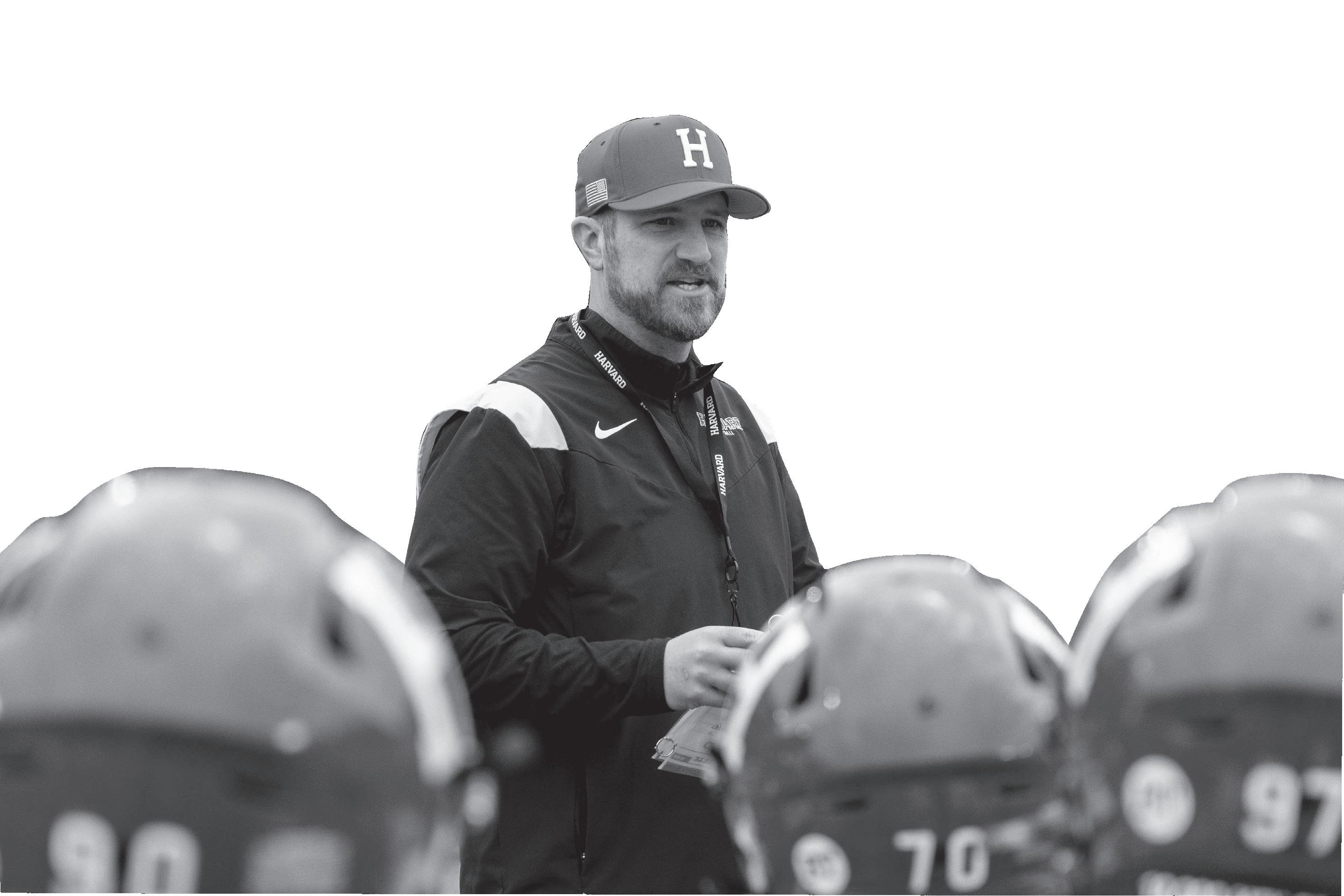
Schiano, the legendary program-reviver whose trademark catchphrase, “Keep choppin,” was forever enshrined in the college football lexicon when he led the Scarlet Knights to their first-ever bowl game victory in 2006. Aurich and Schiano both began their second stay at Rutgers in 2020, hoping to turn around a program that had struggled since Schiano left, playing to a 2-9 record in 2019.
During his two years as offensive line coach, Aurich dealt with a number of key injuries to the five men up front, forcing him to be creative with the starting lineup. The Scarlet Knights had playmakers at the time — including future Kansas City Chiefs star Isiah Pacheco, who rushed for 647 yards as a senior in 2021 — but often struggled to utilize them effectively, finishing 5-8 in the first full season since Aurich rejoined the program.
Rutgers stagnated in 2022, missing out on a bowl game and being shut out 38-0 in its final game against Maryland. Aurich took on the new role of running backs coach that year, a difficult assignment given the loss of Pacheco to the draft earlier that year. With an untested group of tailbacks, Aurich’s unit averaged only 3.6 yards per carry,
ots legend who has been called “the greatest football mind to ever live,” he said that Piscataway was the best place in college football to up his football I.Q.
“I knew that being around him was going to put me in position not just to be ready to be a head football coach, but to be ready to be a really good head football coach,” Aurich said of Schiano. “These last four years have basically been a Ph. D in head coaching in football. The amount of football I learned, from X’s and O’s to situational football to culture building to how you recruit, is better than you could get anywhere else in the country.”
So what does Aurich think the Crimson has in store for next season, coming off its 18th conference championship? On offense, he described his approach as prioritizing the team’s playmakers, no matter the position.
“My general philosophy on offense is get your playmakers the ball. So whoever your playmakers are, it’s about getting touches to the guys who deserve the touches,” the coach said.
He and longtime offensive coordina-
I had an end goal to this whole thing. I wanted it and I got it at the best Ivy League school out there.
Andrew
the same as the season before.
Turnarounds don’t happen overnight though, and the steady progress that the team made since the 2019 season seemed to finally bear fruit last season. The Scarlet Knights went 7-6 and beat Miami (Fla.) in the Pinstripe Bowl at Yankee Stadium in New York. Aurich had moved to tight ends coach, but the work he put into coaching up the team’s linemen and tailbacks during the two years before showed: Rutgers allowed the fewest sacks of any team in the Big Ten and junior back Kyle Monangai led the conference in rushing yards.
Aurich credits Schiano with giving him the technical knowledge of football necessary to make him ready for the top role. Pointing to Schiano’s close relationship with Bill Belichick, the New England Patri-
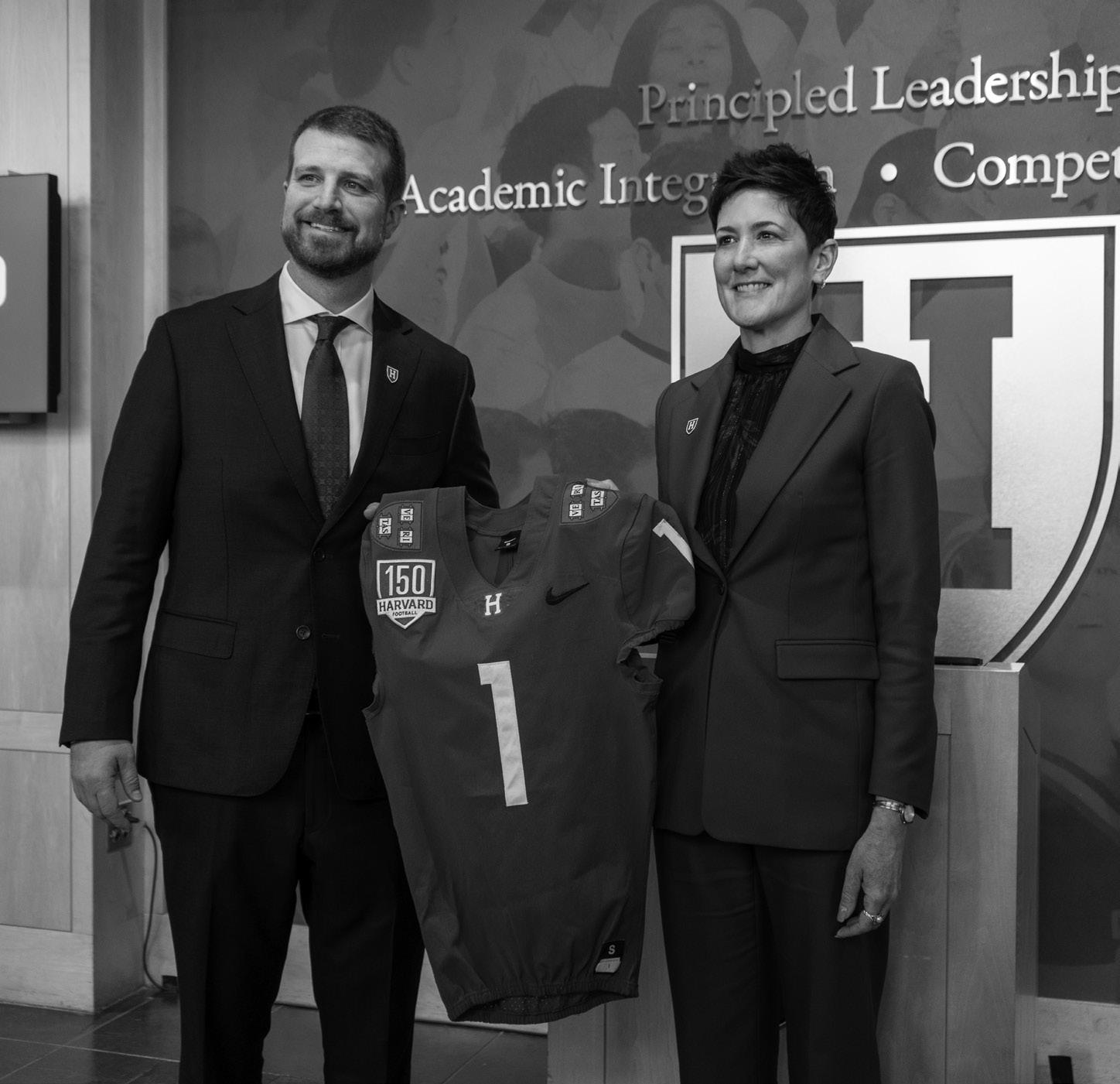
attack that ranked a paltry sixth in the Ivy League last year. Beyond Barkate, the other seven wide receivers combined for just 290 yards last year. Most of that total was accounted for by rising seniors Scott Woods II and Ledger Hatch, two speedsters who will look to make the most of their final season wearing crimson.
tor Mickey Fein, who will also serve as Assistant Coach for the first time, will have a wealth of options to choose from when it comes to distributing touches. The offensive lineman in Aurich will surely enjoy having rising senior Shane McLaughlin, the Ivy League rushing leader last year who averaged 5.4 yards a pop, for one season. McLaughlin will try this fall to solidify his place in a lineage of Crimson ball-carriers who dominated their competition as seniors, including Aidan Borguet ‘23 and Aaron Shampklin ‘21.
Through the air, the team will rely on rising junior wideout Cooper Barkate, who was the highest-ranked recruit in Harvard history when he committed in 2021 and who has just scratched the surface of his potential so far, to jumpstart a passing
Aurich stayed mum on whether the man to start under center will be Barkate’s roommate Jaden Craig, the rising junior who impressed in his three starts down the stretch last season, or senior Charles DePrima, who began last season as the starter but lost the coaching staff’s confidence after a three-pick effort at Princeton. Calling it a “really talented room” of signal-callers, the coach described both players as developing talents.
“Jaden had a lot of great things he did in the spring, and he has things that he needs to continue to work on,” Aurich said, referring to the junior’s performance in spring practices. “Just as Charles does as well.”
On defense, Aurich looked set to defer to Scott Larkee ‘99, who the new Head Coach called a “really, really good defensive coordinator” and who will take on the added title of Associate Head Coach this season. Larkee will need to replace standout starters along the defensive front — including graduating seniors Thor Griffith and team captain Nate Leskovec — to keep Harvard’s
traditionally-stout rush defense in shape. On the back end of the defense, Larkee will need to revamp a secondary that recorded the most interceptions in the conference but also allowed the most yards . Aurich will ask a lot of his players, as he has already preached a type of high-focus, high-effort style of practice that differs from the Murphy approach. If his mantra to players, that they should be “obsessed” with the football once they step on the field, seems intense, it is perhaps because Ivy League football has been his obsession for the past 20 years.
“I knew what I was working for,” said Aurich, looking back at his time at Rutgers. “I had an end goal to this whole thing. I wanted it and I got it at the best Ivy League school out there. So it worked out really well for me.”
When the season begins on Sept. 21 against Stetson and the Aurich era officially begins, Harvard fans will be eagerly watching. It could take time for the ex-Tiger to convince diehard Crimson fans that his heart lies in Cambridge, not New Jersey, but the hope is that his tenure will be long enough for the years he spent on the opposing sideline to fade distantly into memory. Aurich certainly seems confident.
“We’re gonna have a ton of success here.”
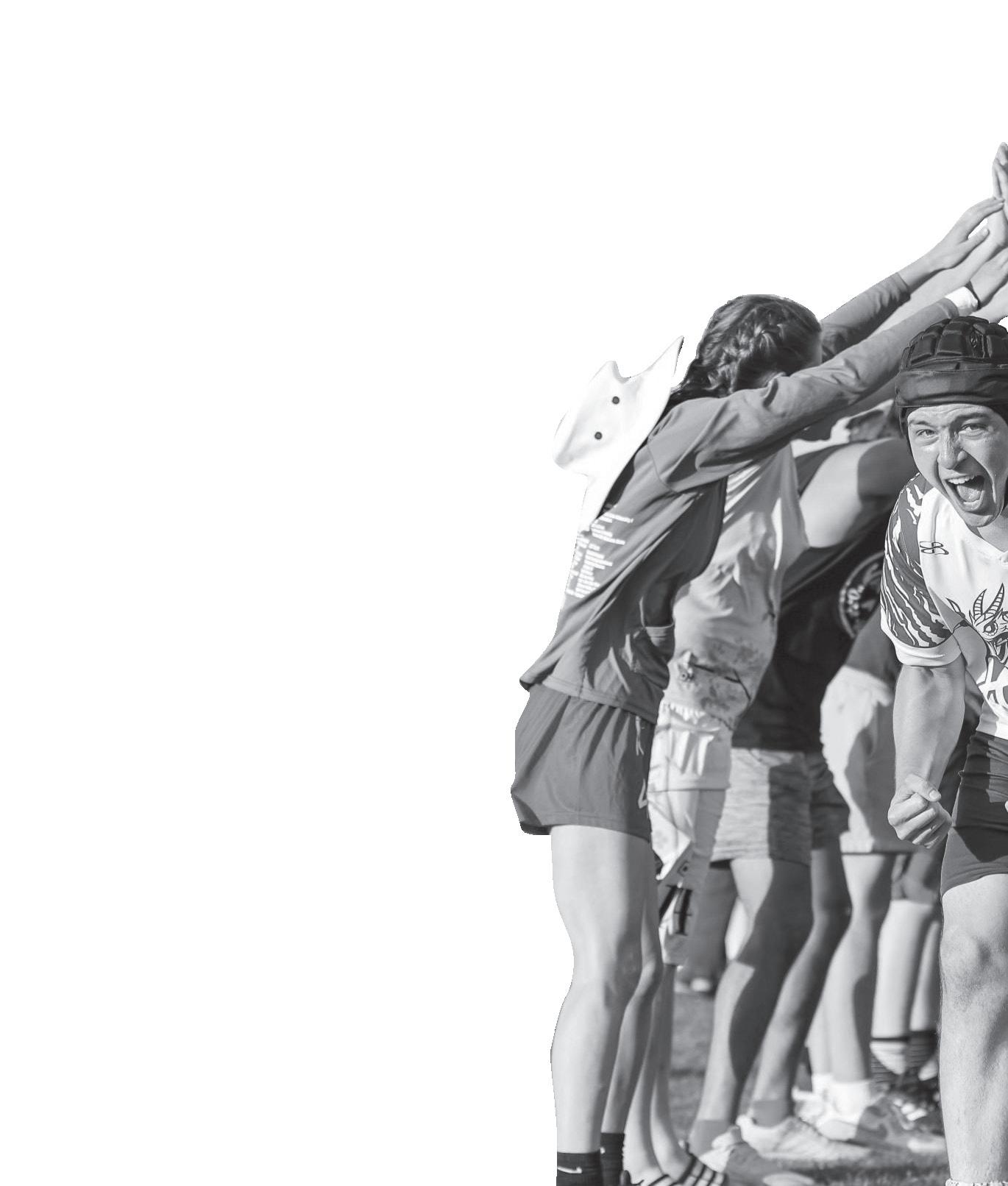
In late April, the Harvard Horntails, Harvard’s club quadball team, won the USQ Cup National Quadball Championship, finally breaking through after finishing as the national runners-up the year prior. This remarkable journey was one of redemption for the team, who returned in 2024 with renewed vigor after suffering a heartbreaking loss by a single goal in the 2023 national finals against the University of Texas at San Antonio (UTSA). In an intense rematch against the reigning champions, the Crimson emerged victorious by a narrow margin of 160-140, securing the coveted championship trophy.
Quadball, an offshoot of the fantastical game of quidditch that J.K. Rowling first introduced to the Muggle world in 1997, has existed at Harvard for the last 15 years, when the Harvard Quidditch Club was born in 2009. Even without the fictional glamor of flying equipment and magic spells, the reality of quadball is still chaotic in its own fashion. Three chasers and one keeper try to throw the quadball (née “quaffle”) through one of three hoops. Simultaneously, two beaters from each team lob dodgeballs at the other side, which can force an opposing player to return to their hoop and tag back in. The entire game is played with each player holding a PVC pipe — their broom — between their legs as they run around.
The Horntails’ journey to the pantheon of the quadball world didn’t happen overnight, but rather through relentless hard work, strategic adjustments, and perseverance.
“Last year, we came in second at the national tournament. Coming into this year, we really knew we had a shot to win it,” senior beater Jessica Lee said.
“We really went hard this year, practicing two to three times a week plus a film session to scout out our opponents.”
During the offseason, the Crimson focused heavily on recruitment and extensive practice, and with new additions to their team, things began to click.
“This year we found the perfect culmination,” Lee said. “We recruited really good players in Lance and Aiden Higgins that completed our roster. We also had players like Leo Freed and David Chen, who are both parts of the US national team squad. They are both seniors now and were the ones who built the team after the pandemic when a lot of the club sports had died off. They were the ones who revived the team and brought it back to its glory and we felt like we owed it to them to go out with a bang.”
This championship win was a redemption arc for Harvard, who had been runners-up not only in the 2023 USQ National Championship but also in the 2022-2023 Northeast Regional Championship, where it lost convincingly to Rutgers.
“Last year, we had the trifecta of second places.” junior Ian Palk said. “We got second place in our conference, second place in regional, and second place at nationals.”
Determined to change its fortunes, the Crimson returned to the regional tournament in 2024, where it edged out Rutgers in a nail-biting 145-120 victory to claim its first regional title in school history.
Its confidence bolstered, Harvard headed to the Blue Jay Cup at Creighton University in Nebraska, where it again avenged an earlier loss by defeating hosts Creighton by a single goal to secure another trophy. This consistent improvement gave it momentum heading into the 2024 USQ National
Championship, with all eyes set on the trophy.
“Coming into this season and during recruitment, we had the mentality that this year, we are going to win a national championship,” Palk said. “That was just kind of our motto throughout the season.”
Its final journey began with a dominant performance in pool play, where the team dismantled Creighton 18550, Illinois 160-70, and Sam Houston State 185-100, solidifying its spot in single elimination play.
In the quarterfinals, the Crimson overpowered Texas State with a commanding 21560 victory. Missouri was dispatched in the semifinals with similar ease, as Harvard cruised to a 165-70 win. It
set the stage for an epic showdown and rematch with UTSA in the championship game.
The Crimson entered the match firing on all cylinders, but also faced a key injury. Senior captain Jessica Lee was ruled out for the final after sustaining an injury in a prior match, delivering a
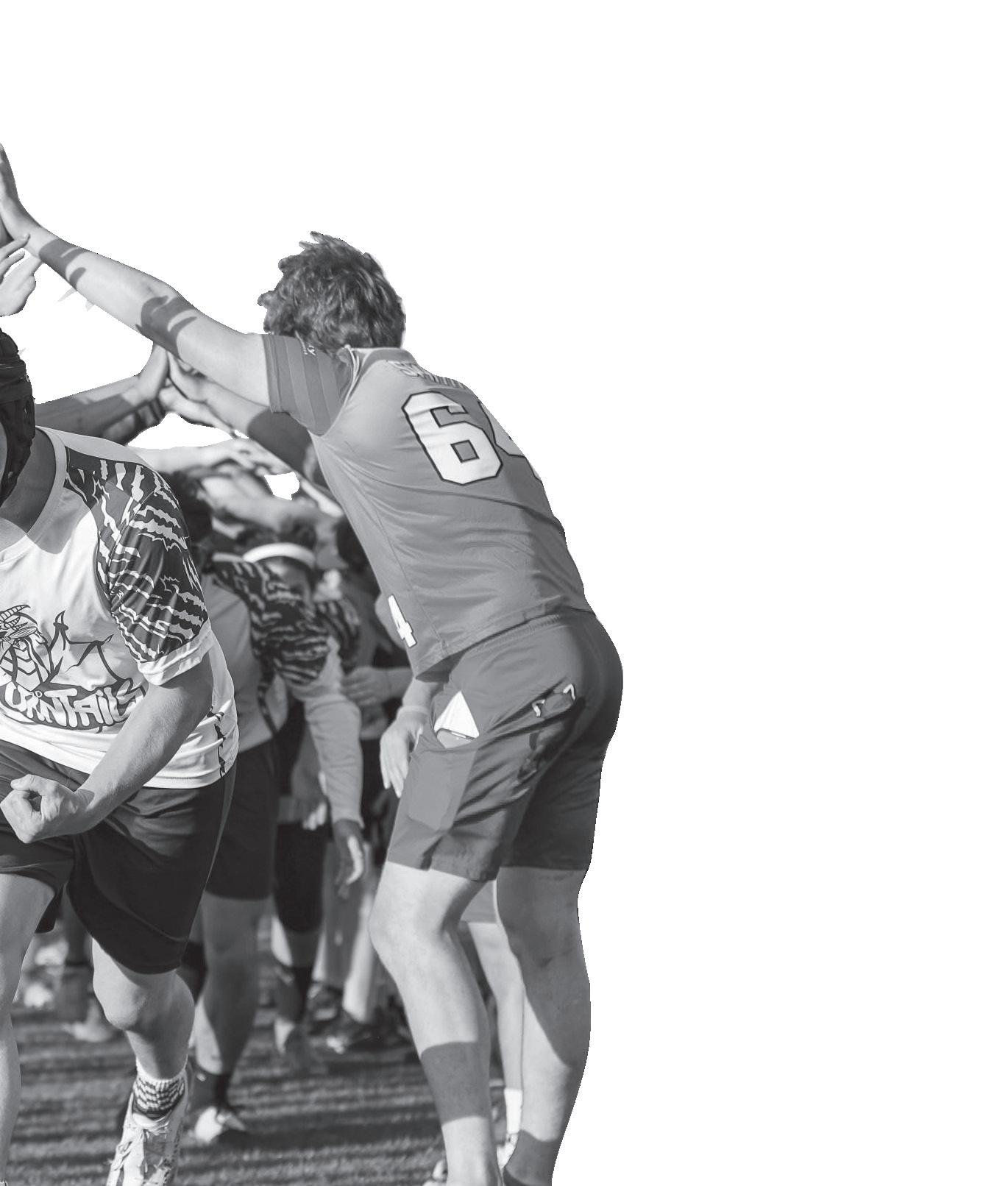
major blow to the Horntails roster.
“Going into the game, Jess was one of the best beaters on our team and she got hurt,” Palk said. “But we felt really confident in our depth.”
Harvard and UTSA went toeto-toe from the first whistle, with both teams trading scores early on. UTSA sought to establish dominance in the beater game, aiming to dis -
rupt Harvard’s offensive rhythm. However, the Horntails, led by seniors Daniel Gottesman and Felix Bulwa, along with standout sophomore Mac Mertens, swiftly adapted their passing plays and pressed forward.
“Throughout the game, it was pretty clear that we were overall the better team,” freshman Lance Bae said. “Everyone was involved with our plays. UTSA is more top heavy, where they have a few really good, star plays, and outside of that it’s a little shaky. The score doesn’t completely reflect that, as it was a much closer game than it seems or should have been.”
In the first half, the Crimson faced a number of challenges, including several penalties that hindered its ability to contain a strong UTSA offense and keep it from breaking away.
“We had put all that time and effort in and really felt we were the better team. The score was a lot closer than it should have been. We shot ourselves in the foot with penalties, which made the score a lot tighter but we really played like we were the better team. There’s a really funny picture of both of our beaters in the penalty box. Beaters are a really core part of defense, and without them it’s really tough to stop a lot of drives,” Palk said.
UTSA edged ahead early in the second half, leading by two goals as it exploited Harvard’s aggressive defense. But the Horntails rallied, tightening up its defensive strategy and finding ways to break through UTSA’s formations. By the 20-minute mark, the score stood at 120-110 in favor of the Crimson. However, the team had to deal with another quirk of the quadball style: halfway through the game, an official known as the “flag runner” or “snitch runner” enters the pitch. In true Harry Potter-esque fashion, a seeker from each team pursues the runner and attempts to
snatch the snitch, which is a ball attached to the runner’s back.
Unsurprisingly, the championship game turned as the snitch runner was released and the seekers joined the fray. Tension mounted with each passing second as both teams fought tooth and nail.
Ultimately, it was Gottesman who made the pivotal grab, catching the snitch and securing a 160-140 win for the Harvard Horntails. Pandemonium erupted on the field as players and coaches celebrated their well-deserved victory.
“When the snitch came out in the second half, we blew them away in terms of skill and performance,” Palk said. “Every part of our team really came together at that moment.”
This victory was the first national collegiate championship win in Harvard quadball history, and a historic one at that, as it was the first time there had been a rematch final in back-to-back years.
“This was the first time in US Quadball history that the college finals was a rematch between two teams. We lost to them by one goal, and this whole year we were thinking about that one goal and we would prepare for that moment. We did a lot of personalized scouting on them and knew what we were coming into,” Lee said, underscoring the chip that the team wore on its shoulder all year. “It felt great to win against them in the final.”
While this year’s victory marked a high point for the Crimson, the team now faces the challenge of sustaining success in the 2024-2025 season, as four of its six starters are set to graduate. However, this transition offers an opportunity for new players to step up and make an impact on the team.
“Losing Leo, Ana, David and Raina will be a big hit for the team, but I don’t think it’ll be a rebuilding season,” Palk said. “I think we absolutely have a shot to make a big run again. We’re gonna focus a lot on recruitment and hopefully this helps with that.”
With a solid coaching team and a culture of determination, teamwork, and skill, the Horntails aim to continue their dominance in collegiate quadball. As it prepares for next season, the program’s legacy will be built upon the foundation of the players’ unwavering spirit and resolve to remain champions.
“We had put all this time and effort in and we felt like we were the better team.
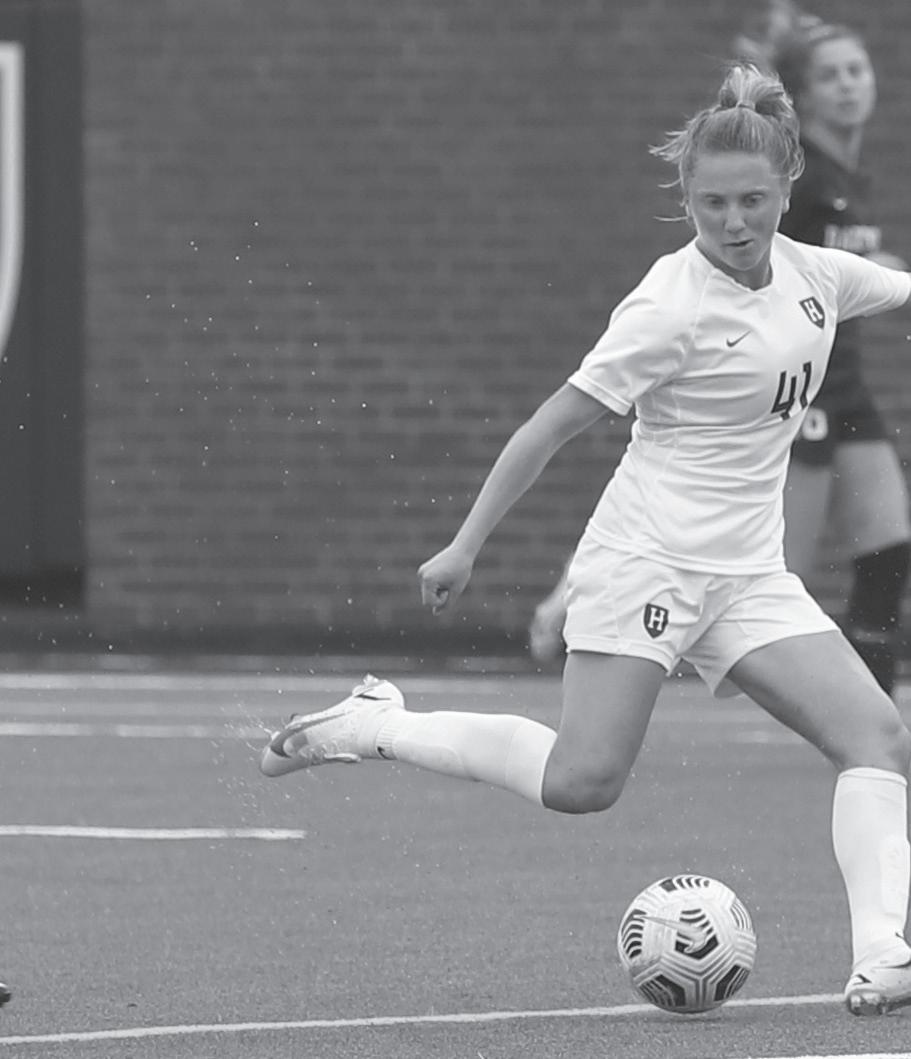
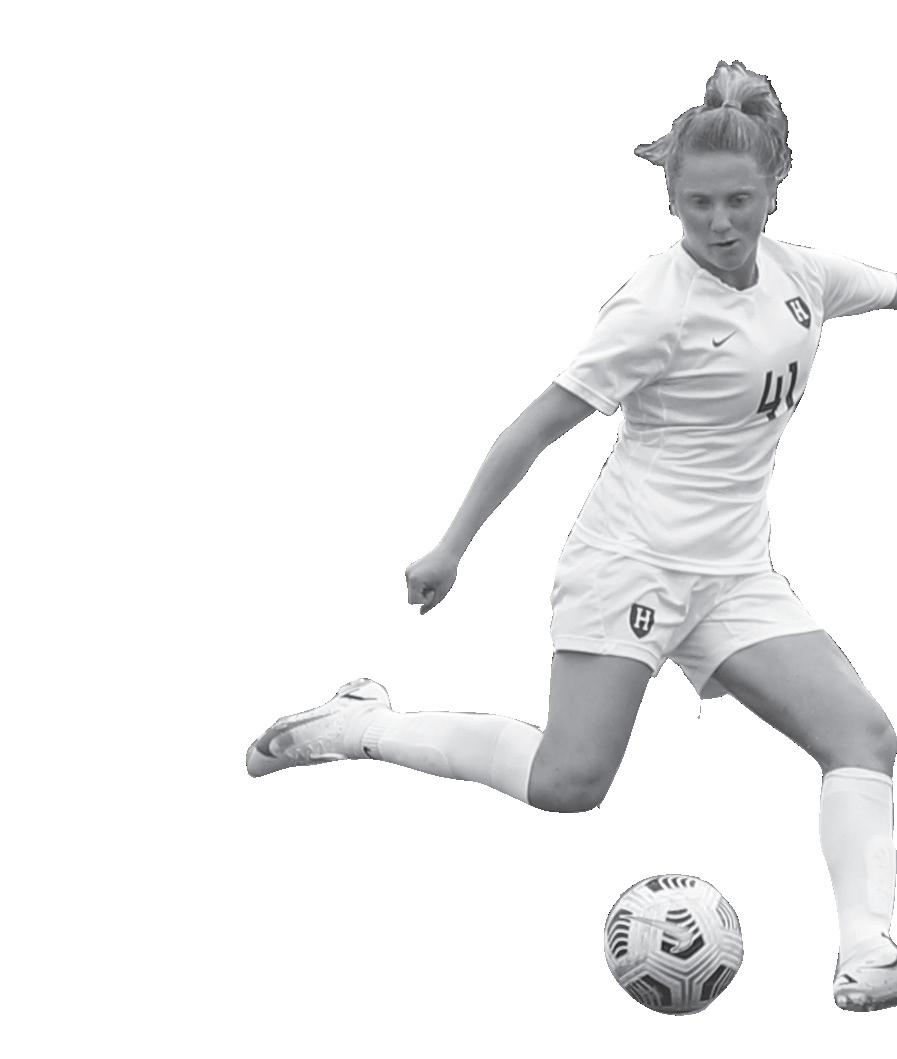
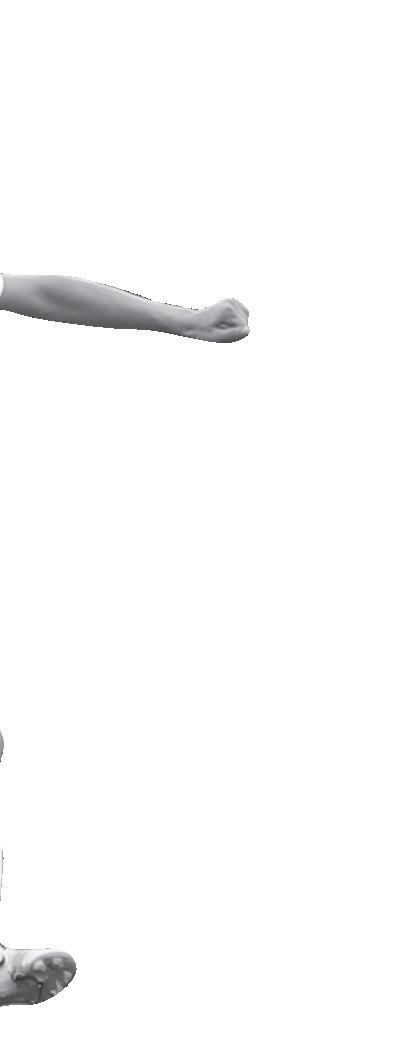
in their prohibition of athletic events. For Bebar, this was crushing, as she was itching to kick off her collegiate soccer career. In response to the pandemic closures, Bebar decided to take her freshman spring semester off to train and improve her soccer skills away from Cambridge. She spent the spring training with the women’s professional team in Chicago, the Red Stars, honing her skills for her eventual NCAA debut.
“My first season getting canceled may have been a blessing in disguise,” Bebar said. “I was able to train in a really, really great environment, and surround myself with professionals everyday. I wouldn’t have gotten that opportunity had I had a more traditional linear
For Bebar and the Harvard soccer team, the cancellation of the 2020 season posed an entirely new challenge. During preseason for the 2021 season, the coaching staff and upperclassmen had to work to orient the new players, who now made up more than half of their team, to the competitive expectations of college play. Despite the
bar, was determined to have an even more successful season in 2022. The following year, the Harvard team went 5-0-2 in the competitive Ivy League and 12-2-3 overall.
Bebar had a phenomenal season, despite it being cut short due to a knee injury. As one of only 15 players in the country to be named a MAC Hermann Trophy semi-finalist, she earned the title of College Soccer News second team All-American, first-team All-ECAC, and first-team All-American. Bebar also led the Crimson in points (20), assists (80), and shots on goal (24). The team continued its hot streak, seeing success in the postseason and earning a home field advantage in the first round of the NCAA tournament for the first time since 2014. After beating New Hampshire at home in the first round 2-0, the Crimson fell just short in the second round of the tournament against No. 13 University of South Carolina, 3-2.
In her junior season, her final season
I am so lucky to have gotten the chance to be a part of such an amazing team and program.
Hannah Bebar
Women’s Soccer Player and Crimson Sports Editor
adjustment, Bebar explained that her and her teammates were all incredibly grateful to be there and to have the opportunity to
“We just took everything in stride and did our best to embrace the moments,” Bebar stated. “We all came together to create a very great style of play and had a lot of
During her first season in a Crimson jersey, Bebar won Ivy League Rookie of the Year, was unanimously named as a firstteam All-Ivy honoree, and was also impressively ranked fifth nationally in assists per game (.67). Despite it being her first season playing collegiate soccer, Bebar led the Ivy League in assists (10) as well as shots on goal per game (2.07), helping to power the
After losing by one goal against Wake Forest in the first round of the NCAA tournament in 2021, the Crimson, led by Be -
with Ivy League eligibility due to her gap year, Bebar and the Crimson truly excelled. The Harvard team recorded an impressive 13-4-2 season overall. The Crimson won the Inaugural Ivy League Tournament, claiming dominant victories over both Princeton and Columbia. The team continued its success in the NCAA postseason, securing the home field advantage for the first round in the tournament against the University of Maine. Unfortunately, in a contest that would mirror the team’s 2022 endeavor, the team made it to the second round but lost a close 1-0 battle against Michigan State to end its season.
Throughout that season, Bebar carried on her impressive streak of accolades, earning first-team All-Ivy League, United Soccer Coaches Second Team All-East Region, CSC Academic All-District, and a spot on the MAC Hermann Trophy Watch List. Bebar started and played in all 19 games
during her final season with the Crimson. She concluded her Harvard career ranked 11th in program history with 59 points, an especially impressive accomplishment given that her truncated career played out over only three seasons.
“It was a huge thing for us just to be able to compete on a higher stage and bring this program to a point where that should be the standard,” Bebar said as she reflected on her and her teammates’ impact on the Harvard soccer program. “I have loved my time here, I’ve loved playing, and I am so lucky to have gotten the chance to be a part of such an amazing team and program.”
Bebar attributes her and her teams’ success to the camaraderie shared between all of her teammates. She explained how the graduating captains Anna Karpenko and Ava Lung truly cared about every aspect of each girl on the team, and praised incoming 2024 season captains Jade Rose, Josefine Hasbo, and Sydney Farnham for their leadership skills. (Bebar and Farnham are both Crimson Sports Editors).
“How grateful I am to Harvard soccer, especially to the girls on the team,” said Bebar, about her parting message to the program. “They have been such a great group of players, and more importantly a great group of humans and people.”
Bebar will now head to Durham, N.C., where she will play her final season of eligibility for the Blue Devils. Duke is picking up six new transfer players, including Bebar, recruited by Head Coach Robbie Church. The Blue Devils play in the competitive Atlantic Coast Conference, which boasts several high-achieving women’s soccer programs, including No. 1 Florida State and No. 3 Clemson. Up against these powerhouses, Duke struggled last season, notching an overall record of 6-7-3. The team will benefit greatly from the influx of new talent, headlined by Bebar.
Fans who followed Bebar’s illustrious Crimson career can watch her take the field for Duke in its opening game against Ohio State on August 15, where she will start the next chapter of her inspiring soccer journey.
As spring turns to summer, there is a growing level of excitement for the 2024 Paris Olympics. This year, Harvard is sending 15 athletes to the games from six different sports. The fencing team is
sending a historic eight athletes to compete: two undergraduates, two incoming freshmen, and four alumni. The entire Team USA men’s saber squad is made up of Crimson athletes. Harvard is also sending five staff members to the event, including Head Coach and 2007 NCAA champion Daria Schneider. Schneider will be on Team USA, along with seven of the eight fencers, and four of the five staff.
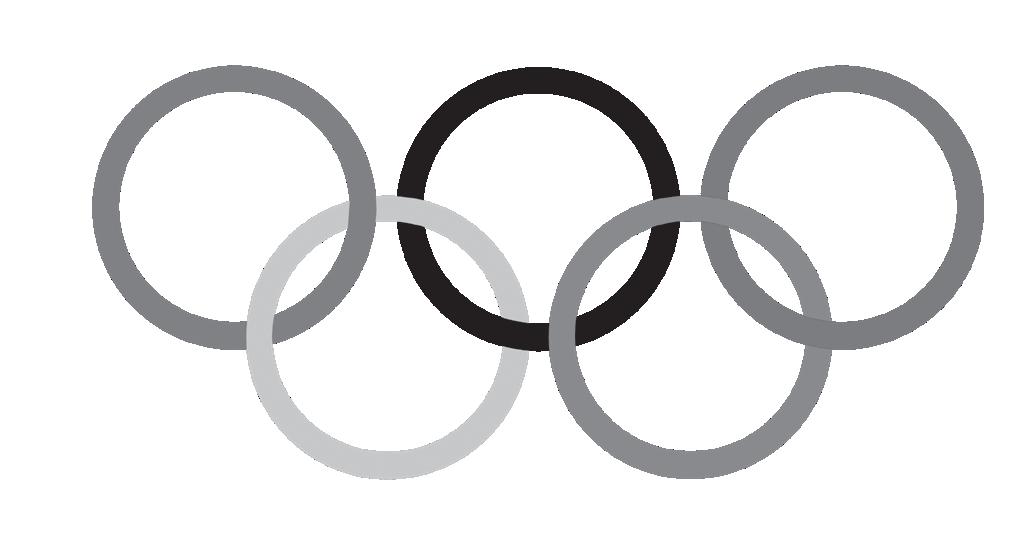
Harvard is also sending six athletes to row in the Seine, five men and one woman, all alumni. Men’s heavyweight assistant coach Tom Siddall will join the rowers in Paris. For many of these rowers, the journey to Paris won’t be their maiden Olympic voyage, with several having rowed in Tokyo. Likewise, although most Harvard Olympians are competing for Team USA, Sophia Montgomery,
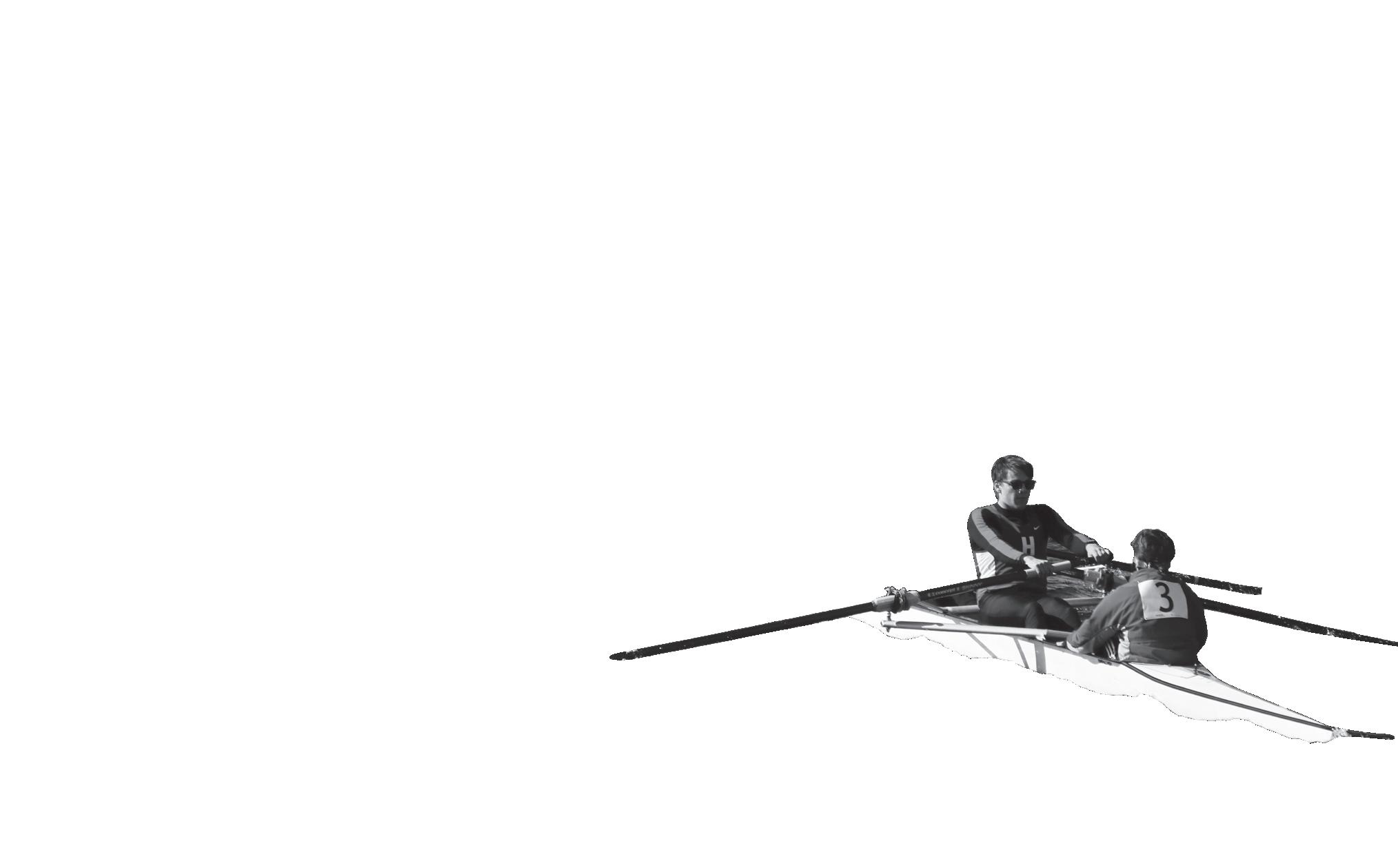
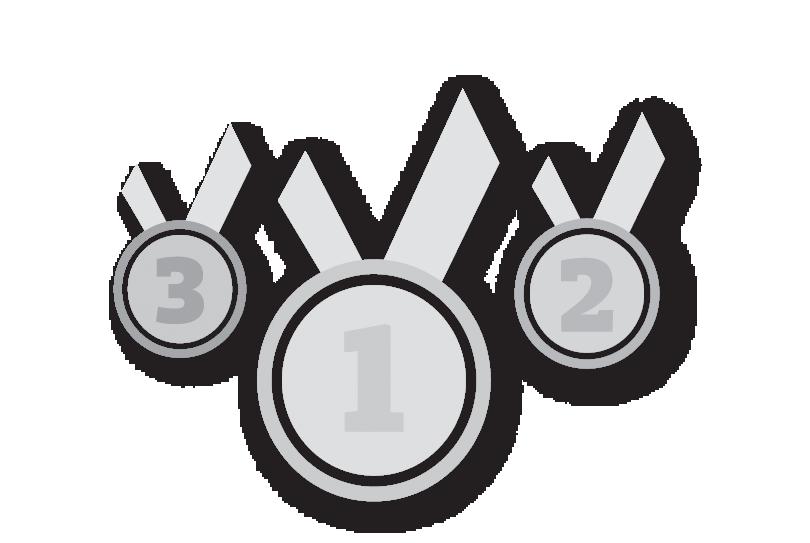
Won gold in the eight boat at the 2018 World Rowing Championships
Won bronze in the eight boat at the 2019 World Rowing Championships
Won silver in the eight boat at the 2019 World Rowing Cup II
Finished fourth in the eight boat at the 2020 Olympic Games in Tokyo
a rising junior sailor, is representing her home country of Thailand. She will be come just the second Harvard Olympian to hold up the Thai banner at the games. Harvard’s Olympians are highly ac complished, as is evident below. But in their quest for the podium, they are seek ing the ultimate prize: Olympic gold.
thomas.harris@thecrimson.com
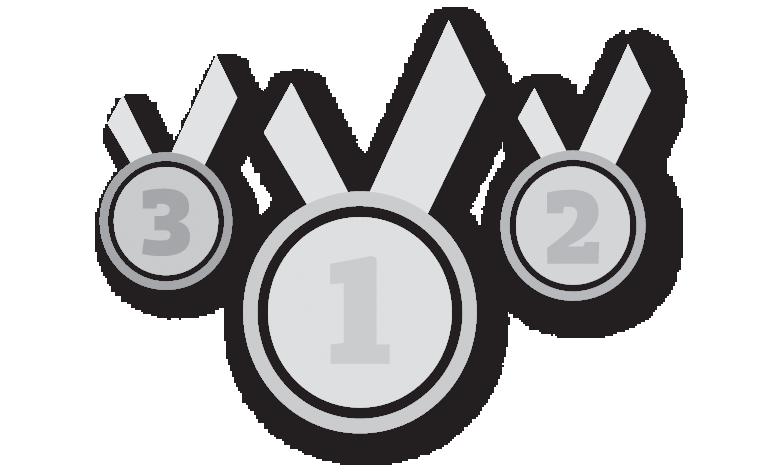
Won bronze in the Harvard varsity eight boat at the 2017 IRA National Championships
Placed fourth in the eight boat at the 2020 Olympic Games in Tokyo
Won silver in the four boat at the 2023 World Rowing Championships
Won bronze in the four boat at the 2023 World Rowing Cup II
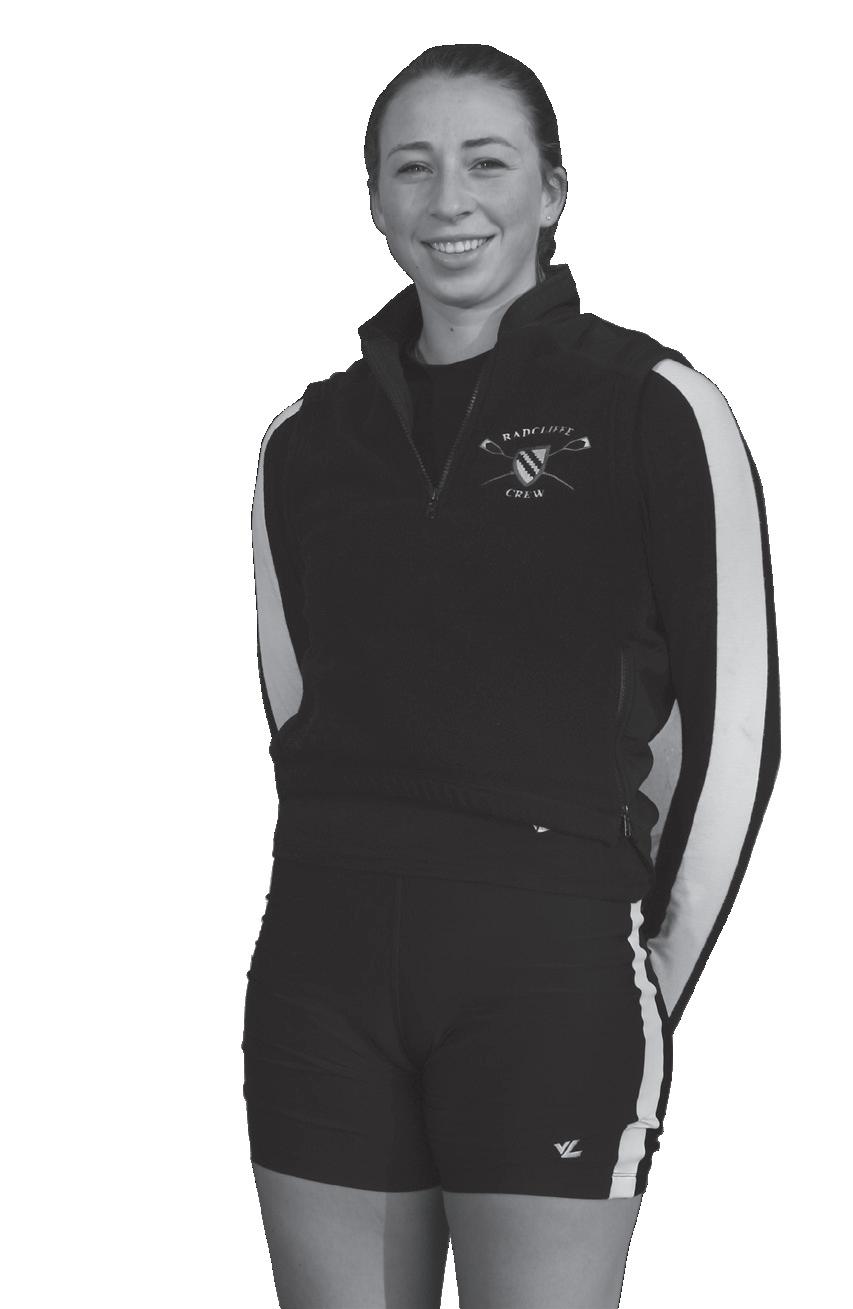

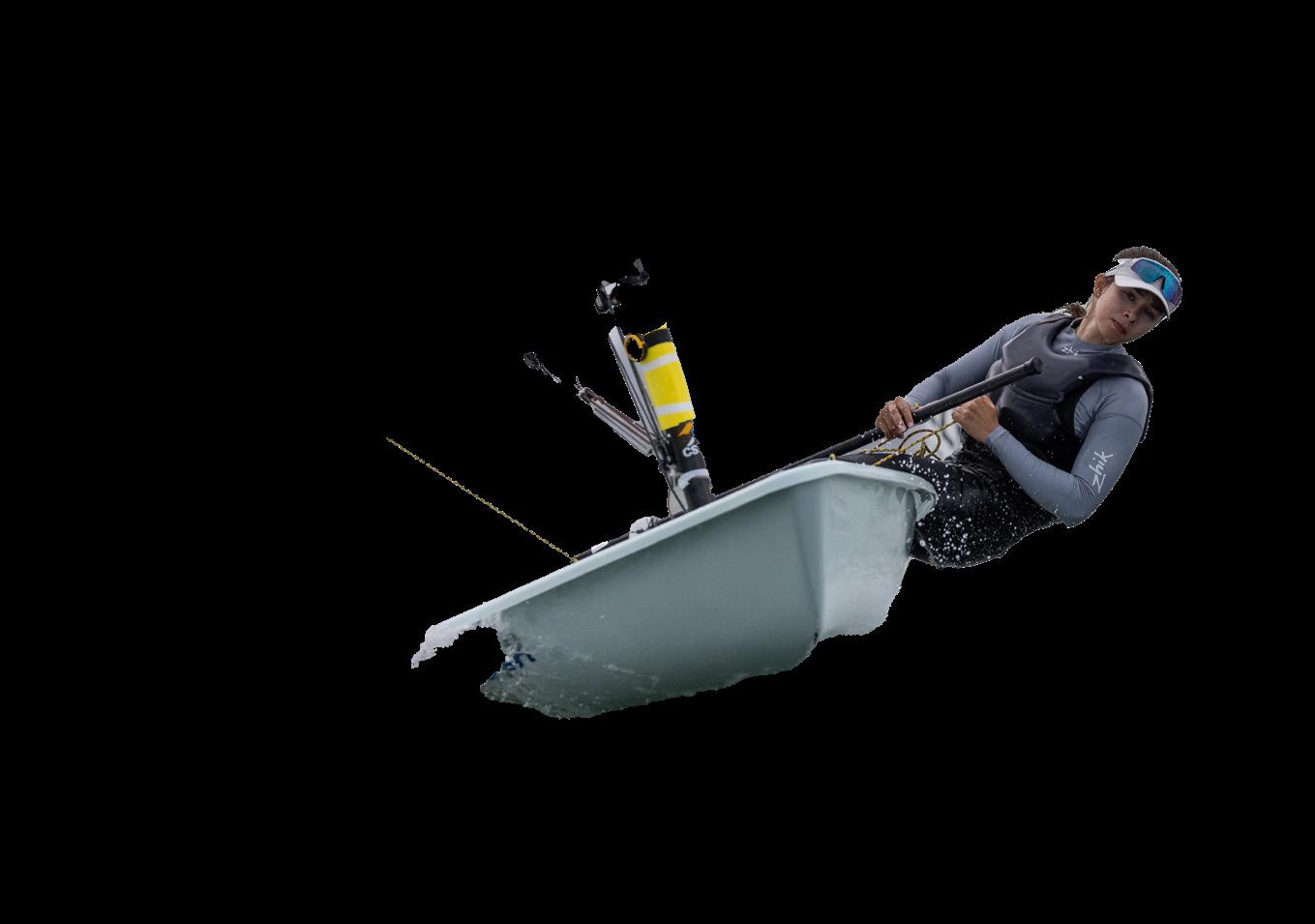
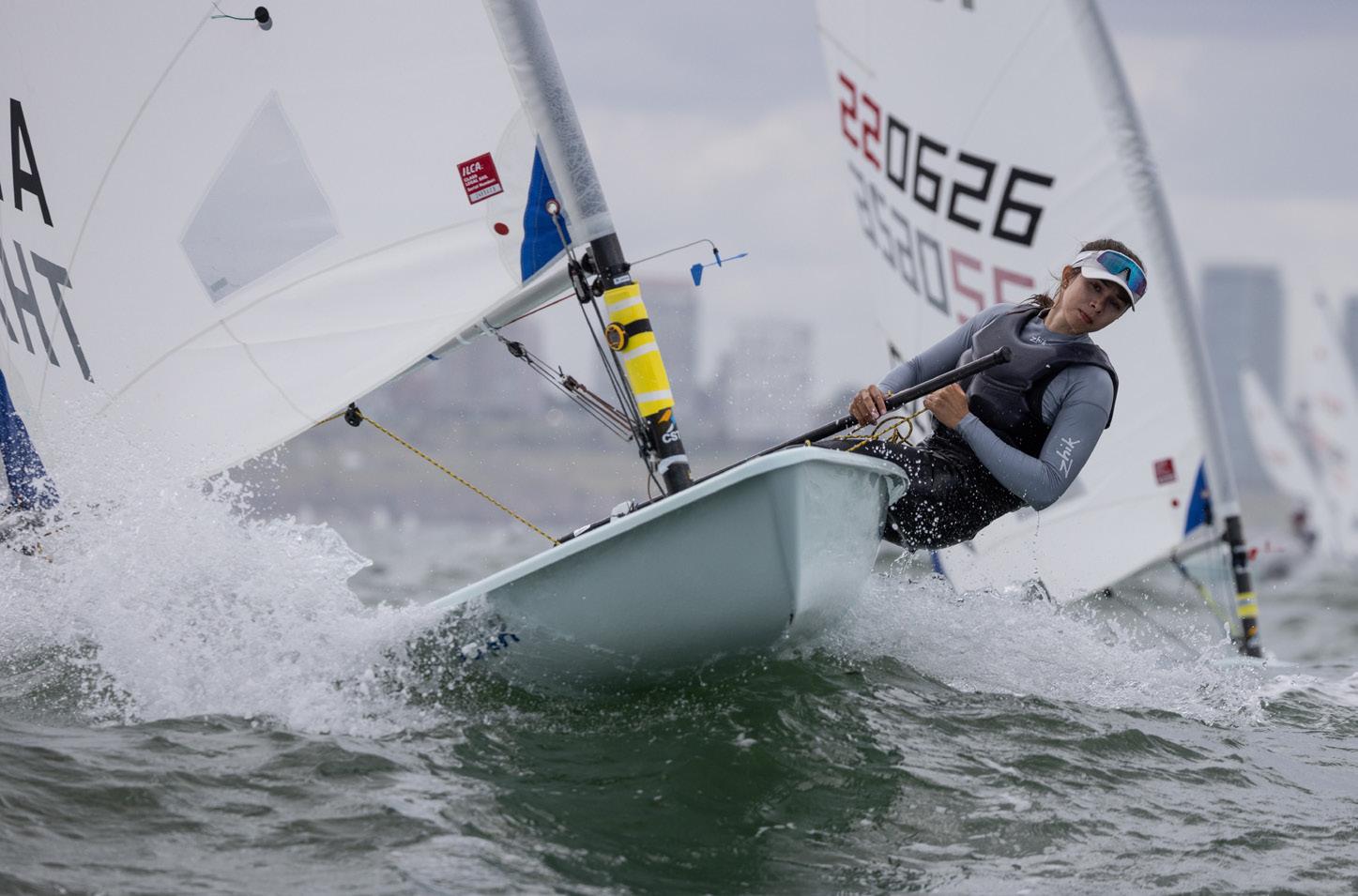
Placed fourth at the 2023 ASAF Asian Sailing Championships
Won the 2022 ICSA College Sailing National Championship

Two-time NEISA Women’s Sailor of the Week in 2022
Placed second at the 2021 NEISA Women’s Singlehanded Championship
Placed fourth at the 2021 ICSA College Sailing National Championship

Placed second at the 2024 NCAA Women’s Foil Championships
Won the 2023 NCAA Women’s Foil Championships
Placed seventh at the 2022 NCAA Women’s Foil Championships
Won silver at the 2021 Junior World Fencing Championships
Won gold at the 2020 Junior World Cup
Won gold at the 2019 Junior World Fencing Championships
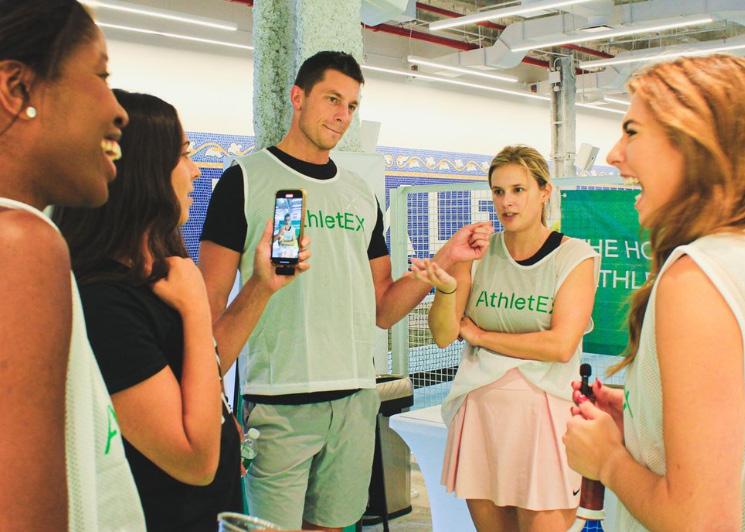
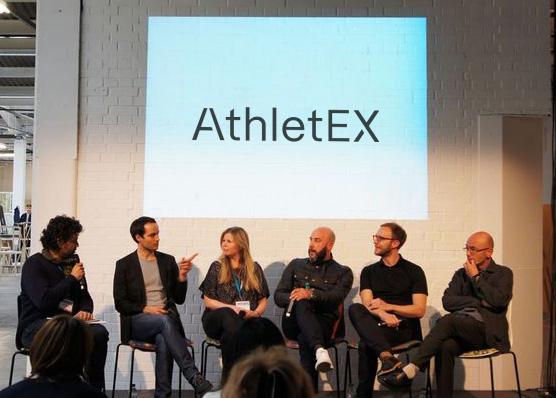
WE’VE MADE IT EASY TO MEET PEOPLE WHO JUST GET IT. EXPLORE YOUR NEW TEAM WITH ATHLETEX.



Engage and connect through local happy hours, professional workshops, wellness retreats, and more. Build meaningful relationships in your new city.
Stay active and competitive with sports leagues and fitness challenges that keep the spirit of teamwork alive.
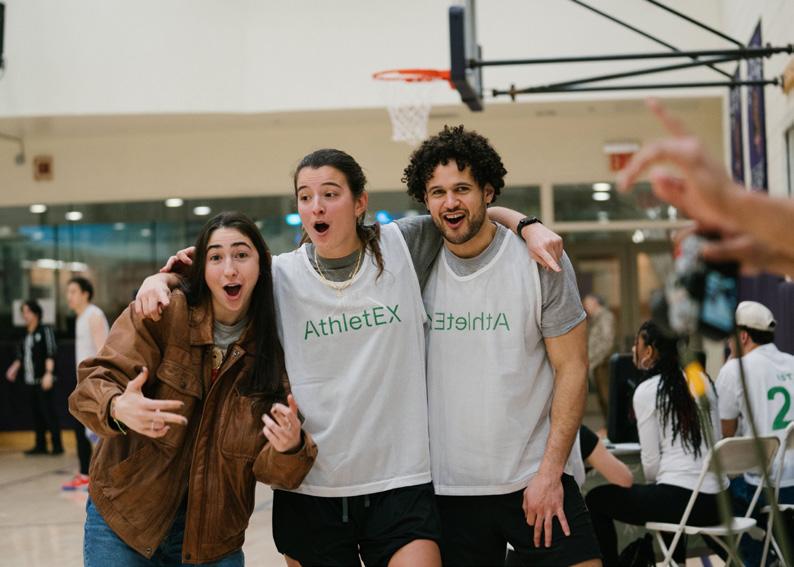
Access a comprehensive suite of resources designed to smooth your transition from collegiate athlete to successful professional.
